Decisions
We need more than a vacation
Table Talk with Drake Caudill P. 15



Team reporting from the Southern Baptist Convention 2022 Annual Meeting
Starting on page 5
REFORM: 288-page report on abuse presented; predators are ‘put on notice’
ELECTIONS: ‘Folksy’ pastor tapped as SBC president; new guard at Executive Committee

in focus
Messengers take action on sexual abuse reform. Now comes the difficult part—implementation.
ISSUE: Floor debate over women in pastoral roles; ERLC survives defunding motion

MISSIONS: Candidate pipeline improves; Sandy Wisdom Martin encourages convention with Illinois story

INSIDE: 9 pages of in-depth coverage from Anaheim
Post-Roe vs. post-abortion
Baptists have a larger goal in mind

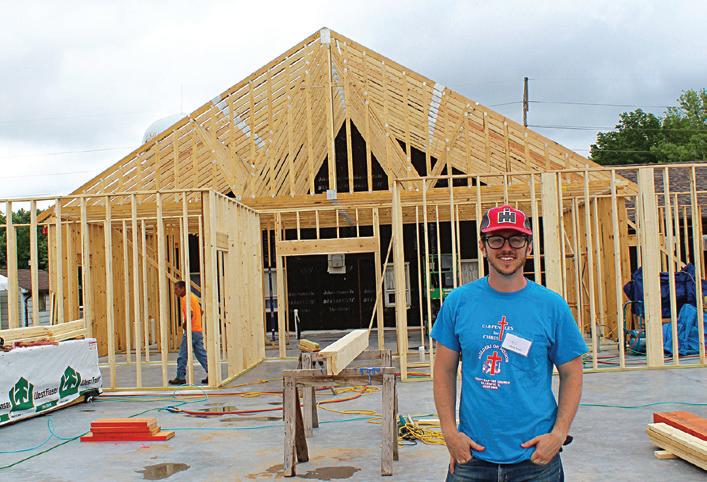 BY LISA MISNER
BY LISA MISNER
As they gathered for the 2022 SBC Annual Meeting in Anaheim, California, messengers anticipated release of a U.S. Supreme Court opinion that might overturn the 1973 decision legalizing abortion in all 50 states. They prayed about it. They hoped it might even come during the convention.
But what was made clear in the convention is that abortion will not end with the end of Roe v. Wade. And Southern Baptists are
not of one mind on how to prevent the death of up to three-quarters of a million unborn babies each year.
“Laws are critical, but it will not change the fact that it’s critical that we inspire a new generation of women so they see abortion as unnecessary,” Brent Leatherwood reported to messengers. The acting president of the Ethics and Religious Liberty Commission (ERLC) reminded them that overturning Roe would simply move the battle to state legislatures. Leatherwood’s comments met objections from the floor.
Many who found the ERLC’s language about “necessity” objectionable are part of a movement that calls for the Convention to support the total and immediate cessation of abortion, and

The Illinois Baptist staff
Editor - Eric Reed

Graphic Designer - Kris Kell
Contributing Editor - Lisa Misner
Copy Editor - Leah Honnen
Team Leader - Ben Jones
The general telephone number for IBSA is (217) 786-2600. For questions about subscriptions, articles, or upcoming events, contact the Illinois Baptist at (217) 391-3127 or IllinoisBaptist@IBSA.org
The Illinois Baptist is seeking news from IBSA churches. E-mail us at IllinoisBaptist@IBSA.org to tell us about special events and new ministry staff.

POSTMASTER: The Illinois Baptist is owned and published every month by the Illinois Baptist State Association, 3085 Stevenson Drive, Springfield, Illinois 62703-4440. Subscriptions are free to Illinois Baptists. Subscribe online at IBSA.org.
The BIG Baptist family album
Our Illinois mission field
Jacob Goble and his wife, Makenzie, are planting Rooted Community Church in Lebanon, a town of 4,500 near metro St. Louis and home to McKendree University. Aware that most students will not stay after college, the Gobles desire to invite students in, share the gospel, make them part of a healthy, multiplying church, and send them out to places the planters may never see.

Pray the news: Pro-life churches

As new opportunities emerge for life-affirming ministries, pray for your church and other Illinois Baptist churches to begin new outreach to young women in crisis pregnancies. And pray for those who have experienced pain and loss after abortion.
Cooperative Program at work
“It’s our first week with our GenSend summer missionaries,” reported Gospelife Church in Carol Stream in early June. “Say hello to the college students... Will, Anya, Paul, and Kyle.” GenSend is a ministry of the North American Mission Board that sends young adults to cities to aid with short-term survey work and church planting.
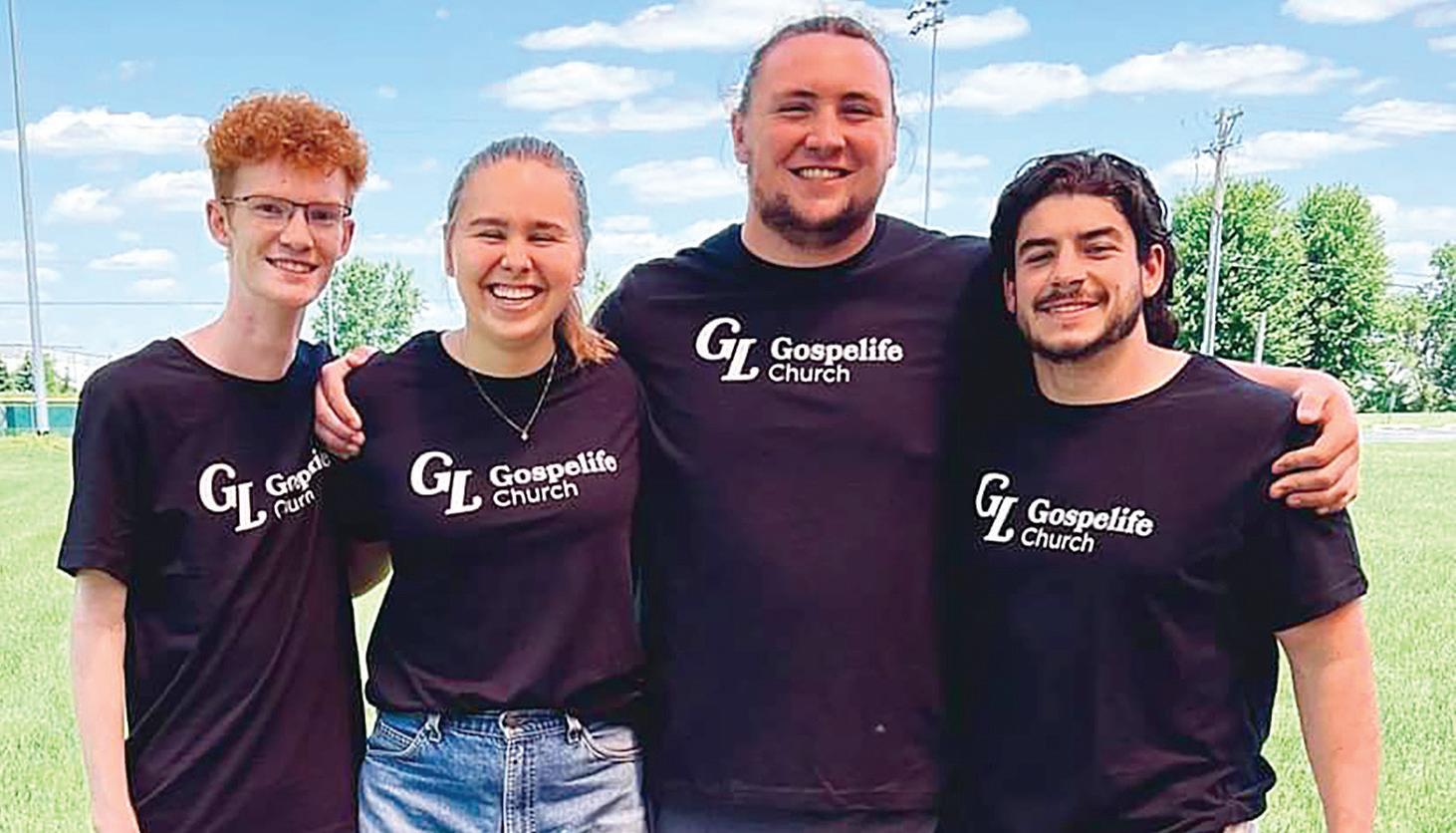
Giving by IBSA churches as of 06/21/22
$2,421,334
Budget Goal: $2,861,544
Received to date in 2021: $2,720,125
2022Goal: $6.2 Million
NATE ADAMSLamenting and learning
In the period between release of the third-party investigation of the SBC Executive Committee’s handling of sexual abuse claims in the denomination and the SBC Annual Meeting where messengers acted on recommendations for reform, several things became clear.
Everyone has an opinion on the report and its findings. Not everyone who has commented has read the report. At 288 pages, the Guidepost Solutions report is not a quick read. But I would urge Baptist pastors, church members, and other concerned parties to read the primary sources of information, in order to fully understand the facts and consider relevant actions that all of us can take to prevent sexual abuse and to minister to survivors and their families.
It’s also clear that more than one response is needed because of the various people and groups affected by abuse and responsible for action. As a leader in a Baptist network, I want to speak a brief word to three specific groups:
First, let me speak to survivors of sexual abuse. While only God can heal the deep hurt you have experienced, please know that many more of us have now entered into your ongoing pain. I hope you can read in the report and in the many responses since then the grief and the lament over sexual abuse, and the angry outcry of God’s people when it is exposed in the context of a trusting church relationship.
You may well have felt alone and abandoned during the abuse you experienced, and perhaps doubly so when some you trusted with the information did not really help. But the call for this investigation and the demands for change since then demonstrate that God’s faithful people desire transparency, and justice, and defense of the powerless.
3 views on abuse response
Second, let me speak to pastors and church leaders. This report urges each and every church to compassionately listen and minister to abuse survivors, and to proactively ensure that its leaders and ministries are safeguarded. Frankly, when abuse is reported in a church setting, churches often need to be quicker to rely on law enforcement and other professionals and not assume their own competence in this area.
Though the instances of abuse as a percentage of the number of churches and years may not seem large, they are also undoubtedly underreported. No church should assume “it can’t happen here.” Each church should have vigilant policies and practices that protect the vulnerable from predators, and that protect its leaders from even the appearance of impropriety.
Finally, let me speak to networks of churches and their leaders, and in doing so I am speaking to myself. While the church may be on the front line of abuse prevention, and while Baptist church autonomy may sometimes limit network influence or even awareness, church networks still bear responsibilities in this area.
Training and consulting in prevention is certainly an important role. Helping churches identify qualified counselors may increasingly be another. And we must somehow find more effective and comprehensive ways for churches to share information about offenders who may seek to move from one church setting to another, or one network to another.

Here in Illinois, our network leaders and staff are prayerfully studying the recommendations of the task force report and the actions of messengers in Anaheim. We are reexamining our training and systems and the prevalent practices in churches to ensure we are doing everything we can to make sure that churches remain the safe haven of trust, healing, and hope that our broken world needs.
Nate Adams is executive director of the Illinois Baptist State Association. Respond at IllinoisBaptist@IBSA.org.
Continued from page 1 pro-life
IFI petitions state for more security
Springfield | Illinois Family Institute (IFI) petitioned Gov. J.B. Pritzker to increase security for pro-life groups and crisis pregnancy centers ahead of the anticipated release of a U.S. Supreme Court decision that could overturn Roe v. Wade, the 1973 decision that legalized abortion. The June 9 letter pointed out attacks on pro-life advocates after a draft of the Court’s ruling in Dobbs v. Jackson Women’s Health was leaked in May.
“We cannot afford to ignore the threats of violence and harassment to achieve political ends,” said IFI Executive Director David Smith. “It is wise to anticipate more violent reactions from fringe pro-abortion activists if and when the U.S. Supreme Court hands down its decision in the Dobbs case.”
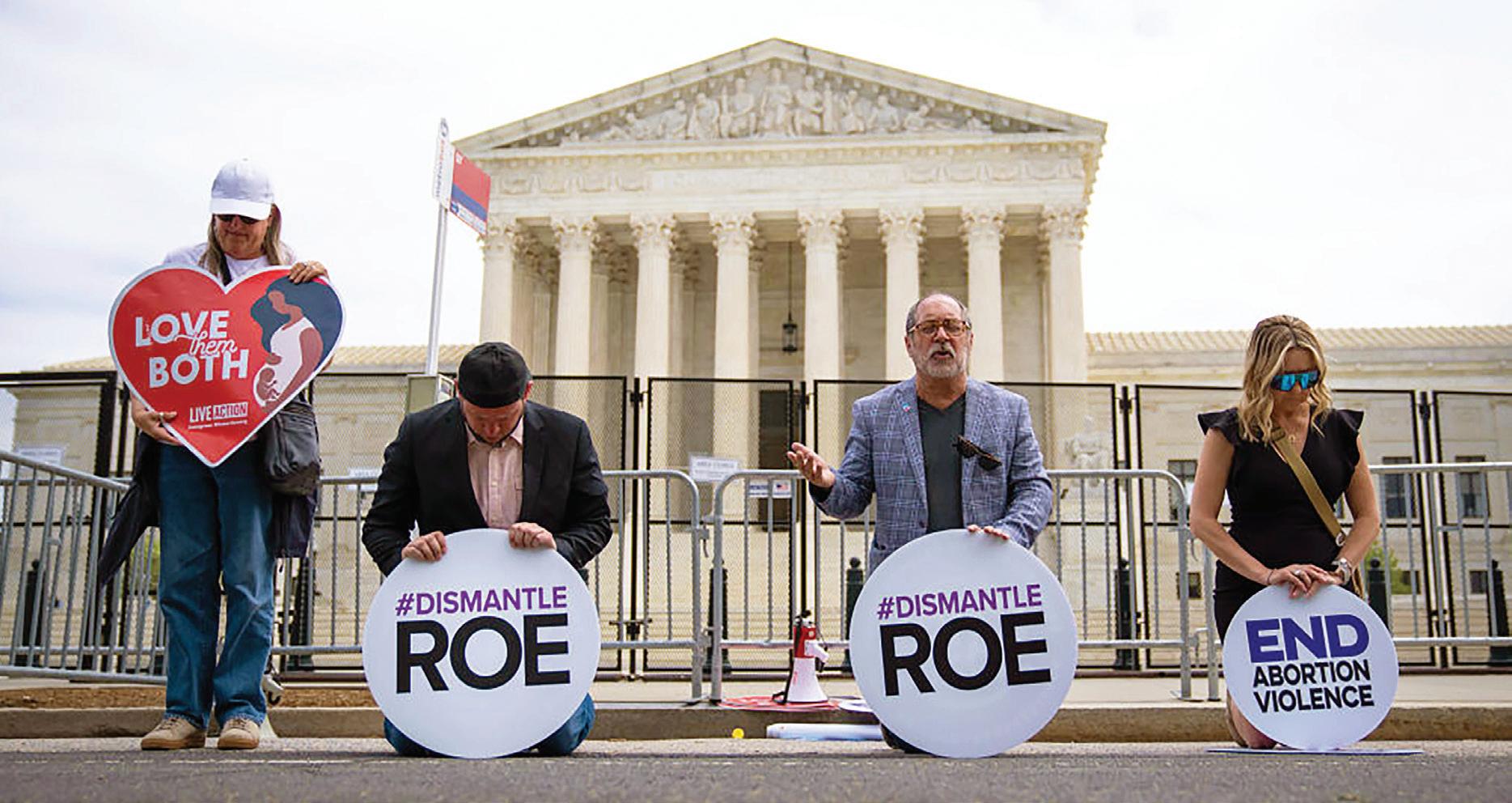
Smith asked Pritzker and Illinois Attorney General Kwame Raoul to offer more protection, noting that abortion facilities already have such a zone around them.
Five Catholic churches, two crisis pregnancy centers, and three pro-life headquarters were vandalized in the week after the draft ruling was leaked. The acts of vandalism, mostly spray painting and broken windows, were reported in six states. In the Midwest, a Catholic church in Armada, Michigan, was marked with graffiti, and the Wisconsin Family Action office in Madison was damaged by small firebombs.
abandon any support of incrementalism. Both seek an end to abortion, but incrementalism would accept a step-by-step progression, such as the 15-week “heartbeat” bills, and take legal victories wherever possible.
At the 2021 convention in Nashville, messengers passed a resolution in support of abolition. However, in that same meeting messengers rejected an amendment to a different resolution which would have asked lawmakers to punish women who have an abortion. Since then, many have spoken in opposition to the abolitionist resolution, when laws in such pro-abortion states as Illinois leave little room for anything but incrementalism.
Leatherwood is one of them. “You’re not going to get me to say we should put mothers behind bars,” he said of the view that women who have abortions should be treated as murderers.
The use of the term “necessary” angered some messengers who lined up at microphones on the convention floor to question its use by the ERLC: “Making abortion unnecessary.” Leatherwood said he understood they were upset and explained the terminology was chosen because “Planned Parenthood has been using it for 50 years…. Because so many see abortion as necessary,” he said, “we speak their language to them.”
Leatherwood stressed, “We use ‘illegal’ because it should be illegal to take the life of a preborn child. We use the word ‘unnecessary’ because the word speaks to mothers right where they are. We use ‘unthinkable’ because that is what abortion should be.”
Southern Seminary President Albert Mohler lent his support to the abolitionist view at the
annual meeting when he said, “A woman who seeks an abortion, looks up how to get an abortion, takes herself to an abortion provider and simply demands an abortion…she should be held as complicit in either the death of her unborn child or the effort to secure such a death.” He then made allowances for the reality of it happening by mentioning pro-abortion states like Illinois, New York, and California by name.
In May, Leatherwood, along with 80 other prolife leaders, signed onto a National Right to Life letter stating women are victims of abortion and called for them to be treated with compassion. The letter was in opposition to a proposed Louisiana state law that would have made abortion a criminally homicidal prosecutable offence. His action was met with calls by some for him to resign due to the abolitionist resolution passed at last year’s annual meeting. However as justification, Leatherwood cited the failed amendment calling for criminal prosecution.
Ending Roe or ending abortion?
While some abolitionists want to imprison women who seek to or have an abortion, advocates of incrementalism stress love. The ERLC’s Elizabeth Graham called on churches to “love these women, support them, value them, and let them know of God’s love for them.”
“We want the church to be the first place that a woman goes, not a place of condemnation,” urged Graham, vice president of Operations and Life Initiatives. “We must reach these women where they are, which is often complicated, messy, and dire.”
Kevin Smith, vice chair of the ERLC trustees, addressed why he believes it’s vital for churches “to be concerned what an abortion-minded woman and man think in our local community.”
Smith asked messengers to reflect on the contrasts in Luke 15:1-2 between the tax collectors and sinners gathered around Jesus, and the scribes and Pharisees who muttered about the company he kept. When ministering to women seeking an abortion or who’ve had one, Smith said, “Do we come in like Jesus, who said come to me you who are heavy burdened, and I’ll give you rest? Or do we come to them like the Pharisees and scribes murmuring?”
How do Southern Baptists accomplish the end of abortion in the U.S.? “Make abortion illegal, unthinkable, and unnecessary,” Graham said repeating the controversial refrain.

Ultimately for those of both approaches, the final goal is the same. “For nearly 40 years Southern Baptist churches have made supporting life a policy. Overturning Roe should not be the end,” Leatherwood said. “We should not be satisfied with a post-Roe world. We are striving for a post-abortion world.”
Follow the latest Illinois Baptist news




IBSA camps
Busy, busy season
Opening day is special—not just in the Major Leagues, but at IBSA camps too. The Baptist camps at Streator and Lake Sallateeska marked the start of summer with an opening to make their communities and nearby churches welcome on the grounds.



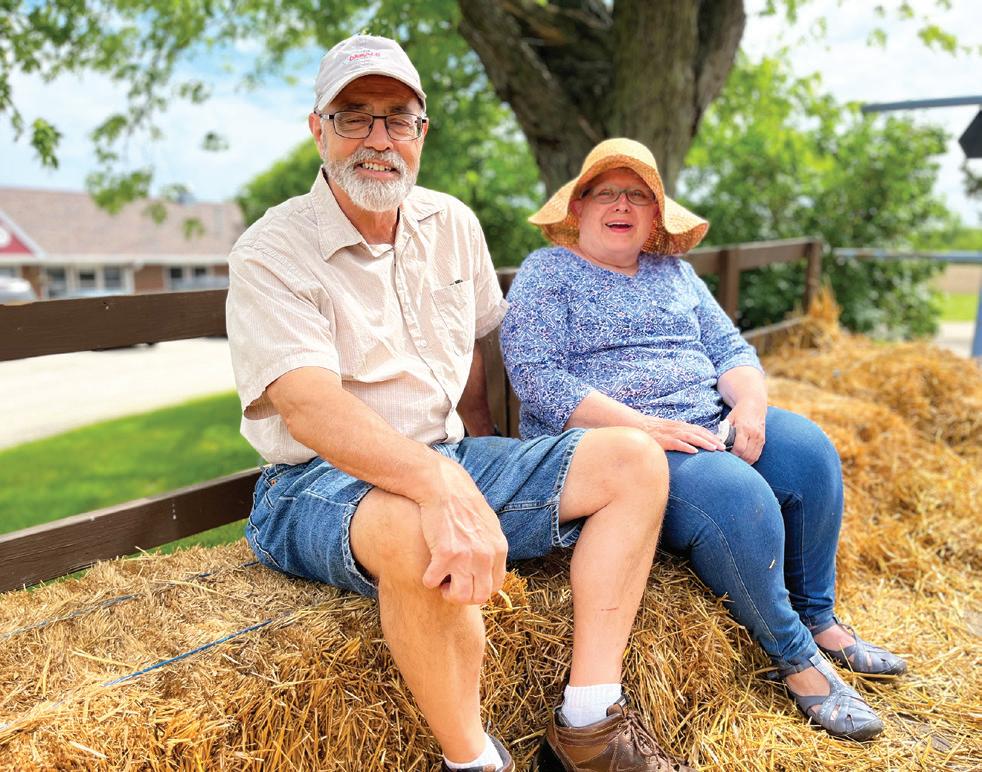

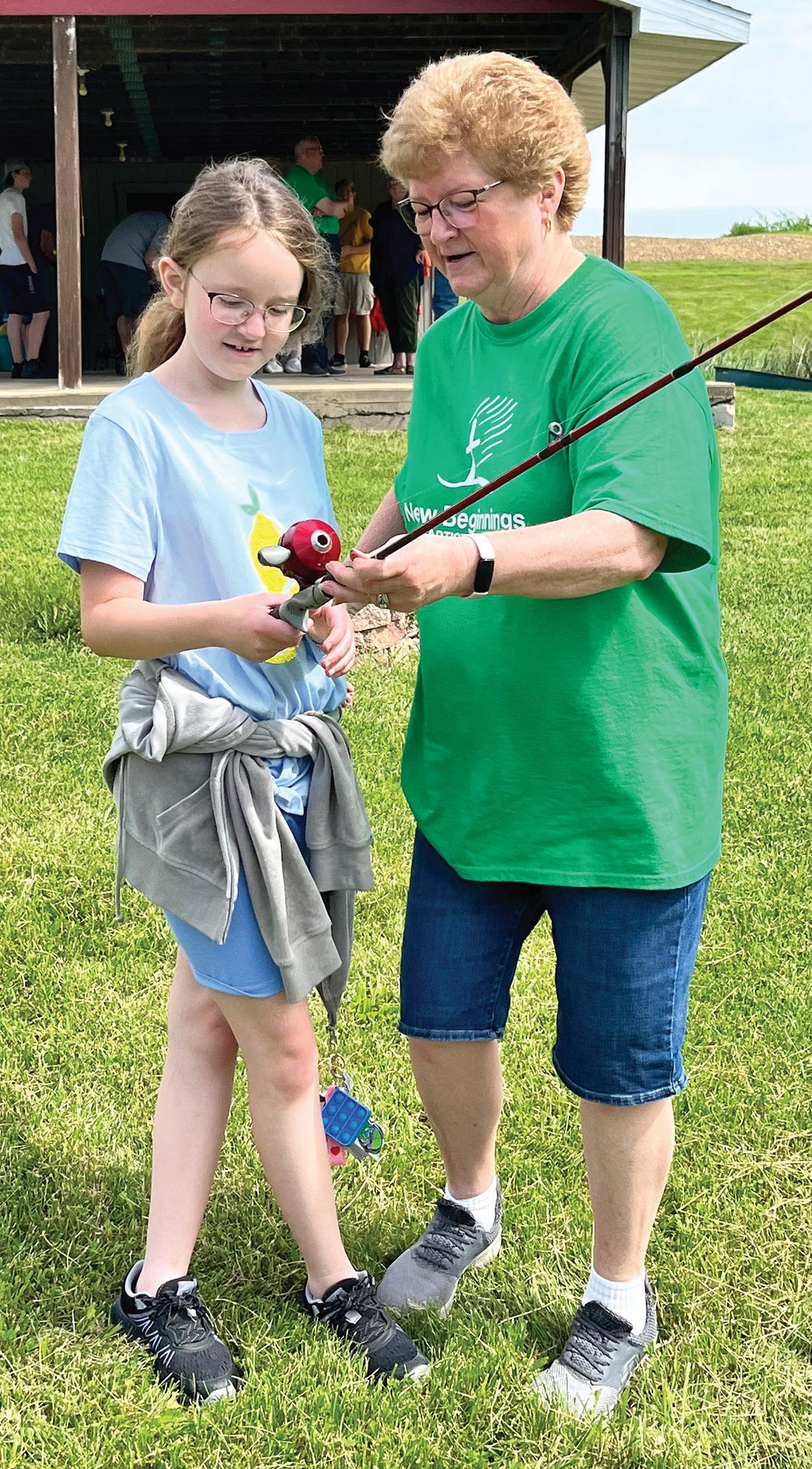

Saturday, June 5 brought visitors to both facilities just ahead of the first week-long camps of the season. Visitors were treated to many of the same activities enjoyed by young attenders at IBSA-led camps, including fishing, archery, hayrides, cookouts, and for a few visitors who wanted to volunteer, a bit of paint and fix-up.
Camp manager Brock Vandever installed new signage at Lake Sallateeska. At Streator, camp manager Jacob Kimbrough loaded up the wagon and took guests on tours. The must-have item at Streator is a colorful tiedye T-shirt emblazoned with the camp logo.
After two seasons hampered by Covid, enrollment is up this year. In fact, one camp week at Lake Sallateeska promises the largest attendance in a decade, according to IBSA Leadership Director Jack Lucas. There is still a bit of room left at both facilities. Visit IBSA. org/2022camps for more information.

IN FOCUS
Lament, then implement
Messengers adopt reforms to address sexual abuse. The next hurdle is putting them into practice across the denomination.
Anaheim, California | Ed Litton apologized to sexual abuse survivors as he opened the 2022 Southern Baptist Convention Annual Meeting. “Some of you are battered and bruised…worn out either because of a sinful condition or the sin of others,” he intoned. “If we are not moved to action, we will become indifferent.”
But with yellow ballots raised by 90% of messengers in the Anaheim Convention Center, the denomination showed it was not indifferent to abuse of vulnerable people in SBC churches. And messengers approved reforms to prevent abuse, care for survivors, and track offenders.
Litton’s successor Bart Barber, elected the same day that reforms were adopted, put predators “on notice.” SBC churches have been “a hunting ground,” he said. But no longer.
Now it will be up to Barber, a new task force he will appoint, and EC staff to implement the reforms, including development of a national database to track credibly accused abusers in the SBC. Just as important will be persuading some 50,000 SBC churches to be vigilant in preventing and reporting abuse.
The 2022 convention may have felt like a one-issue meeting, when viewed through the lens of the past few years. Release of the 288page Guideposts Solutions report on investigation of the EC’s handling of abuse claims one month earlier capped three years of hurt, doubt, and mistrust at the top levels of SBC leadership. Much of the meeting focused on public acceptance of the report commissioned by the Sexual Abuse Task Force (SATF) that messengers ordered appointed at last year’s meeting and approval of the recommendations they brought forward.
But there were other issues: Would candidates be elected who would support the reforms? Would cries of “liberal drift” overshadow response to abuse? How would a database, screening, reporting, and ministry mechanisms be funded? And would autonomous churches move abuse reform to the top of their own agendas?
And between the usual reports from mission boards, seminaries, and auxiliaries, several
With 8,133 messengers registered and a crowd of more than 10,000 overall, the Southern Baptist Convention met in Anaheim, the first Annual Meeting in California in 40 years. What might have been a nightmare after two years of abuse allegations and troubling revelations proved to be serious, but smooth as messengers, led by outgoing SBC President Ed Litton, adopted recommendations for reform.
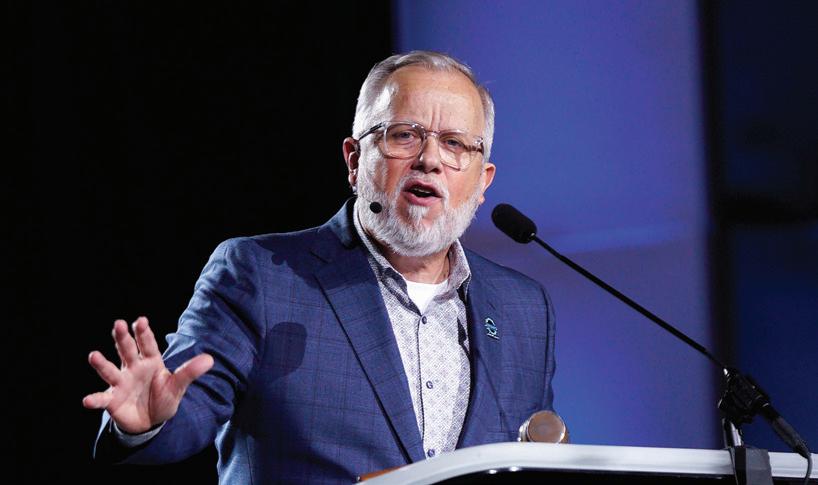
Illinois Baptist team coverage was produced by Eric Reed, Lisa Misner, Kris Kell, and Leah Honnen, with reporting from Ben Jones in Anaheim. Special thanks to our reporting partners at The Baptist Paper, and to IBSA staff and Baptist Press for some of the photographs.

Continued from page 5
other hot topics were brought to the floor—including the future of the SBC’s Ethics and Religious Liberty Commission and the relationship of the SBC to churches that allow women to use the title pastor, even if they are not the senior preaching leader of the church. (See reports on following pages.)
Looking back, looking forward
Illinois’ EC representatives were pleased by the messengers’ overwhelming approval of the reform recommendations. “I do feel relief as this has and continues to burden me greatly,” said Sharon Carty of Carlinville. She and Adron Robinson of Country Club Hills were engaged in the long and tense EC trustee meetings over contracting the independent investigation.
“Going forward I pray that our convention will work together to fulfill the Great Commission and the Great Commandment as we feed the sheep—and fight the wolves,” Robinson said.
“Messengers spoke clearly in their support of the two recommenda-

“I believe this is a ‘come to Jesus’ moment for us as Southern Baptists,” Litton said. He called it “a humbling moment…if we choose to be humble.”
Litton offered his own interpretation of the Greek word for compassion attributed to Jesus in Matthew 9. He called it a gut-punch. “This is our gut-punch, because we didn’t see what we saw, but once we see it, we need to feel it.”
“You could feel it,” said Bruce Frank, a North Carolina pastor who chaired the task force that brought the reform recommendations. “You could sense those in the room wanted to do the right thing,” he said, but just a first step.
Messengers voted to form a “Ministry Check” website to track offenders and to establish an Abuse Reform Implementation Task Force to work over the next three years. They also adopted two related resolutions: one calls for consistent abuse laws concerning pastors across all states, and the other resolution on repentance charges the church to care for the vulnerable. The resolution included apologies from Southern Baptists to survivors of sexual abuse.
Next stop, churches
The reforms will cost $3 million to establish the database and reporting systems, with an additional $1 million for survivor care. The EC had voted to alter the SBC budget to provide the funds, but in a late move the SBC’s Send Relief agency offered $4 million, saying the gift would not divert Cooperative Program dollars.
It was a turning point for the Convention, whose former EC leadership had contended since 2008 that Baptist polity would not allow for the creation of any type of pastor sex offender database, while EC staff secretly held such a list.
Frank said the database format would “respect church autonomy” while providing churches with resources.
Responding to a reporter’s question prior to the presidential election, Frank said the next president and who he picked to serve on the new task force would have a “big impact” on its success.
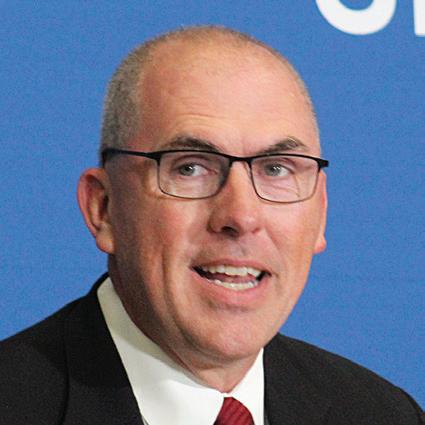
informed. He also stressed a need for them to understand Baptist polity. “They’re also going to have to be…doggedly committed to the goal of making our convention healthier.”
Barber’s election was welcomed by abuse survivor Anne Marie Miller. “He is full of genuine care for abuse survivors, and that was long before his name was on a ballot,” she said in a statement. “He is faithful and humble—two characteristics the SBC desperately needs.”
From the floor
Barber was elected in a four-man race. The last entrant, Frank Cox of Georgia, waited until the morning of the election to enter the race. He placed third in the first ballot. In a runoff, Barber defeated Tom Ascol, a candidate supported by the Conservative Baptist Network (CBN) who is the head of Founders Ministries. Barber won by more than 20 percentage points.
tions brought by the Sex Abuse Task Force,” IBSA Executive Director Nate Adams said. Adams’s team is leading a review of IBSA policies handling abuse claims and ministering to survivors. “While the recommendations themselves do not presume to direct autonomous state conventions, the overall report did include five requests of state conventions, and IBSA is already underway in our review and work to respond fully to those requests.”
Several platform leaders characterized the vote on reform as a turning point.
“I think the biggest takeaway from today is the tireless effort of these survivors,” said SATF member Rachael Denhollander, an attorney and abuse survivor. “They can look back and see those ballots being lifted up and think that’s because of me and because of my effort and being believed.” Denhollander was instrumental in the prosecution of Michigan doctor Larry Nasser for his abuse of young gymnasts.
“We put into place a lot of stop gaps to make sure a trauma-informed person is there to work through it to make sure boundaries are in place to work with survivors,” she said of the SATF reforms.
From The Tennessean J.D. Greear stood at the ready as (SBC) delegates debated sexual abuse reform. Greear, the SBC president from 2019 to 2021…pressed the “point of order” button and texted friends up on stage to let him speak. He even had a speech prepared. Greear was president of the convention when messengers authorized the independent investigation from Guidepost Solutions...“It was going to end by saying, ‘We all know what we came here to do.’”
After his election to the post, Texan Barber told reporters, “Sexual predators have used our decentralized polity to try to turn our churches into a hunting ground.” Instead, SBC churches can become “a place where sexual predators are put on notice that the tables have turned and where the hunter is now the hunted.”
Barber placed an emphasis on the SBC and its churches responding well to incidents of sexual abuse. “Every place where we have wronged someone in abuse is a place where we have betrayed doctrine,” he said, “where we have betrayed Scripture, where we have betrayed our Lord.”
In making appointments to the implementation task force, Barber said he will look for diversity and individuals who are trauma
From Associated Press
The vote on sex-abuse reforms fell short of what some survivors of abuse in Southern Baptist churches sought, such as a compensation fund for victims and a more robust and independent commission to monitor its churches’ handling—and mishandling—of abuse. And it also met opposition from some who contended the crisis was overhyped and that it interfered with Baptist churches’ independence.
Messengers adopted The Cooperative Program Allocation Budget and SBC Operating Budget for 2022-23. EC Interim President and CEO Willie McLaurin reported CP giving is 8.89% above budget for the first eight months of the current fiscal year.
He noted that Southern Baptists have given a cumulative $20 billion to CP since it was created in 1925. Messengers brought a variety of motions, ranging from an audit of the North American Mission Board (NAMB) to a new boycott of the Disney corporation.
Those particular motions were among 10 ruled out of order; 3 motions were referred to the SBC entities they affected, and 19 were referred to the EC.
The 2023 SBC Annual Meeting will be held in New Orleans June 13-14. It was moved there from Charlotte because of increased attendance in recent years.
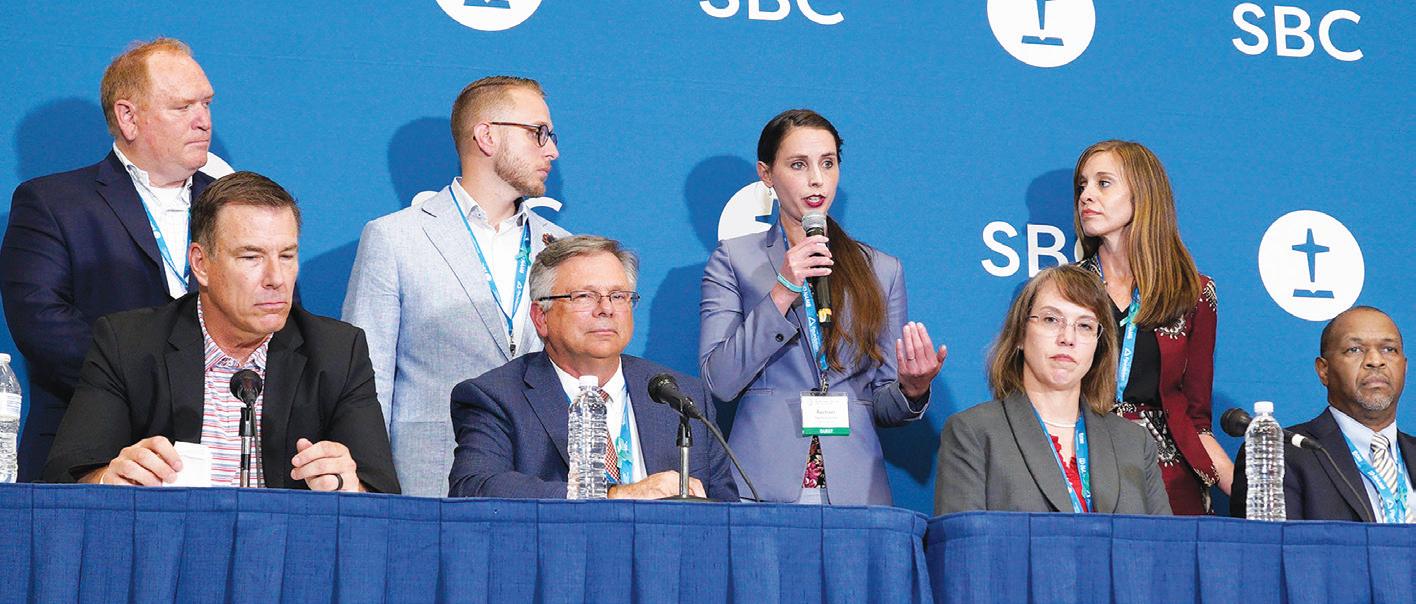
From Religion News Service
Another messenger suggested scrapping the report, saying Guidepost had “polluted” the committee. That messenger was angered by a recent pro-LGBTQ social media post by Guidepost.
(Sex Abuse Task Force Chair Bruce Frank) said that the issue at hand is not what Guidepost thinks of LGBTQ issues. “The issue is what do Southern Baptists think of sexual abuse. That is the issue.”
Other issues
Warren’s surprise appearance
Motion on Saddleback membership raises question of women as ‘pastors’
The founding and soon retiring pastor of Saddleback Church, Rick Warren, showed up to address a motion about the role of women in pastoral leadership. The motion was prompted by Saddleback’s ordination of three women with the title pastor last year.

“I love Southern Baptists,” Warren said. In fact, he is one. The megachurch of 40,000 with multiple campuses across southern California was founded by Warren from a Bible study group in 1980, although it has never used “Baptist” in its name.
Warren said he didn’t come to defend himself, but read a “love letter to Southern Baptists” that he and his wife, Kay, had written that morning. It included a recitation of the vast numbers of baptisms and church plants that have come from Saddleback over 42 years.
Warren joked that this might be his last convention.
The SBC Credentials Committee brought a motion to study the usage of the word “pastor” in SBC churches. While considering a motion made last year to disfellowship Saddleback, the committee cited inconsistent use of the title, sometimes meaning the office of the pastor which Baptist Faith and Message 2000 says is reserved for men, and sometimes meaning pastoring gifts, which Warren and some others say can apply to women as well.
The committee recommended a study group. Two seminary presi-
dents immediately came to floor mics to speak from opposing viewpoints.
“I was on the Baptist Faith and Message 2000 Committee,” Al Mohler said. “Pastor means pastor.”
The Southern Seminary president objected to a study group to define pastor. When the statement of faith was written, he said, “we were told that (pastor) was the most easily understood word among Southern Baptists for teaching leadership. We have to hope that was what churches understood, and what churches said they meant it.”
Mohler feared the eventual dissection of the statement through such study groups. “My concern is as a churchman, theologian, and someone who loves this convention... if we eventually have to form a study committee over every word in our statement of faith, then we’re doomed.”
Southwestern Seminary president Adam Greenway proposed an amendment to the study group motion to allow a broader study of how churches in the SBC relate to the Baptist Faith and Message. He recited a list of various statements that churches across the denomination identify as their own foundation—and sometimes none at all.
After a ballot vote, the Greenway
ERLC survives defunding motion
The SBC’s Ethics and Religious Liberty Commission survived a ballot vote to defund it, and is poised to fight another day on issues including abortion and expected battles in state legislatures.
A plea by Richard Land, first president of the ERLC, capped a brief debate over defunding the sometimes-troubled agency that has been accused of being too far removed from its grassroots funders.
“I would implore you not to defund the ERLC,” Land said from a floor microphone at the SBC Annual Meeting. “Southern Baptists have a unique voice in the world because of the ERLC.”
Land spent 30 years heading SBC’s lobbying for religious freedom and pro-life issues before he was succeeded by Russell Moore in 2013. Under Moore, the ERLC was accused of not representing the majority opinion of Southern Baptists, particularly on matters of national politics and immigration. Moore resigned in 2021 after squaring off with Executive Committee President and CEO Ronnie Floyd over handling sexual abuse.
The messenger who brought the motion, Josh Scruggs of Louisiana, said he hoped to end the
amendment failed, and the Credentials Committee withdrew the controversial motion. Chair Linda Cooper said the committee unanimously believes that “a majority of SBC churches hold the belief that the office of lead pastor, elder, bishop or overseer is limited to men as qualified by Scripture.” But they will engage in further study.
Presiding officer Ed Litton emphasized at that point that the issue will remain with the Credentials Committee until they choose to report it out for action. Bookended by quips about a dying man’s last words and his possible final SBC appearance, Warren called on Southern Baptists to focus on Great Commission matters. “As Western culture becomes more dark, more evil, more secular, we have to decide: Are we going to treat each other as allies or not?” Warren said.
@AdamGreenway (SWBTS President)
I can only imagine what the Southern Baptist Convention would look like if we determined not to work so hard to find new ways to divide ourselves. There is a real threat of drift we face: one away from cooperative missions and ministry, and this drift we should all resist. #SBC22

@AdamBlosser (Va. Pastor/blogger)

“We know our entities must align with BF&M2K. How closely must our churches align to be in friendly cooperation? To this point, churches have been given a great deal of latitude on a number of issues in the BF&M2K. Disfellowshipping Saddleback would certainly be a move away from such latitude. Maybe tightening our boundaries is needed. But if so, it’s worth studying. It’s not an emergency.”
@BlondeOrthodoxy (Texas Baptists, Katie McCoy)
Words matter, indeed. Especially when, in a culture/language like ours, their usage shapes their definition. That’s not a theo. statement - it’s a cultural/linguistic observation. So I hope the SBC has the discussion on terms, definitions, usage, etc. even for clarity’s sake.
divisiveness surrounding the ERLC. “Our division is disgraceful,” he said.
“Abolishing the ERLC is better than funding a compromised ERLC,” said messenger Josh Abbotoy of Houston who has written on the issue. “People use the ERLC for political ambitions,” he said in floor debate.
Characterizing the distance between the entity and the churches, he said, “Too often the leadership speaks for D.C. to the pews, not for the pews to D.C.”
ERLC’s Acting President Brent Leatherwood said that as he followed Moore he told the ERLC staff to “double down” on their mission, especially in light of the pending decision on Dobbs v. Jackson Women’s Health, which could overturn Roe v. Wade.
“Our advocacy is needed now more than ever,” Leatherwood said in defense of the ERLC. There is an opportunity coming with Dobbs ruling to take a state-by-state approach to make sure abortion is not “enshrined into law” in those states, such as
Illinois, which are not notably pro-life.
Land agreed. “This is a damaging moment to defund the ERLC,” he said. The ERLC can be a good provider of pro-life lobbying resources in the coming conflict, Land said. The motion that would have abolished the entity was like taking a cannon to a mosquito, he said. “The mosquito dies, but there is great destruction as well.”
Changing of the guard
New SBC pres loves small church
Bart Barber is not a megachurch pastor. You can hear it in the language he uses to describe church life.
“I’ve served churches that are typical of the Southern Baptist Convention,” the new president of the SBC said. First a small church out in the country, then a city church of 100-200, by his account. Now he pastors a church in Farmersville, Texas. Population 3,560.
“Those churches were helpful, because the pastor there is someone who is close to the members.” In those settings he learned to relate to everyone, Barber said, and to lead by consensus. “When those churches made decisions, the pastor could not do things by fiat.
“You talk to people and persuade…You build unity and consensus… if you don’t do that you don’t last long in a church like that.”
Barber has served in a variety of national leadership positions, but always from a smaller church perspective. Described as “folksy,” Barber never seems far from his roots. He holds multiple degrees, he talks about theology, but he also raises cattle. And he has a dry wit.
After returning home from the convention, Barber tweeted: “I’m adding a male to the herd this week—a consort for Lottie Mooooooon. I’ve decided to name him Bully Graham.”
New attitude at Exec. Committee
Barber is counting on that experience as he steps into his new office. The Arkansas native’s congregation averages 320 on Sundays. He lives from one monthly business meeting to the next, and he loves the congregational nature of Baptist life and leadership. “I think that’s preparatory for working in the Southern Baptist Convention,” he said. “The scale is different” he said, but the process can be much the same.
Christianity Today called Barber’s election a win in the denomination’s abuse reform. He takes the issue seriously and his first big task is to appoint a second task force for implementation of reform. “Every way I have served Southern Baptists has left scars,” he said. “But this family of churches is worth it. It’s worth enduring slings and arrows.”
Texas pastor Jared Wellman and South Carolina pastor David Sons were prominent on the platform at the annual meeting. Both were members of the Resolutions Committee. The pair are already familiar to those who watched video coverage of several SBC Executive Committee meetings where the panel debated surrendering attorney-client privilege in the investigation of EC leadership’s actions in handling sexual abuse. Wellman and Sons argued for transparency.
Now they are leading the EC. But they seem to want a lower profile than the out-front leadership of the past few years.
“It’s best whenever we are following the will of the messengers and we are being faithful to whatever our marching orders (are), in a way that’s almost boring.” Wellman said. “I think when the Executive Committee is at its best, it is not unlike an NBA referee. When an NBA referee is doing a good job, you should never recognize that they are on the court.”
Both men expressed a desire for a servant mindset, noting they would like to see the EC staffing structure move into that style. They employed some of same servant-leadership language used by interim CEO Willie McLaurin.
Wellman, 38, and Sons, 36, were elected EC chair and vice-chair the day before the SBC Annual Meeting began. Wellman succeeds 63-year-old Rolland Slade of California, who navigated the tumult resulting in the resignation of EC president and CEO Ronnie Floyd, a vice president, and 17 EC trustees.
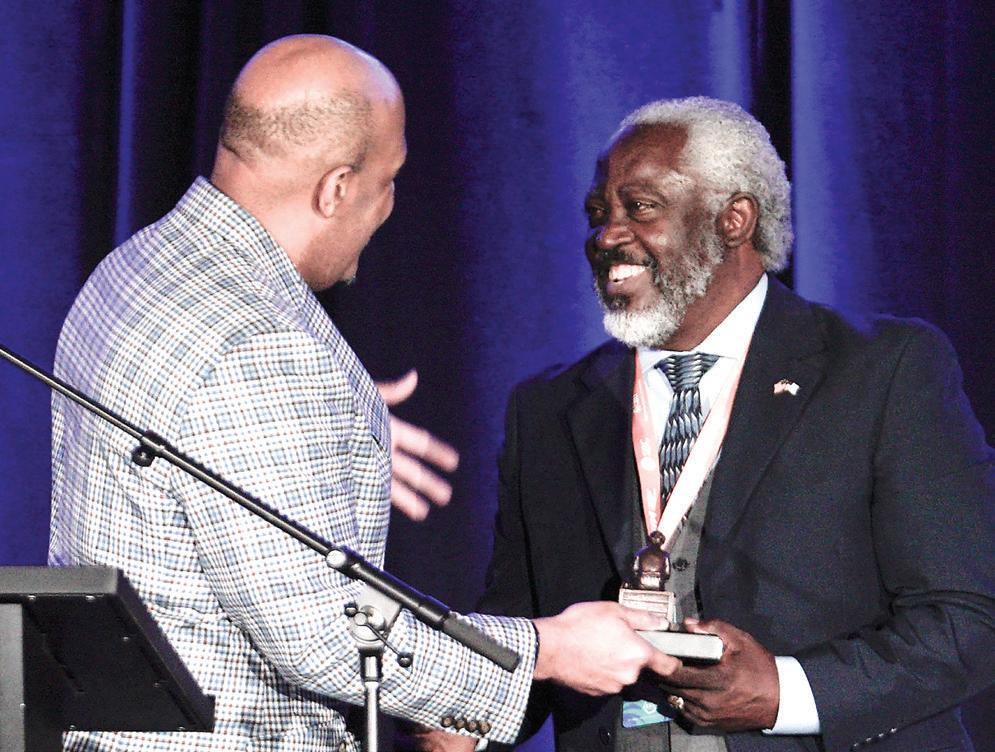
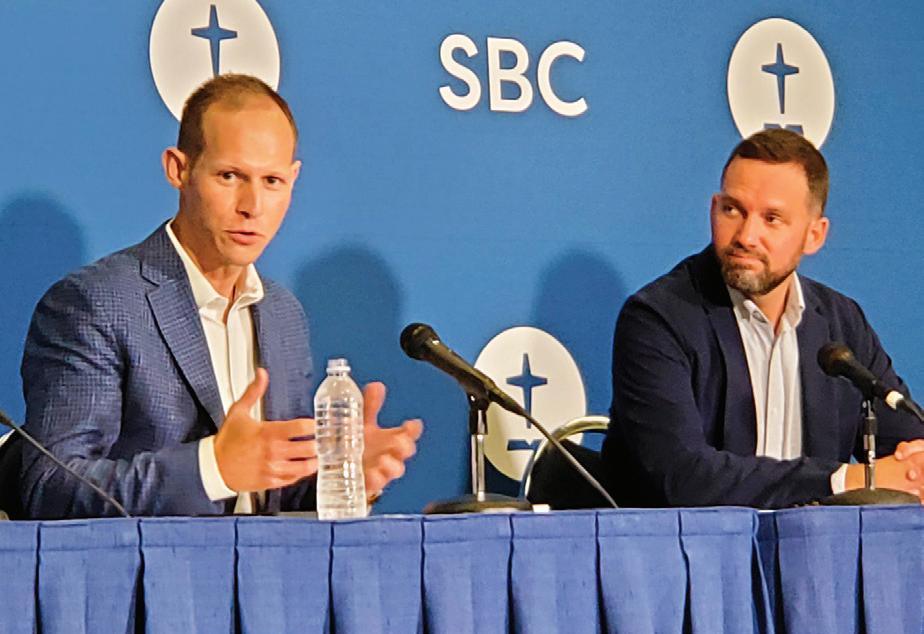
None of the candidates who had advocated preserving attorney-client privilege were elected as EC officers.
Wellman politely declined to attribute their wins to age or a different ethic on abuse. Likewise, Sons said, “I would hate to speculate what message that sends…. We really wanted to do
what was right in the moment and do the will of the messengers,” Sons said in their first-of-itskind press conference. “It was an important moment in the life of the EC and in the life of the convention…. This is just the first step in what is going to be a long journey.”
Wellman and Sons’ influence will be felt in the selection of the next EC president. Both are now serving on the search team, which is chaired by Illinois’ Adron Robinson. The metro Chicago pastor was also chosen as one of the four work group chairs, heading the Committee on Southern Baptist Relations.

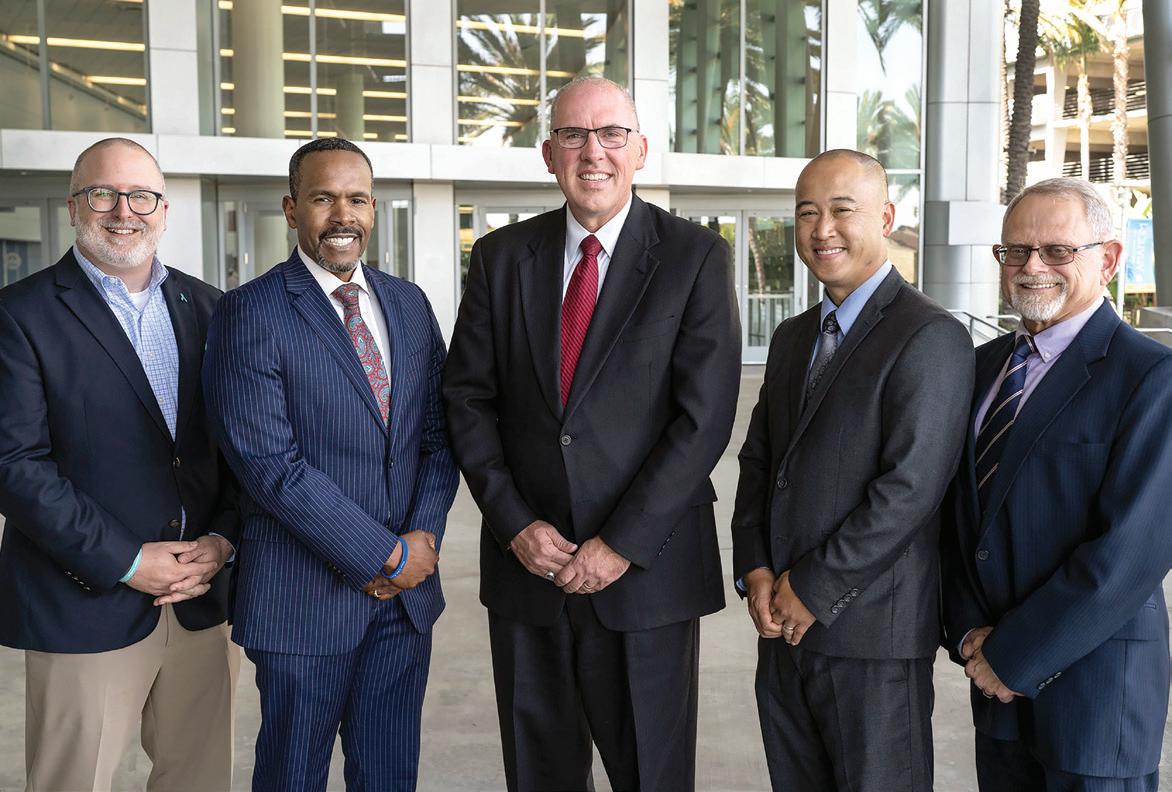
SBC messengers approved 28 new trustees to replace the unprecedented number who resigned or rotated off. That means nearly a third of EC leadership is brand new.
EC search begins in earnest
The group tasked with presenting the next candidate for president/CEO of the Executive Committee wanted to hear from Southern Baptists before taking next steps. The team is now ready begin the search in earnest.
“We needed to know how messengers were going to respond to that (abuse) report,” Adron Robinson, chair of the search team said. “We wanted to hear from messengers clearly, because anyone applying for this job needs to know the Task Force report and the job description.”
Candidates can include senior pastors as well as entity leaders or experienced executive pastors, Robinson said. Recommendations can be submitted through a portal at sbc.net/ecsearch.
“We’ve seen how vital it is for the EC president to be an administrator and also a communicator. We want to hear from our SBC family for their recommendations and plan to leave the portal open until early August,” he said.
Robinson declined to share a specific timeline for presenting a name to the Executive Committee, which would then vote on the candidate. He did ask for Southern Baptists to continue to pray for the team as well as the Convention.
“We know the EC has lost credibility among the messengers in the past two years,” Robinson said. “We want to make sure we were hearing clearly the direction of the messengers before moving forward with our search. It’s important to restoring future credibility.”
Litton project aims to unify, reconcile
In his final moments as SBC president, Ed Litton brought before messengers a new initiative to equip Southern Baptists for the work of racial reconciliation. Joined on stage by Dallas pastor and founder of Urban Alternative Tony Evans, and the first African American SBC President Fred Luter of New Orleans, Litton took the wraps off the Unify Project.
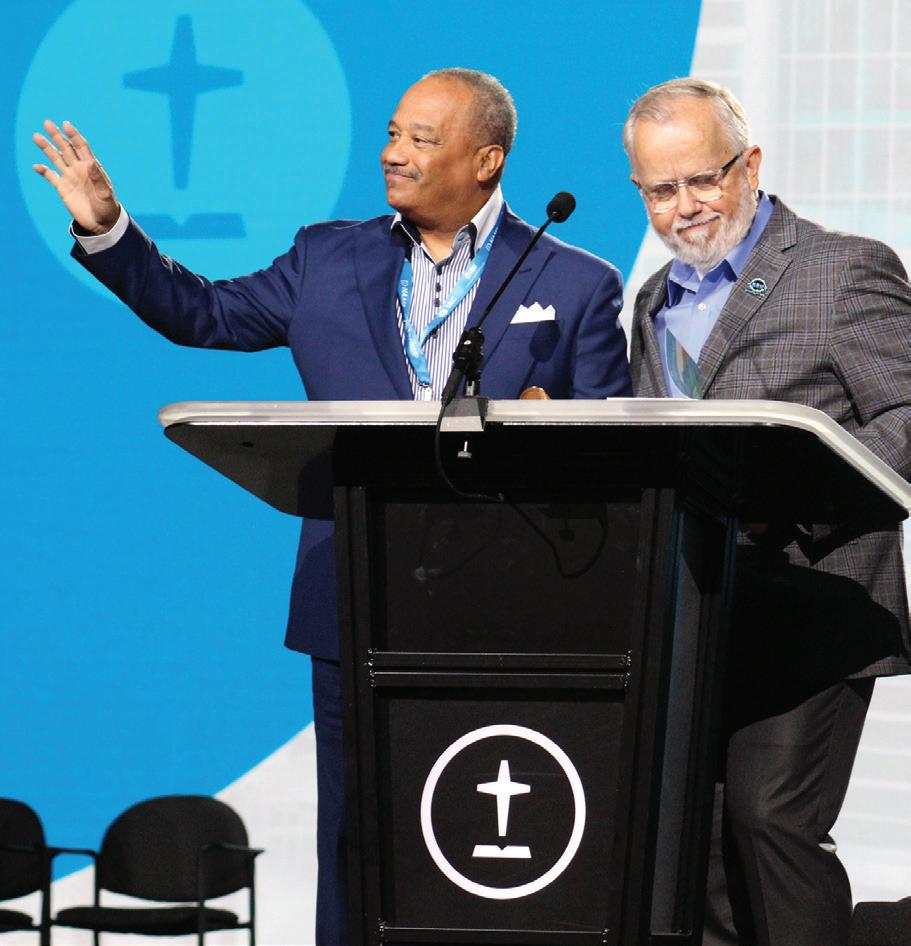
“What we hope to do,” Litton said, “is to start a grassroots movement, a local church initiative in your communities to cross barriers of race, different denominations and groups, to begin to meet with people who are likeminded in the Gospel of Jesus Christ, to offer a kingdom solution for the divisions that exist in our land.
“The church should be on the frontline of bringing hope and healing to our communities for the glory of God.” said Litton, who has led a similar effort in Mobile, Alabama, where he pastors.
Luter said, “We as a Southern Baptist Convention have made a lot of progress, but now it’s time to take it to the next step…to deal with and confront the racial divide in our communities and in the nation with the Gospel of the Lord and Savior Jesus Christ.”
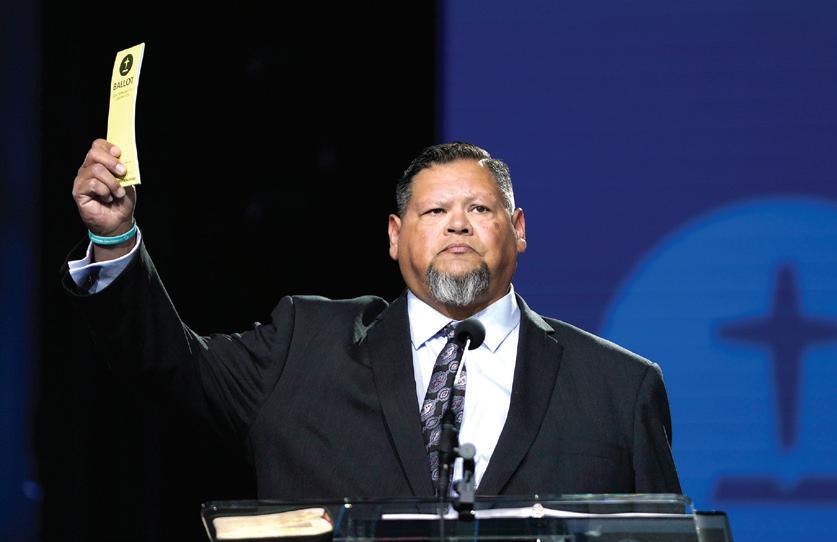
Evans explained the “three As” that are the foundation of the effort:
Assemble: Each year churches will gather for a “solemn assembly” to “reinvite God collectively into the well-being of their community.”
Address: Churches will “speak with one voice to the issues in their community,” providing God’s perspective on those issues.
Act: Local church members will be challenged
to do acts of kindness for strangers with the goal of pointing those individuals to the gospel. With “kindness cards,” churches can make connections with individuals in their communities. The result is that “millions of people in a mean world [will see] the kindness of God.”
Referencing the “stain” of racism he addressed earlier this year, Litton said, “The gospel of Jesus Christ is the solution for the most damaging wounds in our land…. This is the moment for us to begin.”
The Unify Project is set to begin this fall at unifysbc.org.
– with reporting from Baptist Press and The Baptist Paper
A new tool for abuse prevention
Resolution calls for consistent ‘shield’ laws across states
Messengers to the 2022 Southern Baptist Convention called on lawmakers in all 50 states to enact legislation creating uniform definitions for pastoral sexual abuse, and they gave Baptists in the states a tool for urging the legislation.
Resolution 5 “On Consistent Laws Regarding Pastoral Sexual Abuse” was part of a package of actions on the agenda resulting from the abuse handing investigation.
“We do see this as part of a movement that goes from state to state,” said newly elected SBC president Bart Barber of the development of consistent laws. Barber also served as chair of the 2022 Resolutions Committee.
Southern Baptists have used resolutions effectively to state what they believe. And in cases such as this, resolutions give force to local movements seeking to bring change to the culture.
Barber was particularly supportive of Resolution 5 based on his own experience as a pastor in Texas. He urged passage of a “shield law” to give legal protection to churches sharing information about cases of abuse. A bill he drafted was supported by the U.S. Conference of Catholic Bishops and a private schools coalition. Texas lawmakers approved it unanimously.
Responding to a question from the Illinois Baptist after his election, Barber pointed out that a Southern Baptist wrote the bill, Southern Baptists’ Ethics and Religious Liberty Commission “translated from preacher-ese to lawyer-ese,” and a state representative who is a
Southern Baptist ushered it through the approval process in the Texas legislature.
“We would be delighted to see not just Southern Baptist churches, but people of good will across the country” join the movement to create consistent legislation. That would prevent an offender in one state from moving to another state with lesser penalties without consequent, Barber said.
The legislation would clarify the illegality of pastors who engage in sexual acts with people under their care, despite age or consent. The resolution says, “These laws make no exception for the consent of the victim since pastors and ministers are in a position of trust, which is broken when the one in authority engages in a sexual act with the victim.”
The resolution also advocates legislation to shield churches from civil liability when they share information about alleged abuse with other organizations.
Such laws would also aid in the legal protection needed to contribute information to a national database of credibly accused offenders in SBC churches. Barber said he hopes the government will come alongside church leaders to end “a patchwork of contradictory and inconsistent laws.”
“That’s advantageous for us to help prevent abuse,” Barber said, and as the resolution states, “to protect the innocent within the churches of the Southern Baptist Convention from wolves in shepherd’s clothing.”
Be it resolved…
Southern Baptists approved nine resolutions. In addition to those relating to lament for abuse, new abuse laws, and the customary appreciation for the host city, they said “aye” to the following:
On the Mission Field in Rural America
With recognition of the mission field “in rural places,” Southern Baptists pledged to continue to support the work of the Cooperative Program to help spread the gospel in these areas.
On the Prosperity Gospel
This resolution denounced false teaching and affirmed “that God and God alone is our highest good and our supreme treasure, not health, wealth, or the removal of sickness.”
On the War in Ukraine
Messengers condemned Russia’s acts of war and called on President Vladimir Putin “to cease hostilities immediately, withdraw the Russian military, and end this war of aggression against Ukraine and her people.”
On Religious Liberty, Forced Conversion and The Federal Indian Boarding School Initiative Investigative Report
This resolution denounced “forced assimilation and conversion” of Native Americans, Alaska Natives, and Native Hawaiian children from 1819 to 1969. This came in response to a May 2022 investigation that documented how the U.S. “maliciously targeted” Native Americans in order to “dispossess these people groups from their native lands by forced assimilation through the establishment of mandatory boarding schools.” Committee member Mike Keahbone, a Native American pastor, said the action would help as he shares the gospel with native peoples.
On the Anticipation of a Historic Moment in This Pro-life Movement
This encourages all Southern Baptists “to pray for the overturning of the disastrous precedent set in Roe v. Wade and Planned Parenthood v. Casey.” The resolution affirmed the work of the Ethics & Religious Liberty Commission on this issue and urged Southern Baptists to continue “faithful prolife advocacy by partnering with local, state, and federal government to enact pro-life and pro-family policies that serve and support vulnerable women, children, and families.”
On the Imago Dei…
Messengers affirmed “the dignity and value of every person as created in God’s image and to proclaim the fullness of the Christian ethic throughout our churches and in the public square as we seek the flourishing of all people in accordance with God’s good design for humanity.”
“You are not isolated, you are not alone and you are not small. You have all the power of the risen Christ with you.”
12 preachers, 2 days, 1 book
“It’s the hardest thing I’ve ever done,” 2022 SBC Pastors Conference President Matt Henslee said about being president of the conference, “but the experience helped me refocus on my spiritual health, my quiet time with the Lord.” Henslee chose to cover the whole book of Colossians and asked twelve pastors to preach. Here are excerpts from some of their sermons.
Clifton | Col. 1:1-8
“The Church is our greatest hope in times of hurting because the Church is the visible body of Christ.”
When Paul penned “this glorious letter, he sent it to a small town… that Paul had never even visited. Because to the apostle Paul, there are no unimportant churches…. No omatter where you serve, it matters to God—and it should matter to you. God knows where you are, and that is all that matters…God loves small places. God embraces those places.”
“Jesus is not trying to come to take sides; He’s coming to take over.”
Too often dying churches are guilty of caring more about “their needs than the needs of the lost around them.” It’s the gospel—not focusing on attracting young people or something else—that brings churches back to life, he said.
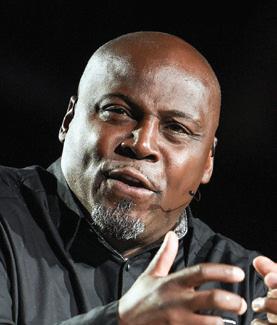
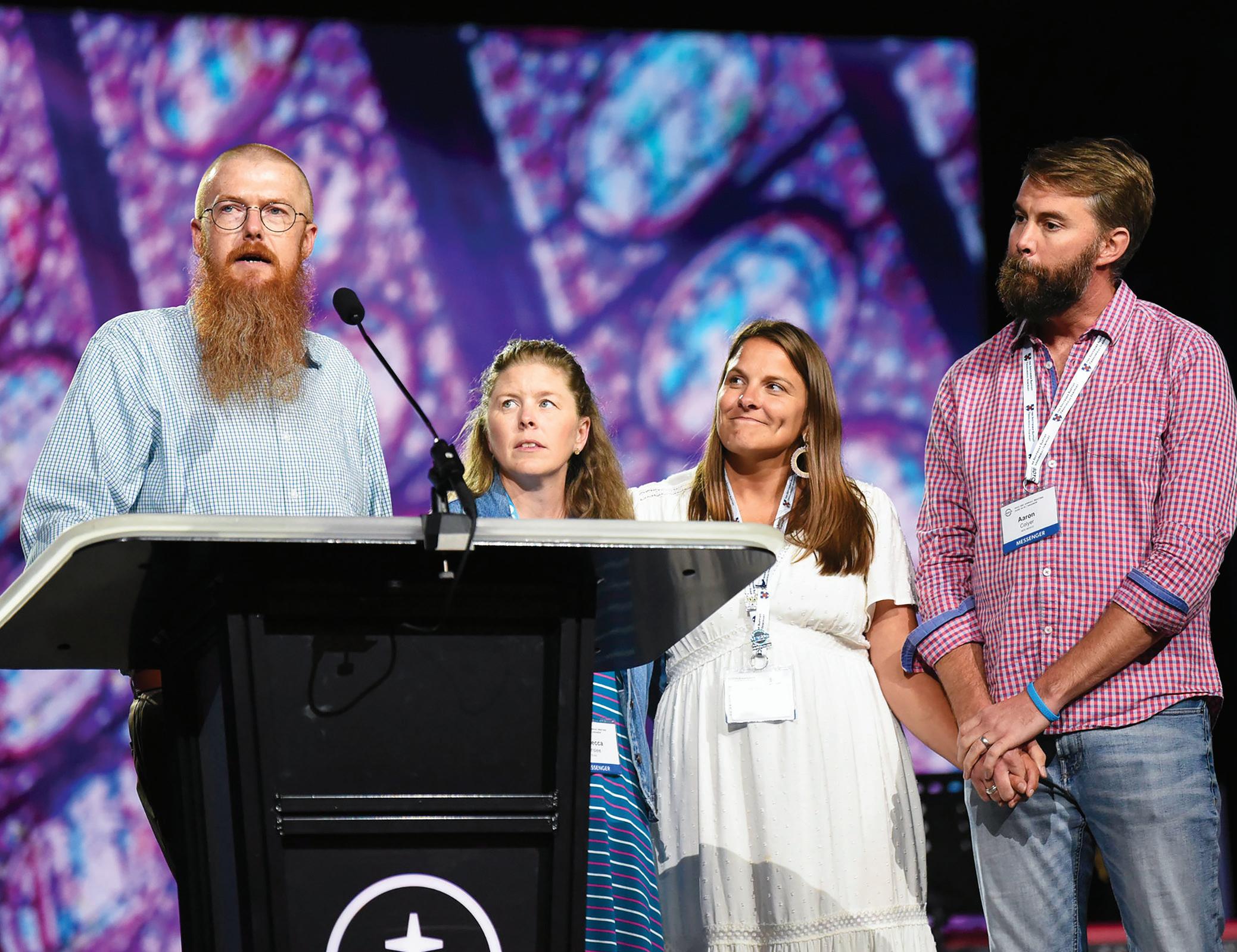
“Until you and I as pastors get compassion for our city, compassion for the lost, compassion for people who hate us, we will never fully understand the gospel. It is all about compassion.”
Liu | Col. 1:15-20
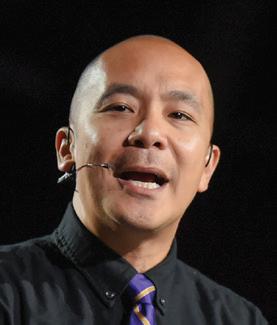

Every single verse “proclaims the absolute supremacy of Christ.” Ultimately, Christ must be proclaimed as supreme over all things because he is preeminent over his creation and his Church.
Paul’s purpose is “to equip us and strengthen us to continue in Christ and avoid being captivated by attractive bad ideas, dangerous ideas.”
The saints in Colossae were tempted by outside ideas even though they wanted to “live a truly full and fulfilled life in Christ.” But in valuing fulfillment, they became vulnerable to false ideas. One of the keys to finding true fulfillment in Christ is through continuing to “walk in Christ with rootedness, edification, stability and gratitude.”
Carter | Col. 3:12-14
What is evident from social media isn’t an SBC ruled by the fruit of the Spirit, but rather by the fruit of the flesh—enmity, strife, anger, rivalries, dissensions, and divisions.


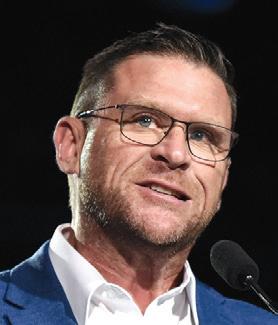
“I know the temptations in my own life that no one else knows. And if those captivate my heart and mind, I can be led astray.”
“Our task…is to study the text, the Scriptures, diligently and to proclaim the text for clarity and to apply the Scriptures with wisdom, pointing people to the ultimate wisdom of the Scriptures, which is Jesus Christ, and we sit down. We sit down in the pew under the throne.
“Despite our various opinions…one thing is essential: We must remember whose name it is we represent, who we proclaim, especially when it comes to matters of denominational integrity and accountability.”
Hayes | Col. 2:1-7
“I think Satan must be overjoyed at the state of our convention right now. Because we’re characterized by a lot of things, but love for each other is not one of them.”
“Jesus plus nothing equals everything! Don’t add anything else to the gospel.”
Paul’s love for the Church, encouragement to the Church, and challenge to the Church are clear. Believers should be careful not to allow what’s “on the outside…to permeate the body of Christ.”
In today’s culture where care has turned into criticism, concern has turned into categorizing, and compassion has turned into canceling, “we need to turn up the dial of agonizing, not antagonizing.” Paul encouraged the believers to “be knit together in love,” as different ideologies, philosophies, and religious practices were threatening the truth that Jesus is enough.
“The gospel still works.”
“Let the legislators make the laws. Let the barons of Wall Street make the money. Let us preach the glorious gospel of the bloody cross and an empty tomb, and do not ever let the devil tell you otherwise.”
Tibayan | Col. 2:8-23
“When a false idea captivates your mind as true–captivates your heart as true–the results can be deadly,” but through fulfillment in Christ, disaster can be avoided.
“The Scripture could not be any clearer that we have to fight for doctrinal fidelity and theological accuracy, but Scripture is also clear we’re to do that in Christhonoring ways that exhibit the fruit of the Spirit.”
“Does that describe you?”
Elsewhere in Scripture love for each other is evidence of salvation. Why is it such an accurate litmus test? Because it can’t be faked. “You simply won’t do it unless you have been born again, unless you have been transformed by the love of Almighty God.”
Jackson | Col. 4:7-18
“There are no insignificant saints, no insignificant churches, no insignificant pastors.”
Paul concludes the letter by commending seven saints by name.
“These names are not familiar to us.” Though few might know their names, they are partners in gospel ministry. Each person listed has something to teach the saints today. They teach the significance of faithful service, reconciliation, crossing ethnic and cultural barriers, intercessory prayer, loyalty, the tragedy of falling away, and perseverance.
You may feel your name is on this list.
“My dear pastor, fellow pastor, you do not have an insignificant ministry. You may be in a very isolated place. You may preach to only a handful of people. But whether you preach to five or 5,000, your work is infinitely and eternally significant.”
*Sermon summaries excerpted from The Baptist Paper.
pastor’s conference
None insignificant in the gospelPRELUDE – Organizer Matt Henslee (left) leads prayer for a fellow pastor and his family.
Missions reports challenge and encourage
A couple from Illinois was among 52 people commissioned for international missions at the 2022 convention in Anaheim. The couple will be known as Lyle and Melody Strong, not their real names, since they will be serving in an Asian country where Christian witness puts people in jeopardy.
IMB launched a new brand at the convention. It is a Google-style map pin combined with a praying figure. “Our two primary revenue streams, the Lottie Moon Offering and the Cooperative Program combined, are currently running more than 14% ahead of last year’s giving year-to-date,” IMB presi-
dent Paul Chitwood reported.
Chitwood also said there are now 1,000 candidates in the pipeline, after a decade of decline in sending missionaries from 2008 to 2018. He focused on the number 157,690— the number of people who die each day without Christ.
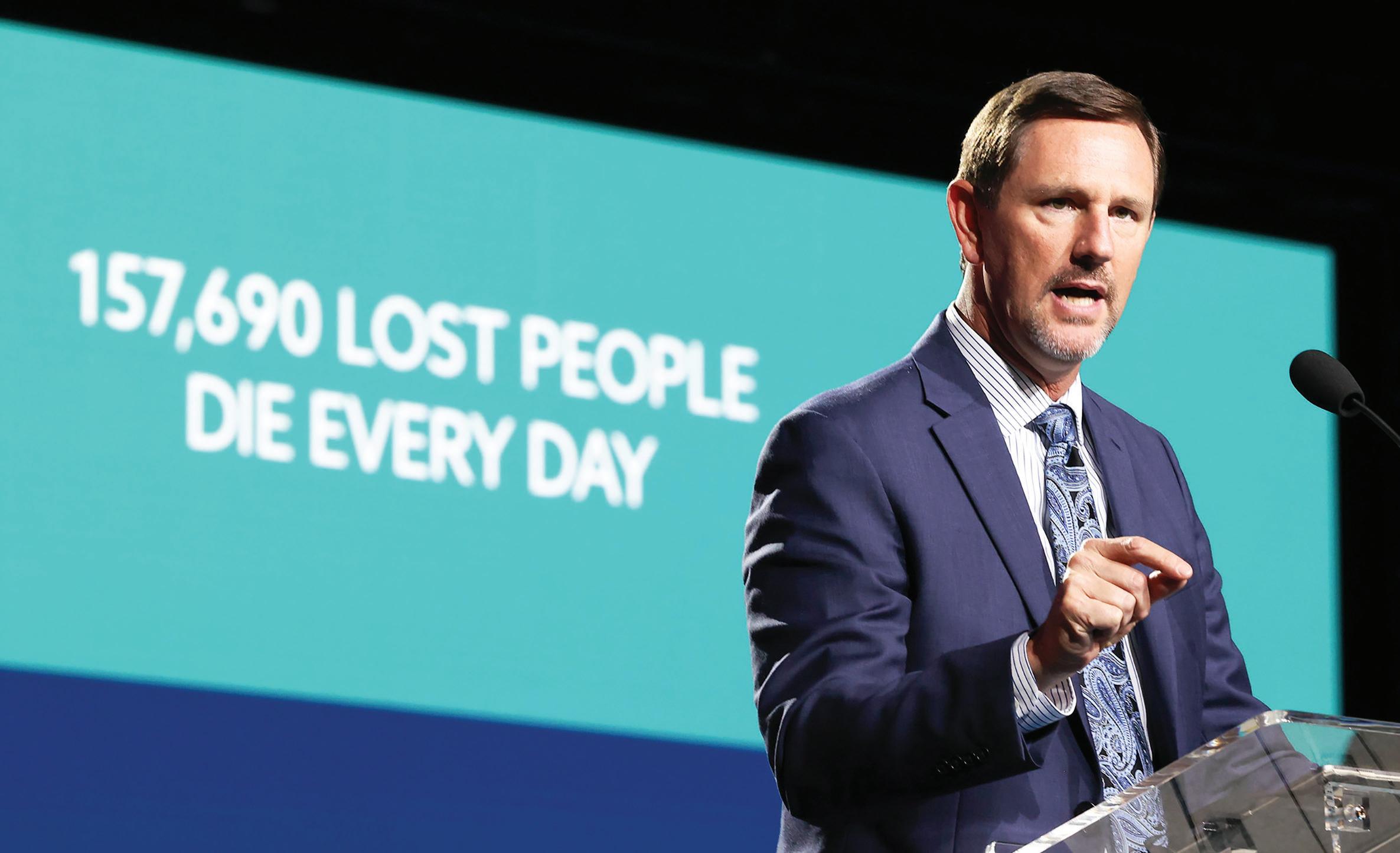
“Together, we get to share the Good News of Jesus with people and places where that news has never been heard,” he said. “Together, we send, sustain and support missionaries to be steadfastly present around the globe to share that message and plant healthy churches. We must reach the nations, together.”

Messengers applauded and cheered when NAMB President Kevin Ezell shared about the historic 2021 Annie Armstrong Easter Offering of $66.5 million, which surpassed the previous record by $5 million. Since 2010, receipts to the offering have grown by 22% and set a record four of the last five years. Those offerings represent a “growing commitment among Southern Baptists to invest in the work being done because you see the fruit of the labor,” Ezell said as he thanked Southern Baptists for their faithful giving.
“We have seen God move through students, through churches, during this time,” the head of California Southern Baptists, Pete Ramirez, said of Crossover, the annual evangelistic outreach that precedes the convention each year in the

host city. “I can’t thank enough those who were part of this whole experience.” The event drew 572 volunteers, served more than 2,400 kids and their families and witnessed 547 people make professions of faith.
“What we saw was like an atomic bomb had been dropped on the city of Mayfield when we were there,” Bryant Wright said of the EF4 tornado that tore through Kentucky December 10, 2021, claiming 57 lives and leaving a miles-long trail of damage in its wake.
“What was so exciting was to see those yellow shirts [of Southern Baptist Disaster Relief volunteers] all throughout the fields surrounding the area of Mayfield as we were arriving there soon after the storm,” said Wright. “That happens time and time again during crisis.”
Wright stood with NAMB president Kevin Ezell and IMB President Paul Chitwood on the SBC platform to report on their joint work under the banner Send Relief.
Chitwood described the refugee crisis in Ukraine that he witnessed during multiple trips to Eastern Europe. Because of the IMB’s ongoing mission and church planting work in the region, Baptists were well positioned to respond as the war displaced millions of people. Chitwood thanked the hundreds of SBDR volunteers who sacrificed to make the trip and praised Southern Baptists for raising more than $11.5 million to support compassion ministry efforts there.
– stories excerpted from Baptist Press
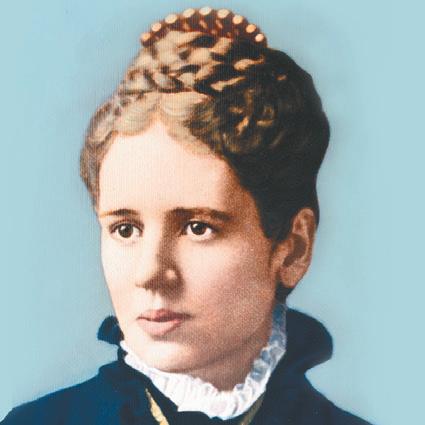
Woman’s Missionary Union

Multi-layered cooperation really works
Sandy Wisdom Martin inspires with Lake Sallateeska baptism story
(Editor’s note: With a focus on the impact of gospel conversations, Illinois’ very own Sandy Wisdom Martin told a heartwarming story from her home state in her report as WMU Executive Director-Treasurer to the Southern Baptist Convention meeting in Anaheim.)
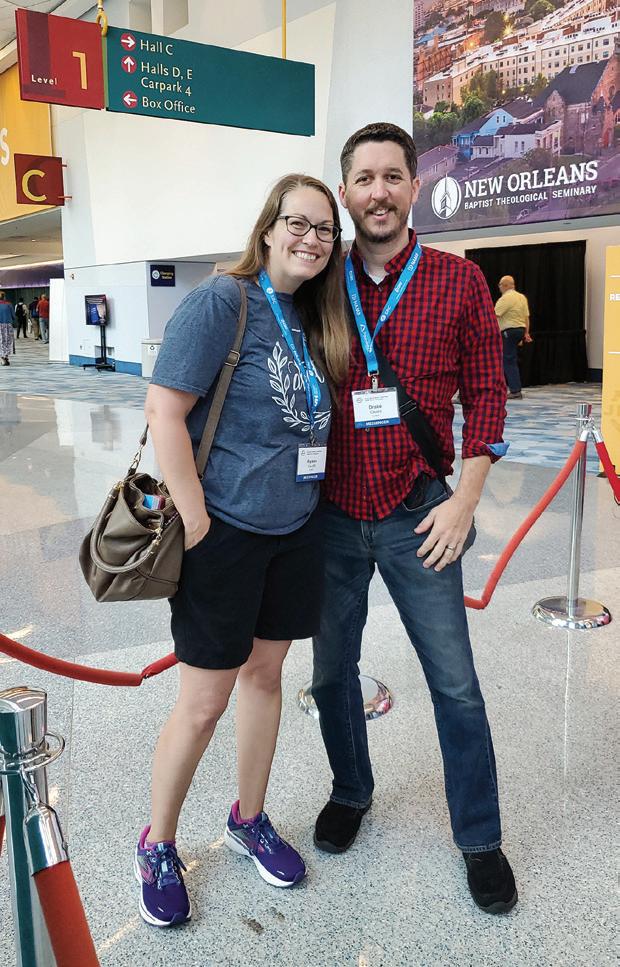
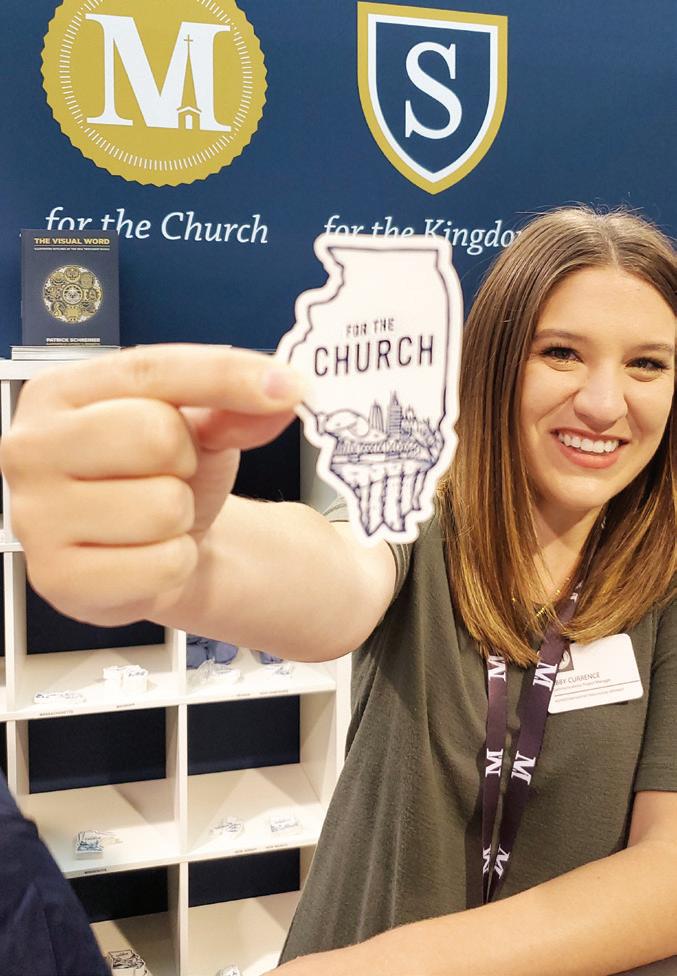


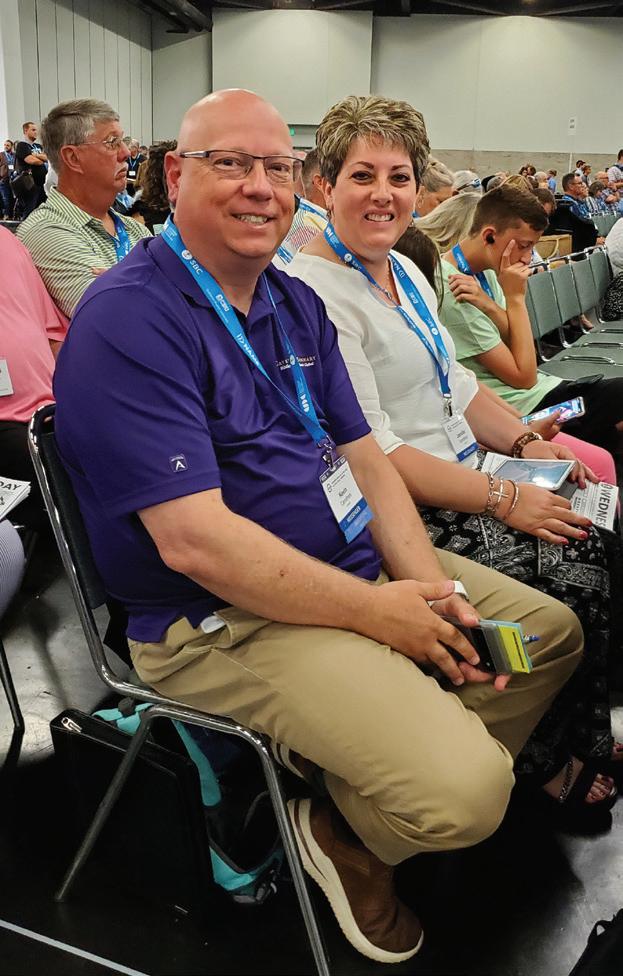

I want to tell you why I believe so passionately in what we do together as Southern Baptists. Last fall, I was on my way to Arkansas and my mother called me.
She said, “After you finish your assignment on Saturday, can you come to Illinois on Sunday?”
Well, I had to be in Mississippi on Monday and Illinois was the opposite direction, but I did a few calculations and I could get up very early, drive to Illinois, get back to Memphis by midnight and make my assignment the next morning in Mississippi.
Mom wanted me to attend a baptism at Lake Sallateeska. About 20 minutes from our home, two candidates were being baptized: a college student and a 60-year-old man. The testimony of the man is that he had walked the aisle when he was a child. We know that children do come to faith, but he recognized in his own life that it wasn’t a true profession of faith.
A few years ago, a family tragedy caused him to consider his life. His public baptism was his testimony to follow Christ relentlessly. The man
attends a rural church plant of a rural church plant that has received some North American Mission Board funding. The pastor of both church plants is a man named Danny. While in seminary, Danny interned at a church where the current president of the North American Mission Board, Kevin Ezell was pastor. Kevin had quite an impact on Danny’s life and poured into him. Now, Danny has partnered with three church plants.
As I was watching those two candidates get baptized at Lake Sallateeska last fall, I thought to
myself, How did we get here?
Well, it was the work of a local church. It was the work of a rural church planter. It was the work of my home association, Nine Mile Baptist Association. It was the work of my home convention, Illinois Baptist State Association. It was the work of the North American Mission Board.
I have always been a strong advocate of what we do together, but today it’s more personal to me than ever, because the 60-year-old man that was baptized at Lake Sallateeska last fall is my brother Doug.
How many conversations and touch points did it take among Southern Baptists for my brother to come to faith in Christ? What we do together as Southern Baptists matters. I want to sincerely thank you for the work that you do on behalf of the kingdom. And I want you to know at WMU, it is our honor; it is our privilege to co-labor with you.
110 messengers from Illinois go west
What is clear and unclear after Anaheim
Clear: Despite loud voices on social media and at the floor microphones voicing opposition to the Sexual Abuse Task Force recommendations and to the Ethics and Religious Liberty Commission, urging messengers to “change the direction,” there is a quiet majority in the SBC. If the messengers at Anaheim are a representation of the people in the pews, then there is broad support for the direction the SBC is headed in new leadership, how it handles sexual abuse within the church, and how it attempts to engage a culture with increasingly unbiblical views on sexual ethics and the unborn.
Tuesday’s vote that overwhelmingly affirmed the SATF recommendations gave evidence of that quiet majority. Prominent sexual abuse survivors stood outside the convention center on Tuesday morning offering small green ribbons of support for survivors to passersby. Many politely declined, but the vote inside showed 90% or better support.
Even a vote to eliminate the ERLC, which has a much more complicated standing in the minds of messengers, failed easily. Despite concerns and disagreements, the SBC is nowhere near ready for such drastic measures.
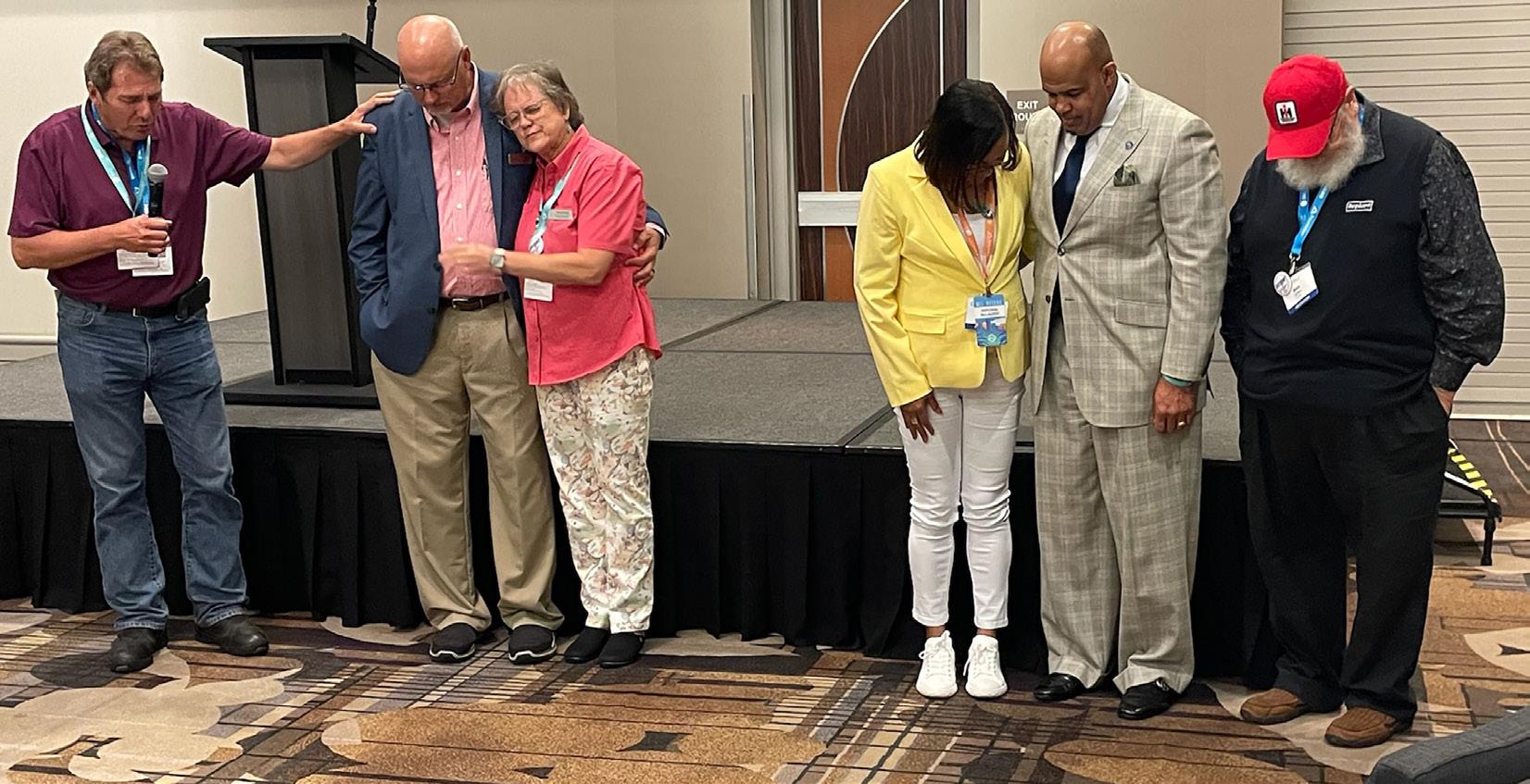
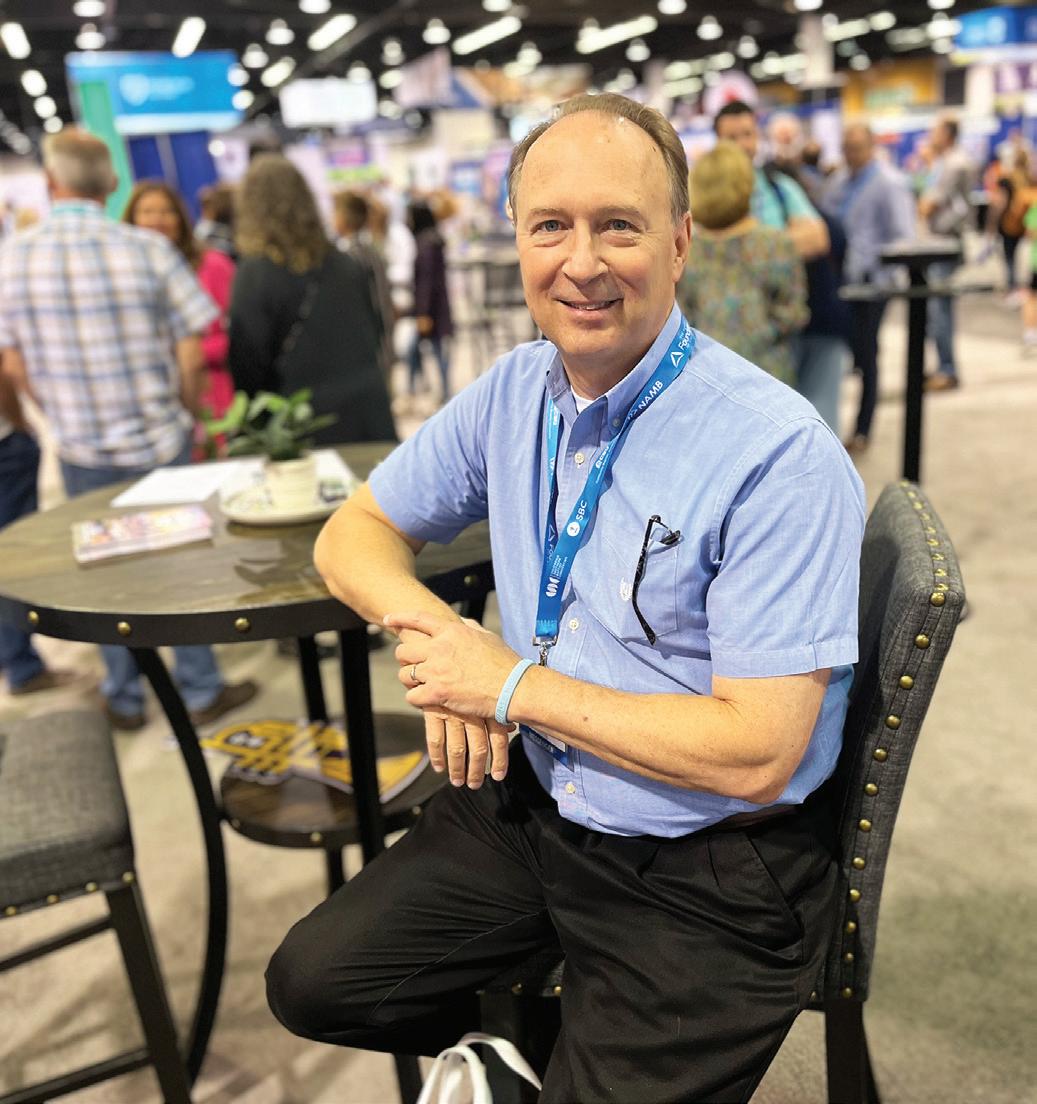
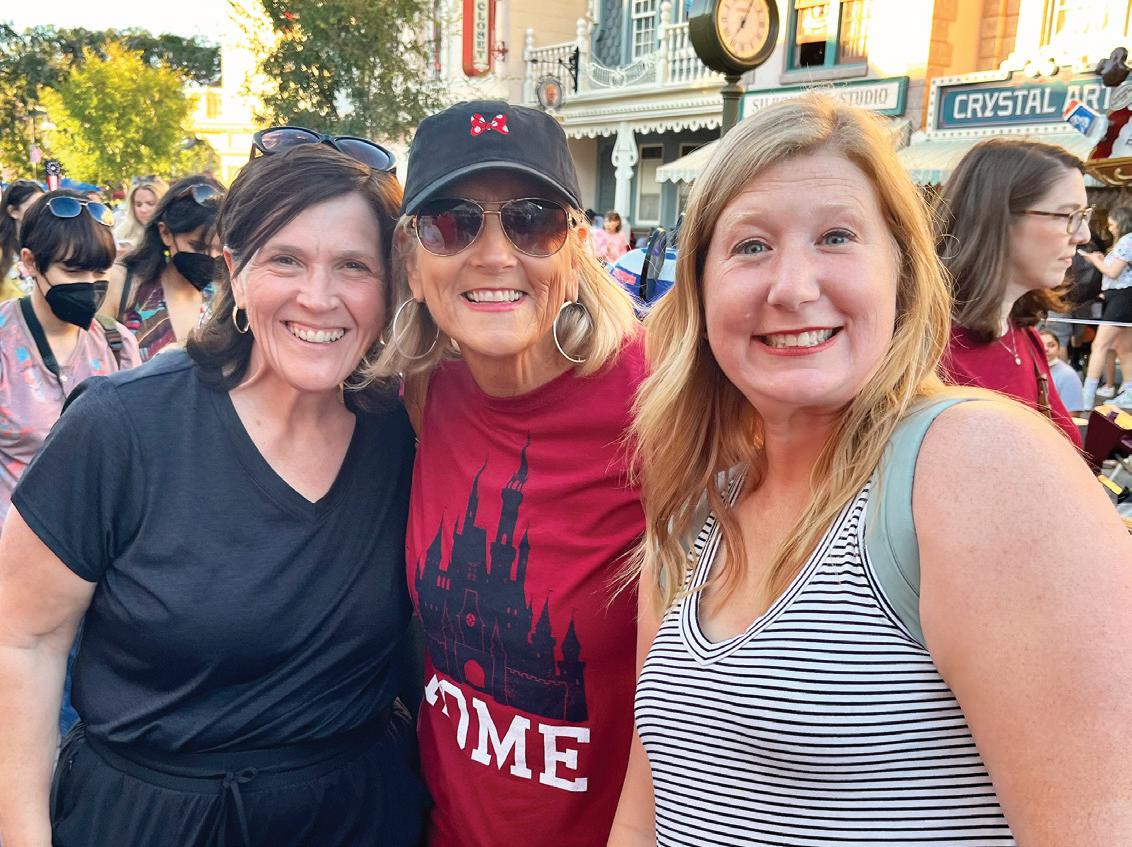
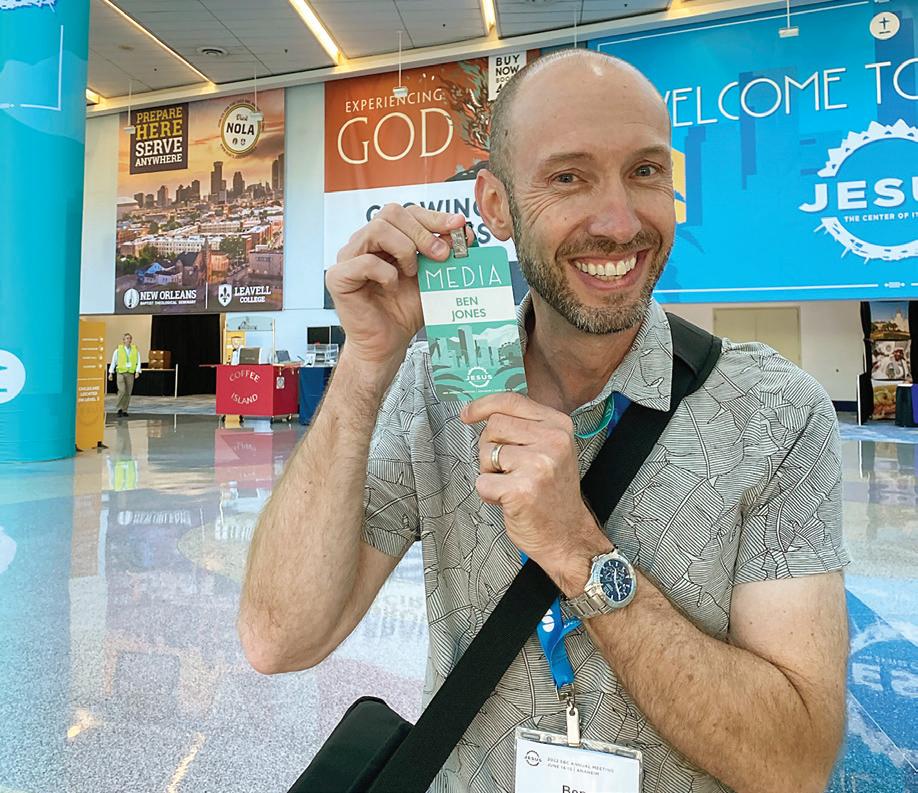
Unclear: Other votes were less one-sided, indicating questions of unity moving forward. 38% of the messengers voted for Tom Ascol, the candidate backed by the Conservative Baptist
Network, a group that has vocally disagreed with the direction of the SBC for the past two years. While a 61/38 split in an election would normally be considered a landslide win, this vote was not just about personality, which has often been the case in recent SBC presidential elections. These two candidates held very different views for how best to address some of the larger issues the SBC is presently facing.
In a convention that is deeply committed to the commands of Christ, Jesus’ words on unity can’t be ignored:“By this everyone will know you are my disciples, by your love for one another.” “That
all of them may be one, Father, just as you are in me and I am in you.”
There are real questions and real concerns to work out. If there is to be enough goodwill and unity to continue, the IMB may play a key role.
The SBC loves the IMB. Year after year, messengers and guests at the convention are reminded of the primary reason some 50,000 churches fellowship and give together—to send missionaries to the ends of the earth. Seeing 52 new missionaries crossing the platform at the IMB commissioning service on the first morning of the convention, telling why they are going to serve, is the core of what keeps the SBC together.
IMB President Paul Chitwood passionately said as much from the platform on Tuesday. And Chitwood himself may play a key role in preserving and furthing our unity. The affable former pastor and Kentucky Baptist state executive is generally soft spoken, with a southern drawl. He is well liked, well spoken, and well poised to be a uniter in the Southern Baptist Convention. As an articulator of unity around missions, Chitwood could play a key role helping Southern Baptists to come together in the great cause of global missions even as they work out their differences.
Chitwood’s call for togetherness for the purpose of missions was very clear.
Ben Jones reported from Anaheim, California.

Multi-purpose driven
Gillespie church plans new community ministry in expanded facility
Outside puddles formed on the new concrete slab from an early June downpour that rolled through Gillespie. The work site smelled of the fresh-cut lumber of stud walls and trusses. The yard was ringed by pick-up trucks and construction trailers, but mostly it was silent.
Inside the church basement was noisy with the sounds of lunchtime chatter as 90 workers munched and talked in southern drawls. A man in a workman’s yellow shirt stood to talk about building walls like Nehemiah and serving like Moses.
The people were Carpenters for Christ (CFC), an Alabama-based ministry that sends volunteer construction crews to build church facilities. This project was a 10,000 square foot addition at Trinity Baptist Church in Gillespie.
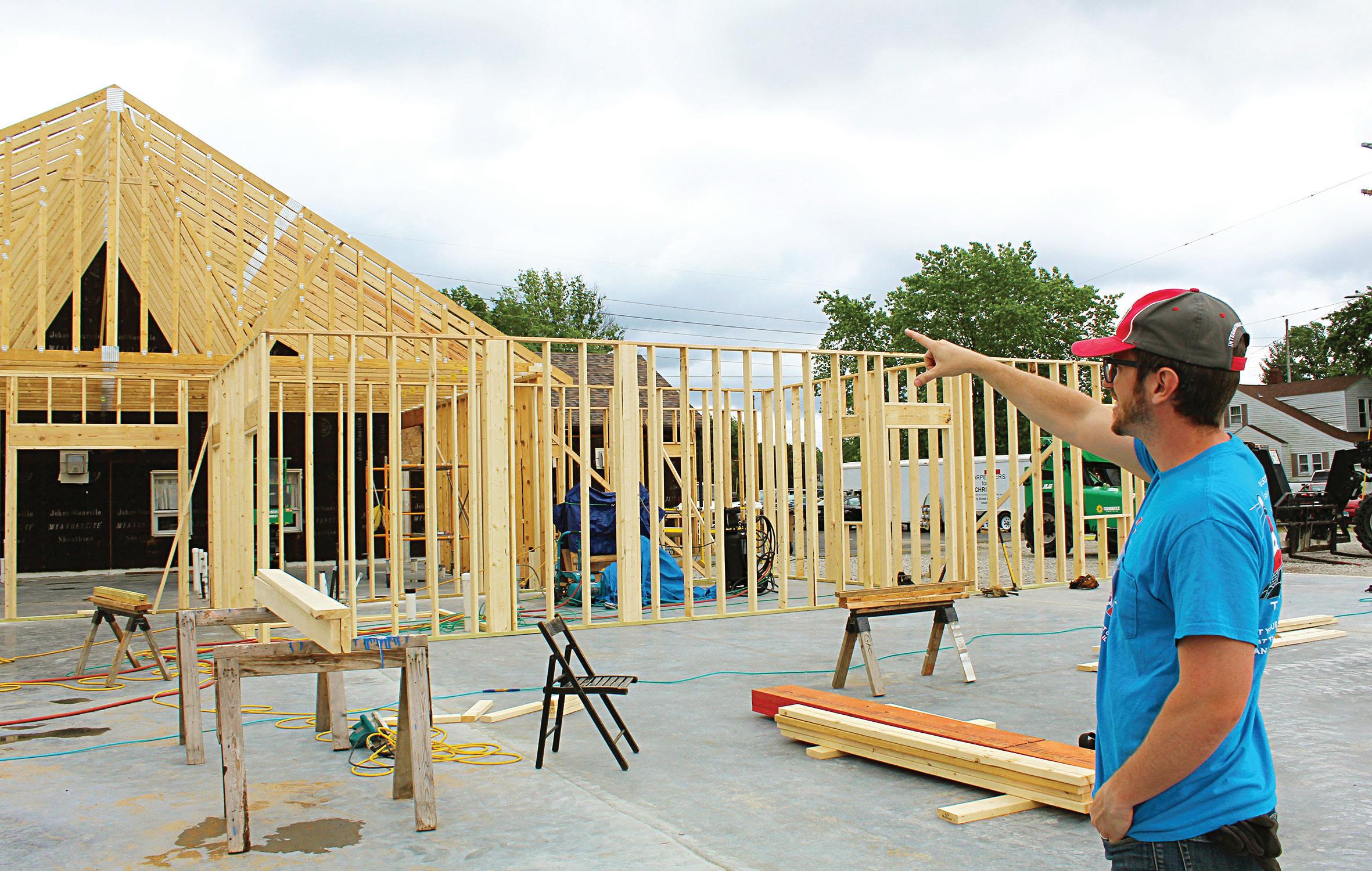

“We get to listen to the stories of folks that have sacrificed all their lives to get to the place where the church is ready to build,” said Dave Tidwell, project chair for the volunteer carpenters.
This isn’t the first project Tidwell has led in Illinois. CFC starred in Carlinville in 1987, followed by Pittsfield, Woodlawn, Summerville, and Medora. In Gillespie, the folks had been dreaming a long time, first under the leadership of pastor Richard Hill during 23 years there, and then under Dane Solari, the current pastor. Solari said the need for space was evident right away.

“I feel this is something that God was awakening us to,” Solari said. As one example, he pointed to a spot where more than 20 youth were meeting regularly in an old garage.
The church envisioned expansion of worship and office space, children’s ministry, nursery, and restrooms. But mostly, they wanted to share their ministry with the community.
“I was a latchkey kid,” Solari said, one of those children who let themselves into their homes after school then wait for their working parents, often single mothers, to return at the end of the day.
For families like these, Solari has ministry plans. “We want to be a church that sees broken families come together and meet in this place— and, if the Lord wills, be restored.”
Solari’s vision for Trinity is clear. “We exist for the community. God put us here for that reason.”
A utility pole in an odd location near the existing building had stopped the project for years.
“That was our Goliath,” Solari said. So, they began praying over it.
God started sending people who would work on the project, including an experienced project manager who worked for Boeing in St. Louis.
“It’s been a faith building exercise for me,” said Danielle Massey. Construction is different from airplanes, she said, but God is using her skills. “I had one problem last week, and my response was
just to say, ‘Father, would you please take care of this?’”
He did.
Just as he did with the obstructionist pole. The utility company first wanted large fees to move the pole, but eventually they abandoned its use and gave it to the church. Designers worked the pole into the building plan.
CFC had two crews working over two weeks. They stayed at nearby First Baptist Church of Litchfield, which has become a ministry partner for the Gillespie congregation. “It’s exciting to know that we’re all in this together, you know,” Solari said. “We’re not alone in ministry.”
Inside chair legs scraped across the floor as workers stood, corralled their plates and cups for the trash can, and headed upstairs to the work site. Outside the sounds of saws, hammers, and nail-guns soon filled the air, as the lunch crowd transformed back into their teams.
“I cried happy tears when I saw those trusses being raised,” Massey said. It was easy to see how so much had been done on just the first morning of work.
GROWING
Learning curve recommendaTions
Full Circle Parenting
Jimmy & Kristin ScrogginsThis book uses the Three Circles gospel tool to guide our conversations with our children. While it is not a formula, it prepares parents to create discussions that steer kids toward redemptive, positive heart change. “God always gives us the opportunity to recover and pursue his design.”
– Becky Byars Pastor’s Wife, FBC, McLeansboroStrengthening the Soul of Your Leadership
Ruth Haley Barton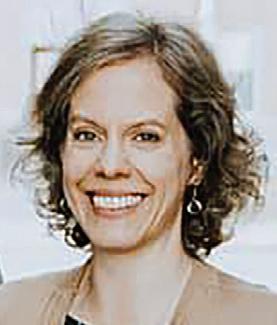
These days I am benefiting most from books that strengthen my soul. This book looks at the journey of Moses in experiencing God and being transformed in the “crucible of leadership.” I identified with and found encouragement in Moses’ search for the presence of God in the challenges of ministry leadership.
– Lawrence D. Haskin, Sr. Pastor, Household of Faith MarkhamThru the Bible
J. Vernon McGee
I must confess that I’ve been a joyful passenger on Dr. McGee’s “Bible Bus” for nearly twenty years. If you listen to these weekday podcasts, you can enjoy in-depth studies through the entire Bible in five years. Dr. McGee’s faithful exposition, practical application, and cheerful wit speak to my heart every time. TTB is a great resource for the new disciple of Jesus or for the more seasoned saint.
table talk
We’ve all experienced burnout. Maybe your burnout story involves being overworked, cutting a vacation short due to an emergency, or navigating a family crisis. Maybe it’s a result of Covid19. Ministry burnout often comes over time as a result of multiple events.
Take David for example. In 1 Samuel 18-21, we read about David’s marriage to the king’s daughter, the king’s attempt to take David’s life, his fleeing for his life and pretending to be insane. These events led David to retreat to a dark cave. His time alone was soon interrupted. Everyone who was in distress gathered in the cave. David quickly found himself leading more than 400 men.
Yet while in the cave, burned out from his life changes, running and hiding, David prayed. David records his plea to God in Psalm 142. In this prayer, we discover five powerful strategies.
1. Acknowledge the reality of burnout.
David admitted the reality of his situation. He confessed he had no energy when he said, “My spirit is weak within me.” He even acknowledged “no one stands up for me” and “no one cares about me.” Aware of his weakness, David didn’t allow the reality of his weakness to keep him from coming to God in prayer.
Burnout is real, but the experience doesn’t make us insignificant. God calls us to lives of ser-
vice that have many joyful and exciting moments. Yet, there are also difficult and wearisome seasons. Ministry burnout shows no partiality.
Once we recognize burnout, we should acknowledge it to God in prayer. God is fully aware of the burnout we experience, and he invites us into his presence.
2. Go back to basics.
David did not have energy for a lengthy address to God like the author of Psalm 119. He simply cried out, “You are my shelter, my portion in the land of the living.” For David, returning to the basics meant returning to the attributes of God.
The attributes of God are a wondrous place. Genesis 1 declares God is our Creator. Exodus 15 praises God as our Warrior. Psalm 23 gently reminds us God is our Shepherd. Isaiah 40 boldly reveals God as our great Comfort. While burnout often leads to thoughts of hopelessness, revisiting the greatness of God produces hope.
3. Be honest with God. David didn’t hold anything back from God: “Listen to my cry, for I am very weak.” Facing a low point in his life, David was honest with God and asked for deliverance. We have permission to be honest in our prayers. God is omniscient and is aware of our burnout. God is omnipresent and is with us as we go through the motions of ministry. God is omnipotent and is at work in his church despite
burnout
our burnout. So be honest with him.
4. Show transparency in our requests.
While hiding in a cave, David became the leader of 400 men. Burnout often leads to hiding, even while leading others. While encouraging others in their pain, we may mask our own dark loneliness so others can’t see the pain. David attempted to hide from others, but he could not hide from God. So, David was transparent in his weakness: “Rescue me from those who pursue me, for they are too strong for me. Free me from prison…”
We may be able to hide our burnout from others, but we can’t hide from the God of Light.
Valuable lessons for vacation season

5. Remember we’re not alone.
David ends his prayer with hope. “Free me from prison, so that I can praise your name. The righteous will gather around me, because you deal generously with me.” David hoped he would not remain in the shadow of the cave. God was with him and would not leave him to face uncertainty alone.
Burnout may leave us feeling uncertain, however, we are not alone. Psalm 142 gives a good example of David, but there’s an even greater picture of the One who is with us always. Jesus experienced the utmost loneliness on the cross, and now he’s the victorious advocate who prays for us. As Octavius Winslow said, “When I cannot think of Jesus…Jesus is thinking of me.”
This column is excerpted from Lifeway.com. Caudill blogs at drakecaudill.com.
– Scott Foshie IBSA Health Team Leader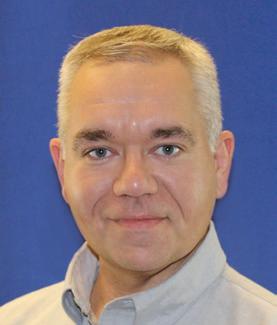 Drake Caudill is Senior Pastor of First Baptist Church of Carmi.
Drake Caudill is Senior Pastor of First Baptist Church of Carmi.

We all need a break—from“Want to hear my sermon on the importance of a healthy work/life balance?”
BRIGHTER DAY
The wisdom of ages
Afriend recounted her visit to a family member in an assisted living facility. Not only did she spend time with her relative, she also had a long chat with a few other residents and their families. “I don’t think we do that enough,” she said, explaining how the group—varied in age and life experience—simply enjoyed each other’s company.
I was reminded of her story a few weeks later when I went to check out a piano for sale. The gentleman who owned it invited us into his home to see and play the instrument. In the few minutes that followed, he shared stories of his life with his wife, the piano player in the family who died nine years ago. They have a son on the mission field. He himself started a Bible study at his church almost 40 years ago—and it’s still going, he said.
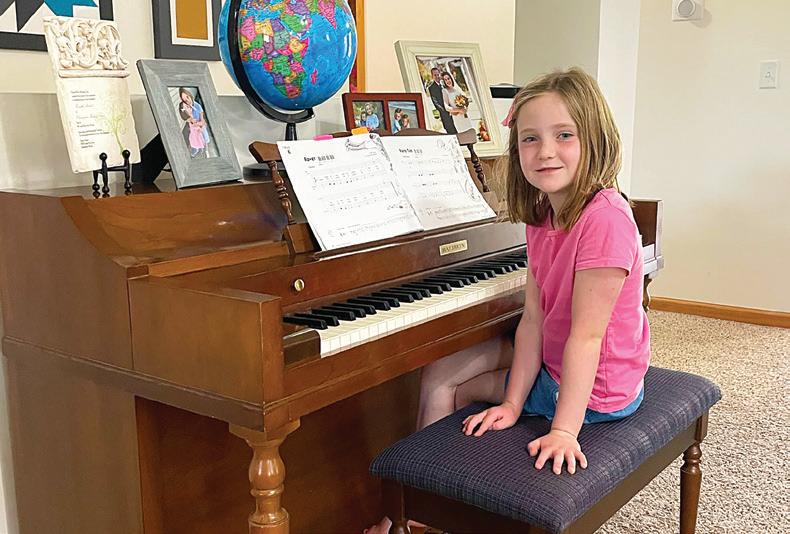
Trends from nearby and around the world Tracker
Outreach: What’s your one-mile ministry?
Heritage Baptist Church in Montgomery, Alabama asked important questions recently:
• Who lives near our church?
• How can we reach them?
A mostly white congregation in a neighborhood with many Black families, the church first aimed to connect with schools and businesses. Now they’re reaching house-to-house. The church called Frederick Harris, an African American, as their “Minister of One-Mile Missions.”
Culture:
Long work commutes
Short church commutes
His stories, of family life and longevity in the faith, were a surprising encouragement. I thought I might leave with a piano (or at least the promise of one). I got that and more—we enjoyed each other’s company, and I walked away appreciating the testimony of someone who has spent more years than I have so far walking with Jesus.
Scripture says “understanding comes with long life” (Job 12:12) and “gray hair is a crown of glory” (Proverbs 16:31). Those passages are an encouragement to me in the middle years of my own life, as I benefit from the experience of people older than me. I’m also finding wisdom isn’t limited by generation.
I recently started meeting with a small group of women 15 years younger than me. They are bold and missional in everything they do. They invite friends over for dinner at the drop of a hat. They are unafraid to share what they have. They give freely of their time and energy. They are setting an example for believers “in speech, in conduct, in love, in faith, and in purity”
(1 Timothy 4:12).
I’m often tempted to stick with the social circle I know, people who are in my same age and stage of life. Too rarely do I have the patience to listen to those older than me, or the grace to learn from those who are younger. I’m grateful for these brief years in the middle, and prayerful I’ll remember to reach my arms wide in both directions.
Meredith Day Flynn is a wife and mother of two living in Springfield. She writes on the intersection of faith, family, and current culture.
41 miles roundtrip is the average U.S. worker’s daily journey. People with long commutes have higher rates of respiratory illness, deteriorating posture, and weakened mental health. And it’s boring.
47% of worship attenders say their Sunday church trip is between 6 and 15 minutes. 21% say it’s five minutes or less. People in small towns tend to have the shortest trips.
As the distance increases, the likelihood of weekly attendance decreases.
– Lifeway Research
People: Love thy neighborhood
“A man is called selfish not for pursuing his own good, but for neglecting his neighbor’s,” said 19th century British theologian Richard Whatley. Loving your neighbor goes far beyond peering over the fence. To love your neighbor means to serve our communities by giving back what we receive—an ongoing flow of goodwill.
– allprodad.com

Social media:
That’s how many Illinois cities are on Nextdoor.com, some with dozens of neighborhoods. Is yours on the list?

July 22-23
Guy Camp
What: A fun, worshipful overnight retreat for guys of all ages.
Where: Streator Camp
Cost: $40 per camper. Includes meals, lodging, and activities.
Info: www.IBSA.org/GuyCamp
Contact: TammyButler@IBSA.org
What: These online courses are leadership focused, individualized, facilitator-led, and highly interactive. Each class is designed to deliver challenging, relevant teaching with a focus on practical application for ministry. The cost for these courses is $25 for IBSA-affiliated church members.
When: 8-week class terms begin August 8th
Info: www.IBSA.org/EquipOnline for upcoming course offerings
Contact: LindaDarden@IBSA.org
EQUIP Training Nights
What: Ministry skills training including a main session and two breakouts.
Where: various associational locations in August, September, and October

When: August 9, Emmanuel, Carlinville
August 16, Tabernacle, Decatur
August 23, Wayne City
Info: www.IBSA.org/equip for additional dates and locations
Contact: TammyButler@IBSA.org
neTworking
Send NetworkiNg items to IllinoisBaptist@IBSA.org
Charity Baptist Church in Carlinville seeks full-time pastor. Set in a rural community, Charity has a thriving and growing church family. Please send resumé to charitybcpastorsearch@gmail. com or 21964 Charity Church Road, Carlinville, IL.
Highland Avenue Baptist Church in Robinson seeks Associate Pastor of Youth and Family Ministries. Send resumé to habcoffice@frontier.com or 400 W. Highland Avenue, Robinson, IL, 62454.
Rochester FBC seeks full-time senior pastor. For more information and to submit resumé, go to rochesterfirst baptist.org. The final date to apply is Aug. 15, 2022.
Zion Hill Baptist Church in Centralia seeks bivocational pastor. Send resumé to zionhillcentralia@gmail.com or to Candace Thomas, 2303 West Line Road, Centralia, IL 62801.
Illinois Baptist




The trials of a pastor’s wife
And some joys too.
Melody WestbrookP. 13



Highland Park | “When you ask if they were a victim of the parade shooting, you get several different responses,” Bev Laechelt explained.

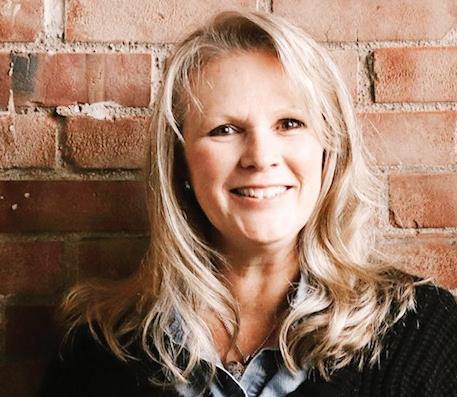
“Some people are very angry and they say ‘I-am-not-a-victim; I’m a survivor.’ Or they start crying because it’s the first time they’ve talked about it, and I have to get them to a counselor right away.”
Laechelt and her husband, Wayne, are volunteers with Illinois Baptist Disaster Relief. They often serve as “blue caps” coordinating the response at com-

INSIDE: 3 pages of colorful photos and students’ stories starting on page 7
mand centers and storm damage sites. This time they were asked to come to Highland Park after the July Fourth mass shooting that left seven dead and more than 40 injured. IBDR operated childcare four days, while the Laechelts worked at the center set up by the Red Cross at the request of the FBI.
In the week following the shooting, more than 1,200 families were interviewed by law enforcement agents. Some came to share information about their experience, others came to claim the coolers, blankets, and bikes they had abandoned on the north Chicago suburb’s main street as gunfire rang out. The city shut the street down for a week afterward while detectives collected evidence.
The Illinois Baptist staff
Editor - Eric Reed
Graphic Designer - Kris Kell
Contributing Editor - Lisa Misner
Copy Editor - Leah Honnen
Team Leader - Ben Jones
The general telephone number for IBSA is (217) 786-2600. For questions about subscriptions, articles, or upcoming events, contact the Illinois Baptist at (217) 391-3127 or IllinoisBaptist@IBSA.org
The Illinois Baptist is seeking news from IBSA churches. E-mail us at IllinoisBaptist@IBSA.org to tell us about special events and new ministry staff.

POSTMASTER: The Illinois Baptist is owned and published every month by the Illinois Baptist State Association, 3085 Stevenson Drive, Springfield, Illinois 62703-4440. Subscriptions are free to Illinois Baptists. Subscribe online at IBSA.org.

The BIG Baptist family album
Our Illinois mission field
Jacob Lee and his family have recently moved from Arizona to Illinois to plant a Korean congregation in partnership with Cornerstone Church in Savoy. Their story is one of four told during the Mission Illinois Offering and Week of Prayer, Sept. 11-18. Watch it at MissionIllinois.org.

Pray the news: Ending gun violence

Chicago pastor T.J. Grooms (page 4) says the gun violence in America is closer to all of us than we may realize. He connects this tragedy to the need for more workers in the harvest field. Pray for a gospel movement that saves souls and also brings an end to bloodshed.
Cooperative Program at work
IMB missionary Travis Burkhalter baptized Sarah, the first person in the Embera tribe believed to have followed Christ. Burkhalter and his wife, Beth, journeyed to Columbia and began sharing with the unreached people group three years ago. Sharing the gospel was not easy, because the tribe has a difficult, but unwritten language. Members of the tribe stood on rocks nearby as Sarah was baptized in a river

Giving by IBSA churches as of 07/15/22 $2,887,032
Budget Goal: $3,338,468
Received to date in 2021: $3,165,414
2022Goal: $6.2 Million
NATE ADAMSWhy we’re here
Aconsultant assisting IBSA with strategic planning recently challenged us with this question: “Why does Illinois need a Southern Baptist brand of disciple?”
He wasn’t downplaying the Great Commission nor disparaging Southern Baptists. He was making the point that there are many other Christian groups in Illinois, in fact many other evangelical groups. Especially in a northern state like Illinois, why are Southern Baptist churches needed, and why start other Southern Baptist churches?
It’s an appropriate question as September approaches and IBSA churches are asked to pray for state missions, and to give generously through the annual Mission Illinois Offering. While we are grateful for all Christcentered, biblically faithful churches, we believe the churches of our network and the missions work we do together bring unique, valuable, and powerful benefits to the mission field of Illinois.
So as we focus on state missions during this season, here are three answers to the question, “Why does Illinois need Southern Baptists?”
1. Illinois needs Southern Baptists because we not only deliver the gospel, but teach doctrine that we believe most clearly interprets the Bible. The Baptist Faith and Message, last updated in 2000, is a surprisingly brief yet powerfully clear statement that gives trustworthy guidance in the Bible’s most central truths. Those truths still meet the most pressing needs of our world today.
Some people think that all Christians believe the same things or interpret the Bible the same way. But Baptists hold to unique and important beliefs about the authority of the Bible and the autonomy, leadership, and ordinances of the local church. We believe differently than some other Christian groups about how salvation takes place, and whether it lasts or can be lost. Baptists have increasingly countercultural beliefs about gender, sexuality, marriage, and the sanctity of life. Pastors trained in SBC schools and church members being discipled with SBC resources can be confident that they are building their lives on a clear understanding of God’s unchanging Word.
3 reasons Illinois needs Southern Baptists
2. Illinois needs Southern Baptists because disciples and churches here are launching pads for sending the gospel everywhere. Each year, thousands of new believers profess faith in Christ through Illinois Baptist Churches. New church plants often lead the way in the ratio of new believers to church members. Many of these hear the gospel because our network provides training, resources, strategies, or events for intentional evangelism.
Our national SBC mission boards then facilitate volunteer participation alongside thousands of career missionaries in evangelistic missions and church planting. Just think how challenging and slow worldwide mission work would be if each church had to attempt it on its own.
3. Illinois needs Southern Baptists because we are a unique gift as a people. Many, though certainly not all, of us have some background in southern culture, and that often translates to a wonderful warmth and friendliness in church culture, not to mention some pretty good cooking. Many of us grew up learning the Bible and loving missions, and that heart for the Lord and for the lost helps turn our churches inside out into our communities. Our churches have grown diverse in their ethnicities, music preferences, geographies, and sizes, equipping us to reach many different kinds of people. Each church is a missionary!
Southern Baptists are not perfect by a long stretch. But when we are at our best, our Illinois churches and the disciples they are making are loving and unique gifts from God to more than eight million lost people here. And when we give our gifts through the Mission Illinois Offering, it helps us give more of ourselves and our resources to more of them.
Nate Adams is executive director of the Illinois Baptist State Association. Respond at IllinoisBaptist@IBSA.org.

Poll questions pro-choice numbers
Springfield | Marches in large cities have resumed, including this one (above) in Springfield July 9, but the protests are mostly by people angered by the overturning of legalized abortion on the federal level. Pro-life demonstrations are more likely outside abortion clinics. The rallies raise the question: How pro-choice is Illinois?

Gov. J. B. Pritzker said, “The majority of people in the state of Illinois are prochoice,” as he announced plans for a special session of the General Assembly to strengthen already liberal abortion laws in Illinois. But a new poll of Illinois voters shows they may not be as “progressive” on the issues as purported.

According to a poll taken by Chicago-based Ogden & Fry, Illinois voters differ on what makes them pro-choice or pro-life and on what limits there should be on abortion. FOX Chicago reported the poll found 22% of Illinois voters favor no restrictions on abortion, calling themselves 100% pro-choice, while 40% say they are pro-choice but support some limits; 24% say they are pro-life with some limits, and 14% say they are 100% pro-life, with no limits.
The U.S. Supreme Court’s ruling overturning Roe v. Wade returned the legality of abortion to the states for the people to decide. That’s why Tim Moore, president of Springfield Right to Life, said it’s important for voters to think strategically at the voting booth. This includes not only finding
out the candidates’ views on abortion at the state senate and house levels, Moore said, “but as they’re coming up through the park board and the school board. Those [offices] are the steppingstones.”

The remainder of the survey’s findings seem to bear out Moore’s thinking. When asked about allowing time limits on abortion, in addition to the 22% who favored no limits at all, 26% said they favored abortion up to 20 weeks’ gestation, 18% said up to 12 weeks, 16% said up to 6 weeks, and 17% said never, even if a mother’s life were in danger.
These views on a timetable for acceptable abortions stand in contrast with the Illinois Reproductive Health Act passed in 2019, which sets as its standard for abortion as up until viability. However, it does allow, at the medical provider’s discretion, for abortions to be performed up until birth if the mother’s health is in distress.
The Act defines health as including not only the patient’s physical condition, but emotional and psychological conditions as well. But there are no other legal standards or regulations in place to serve as a guide for that determination making abortion in Illinois legal up until birth.
Illinoisans, by a wide margin, do not support taxpayer funding of abortions: 56% said no, 28% yes, and 17% unsure. And the survey found 78% of voters favored notification of a minor’s parent or guardian, but the Parental Notification Law was repealed June 1.



Daughters honored Church grieves after tragic accident
Carlyle | Two teenage daughters of an Illinois Baptist pastor and the pastor’s sister died in a head-on collision with a tractor-trailer near Beckemeyer in Clinton County on July 8. The girls, Savanna Grace Broughton, 17, and Brooke-Lynn Kay Broughton, 15, are the daughters of Scott and Amanda Broughton. He is the pastor of First Baptist Church of Carlyle. The girls’ aunt who also died in the crash was Rhonda Evans of Ackerman, Mississippi.
Local authorities reported the car the girls were in crossed the center line on Old Highway 50 and collided with the tractor-trailer. The truck driver received only minor injuries.
A vigil was held at Carlyle High School on the evening of the accident. Funeral services were held July 11 at First Baptist Church of Carlyle.
Social media was flooded with condolences for the family and the church and fond remembrances of the girls from church members, classmates, and the community. Even the staff at the local Dairy Queen recalled their characteristic kindness and smiles.
SAVANNA BROUGHTON BROOKE-LYNN BROUGHTONBoth girls were active in the church’s worship ministry. Savanna would have been a senior at Carlyle High School in the fall. She served as Student Council President, was a member of the homecoming court, and was a reporter for the high school’s chapter of FFA. She had a passion for mission work and served at homeless and women’s shelters.
Brooke-Lynn played tenor sax in the high school band and was a member of the color guard. She loved art and painting.

Savanna and Brooke-Lynn are survived by their parents, siblings Mary Kathryn and Emerson Keeton Broughton; and their maternal grandparents. Memorials were suggested in honor of the girls’ interests to the Carlyle High School Class of 2023 and the Carlyle High School Band.
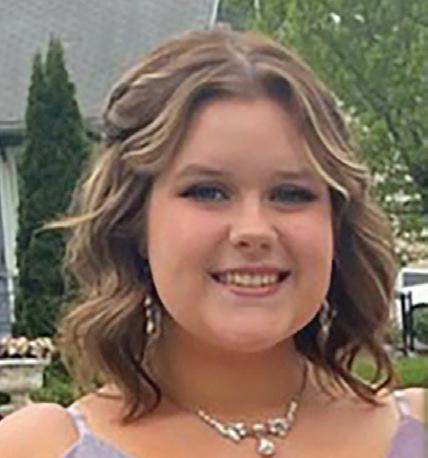
From the front: july fourth shooting

Continued from page 1
The FBI interviews continued for two weeks, while news reports covered funerals of the seven victims and tracked hospital stays of the critically injured. Police arrested Robert Crimo, 21. No motive for the mass shooting was immediately determined.
Highland Park High School served as incident command for the survivors’ interviews. That’s where IBDR volunteers provided care for children while their parents were talking with FBI agents and Red Cross workers.
“People in the area sent all kinds of toys for the children, to give them something to play with or to hug,” Bev said.
While Wayne was connecting kids with teddy bears and survivors with “ambassadors” who helped them with interviews and accessing counseling resources, Bev managed the intake desk with a team of four. Friends she met from Northern Illinois Community Organizations Assisting in Disasters reached out because of their previous experience together. They had worked after at a mass shooting at a manufacturing facility in 2019 in west suburban Aurora where the Laechelts live.
For IBDR volunteers at the incident command and childcare centers, the work meant thirteen-hour days, and for the Laechelts, another ninety minutes each way for their commute across Chicagoland. “It’s hard work, but we know we’re supposed to be there,” Wayne said of their ministry.
“It’s a privilege when someone decides to share their story with you—they don’t have to,” Bev said.
Chicago pastor urges support to quell gun violence
CHICAGO | New Beginnings Church of Chicago Assistant Pastor T.J. Grooms ministers in Parkway Gardens, a low-income housing development where a mass shooting occurred early July 1 next door to the South Side church.
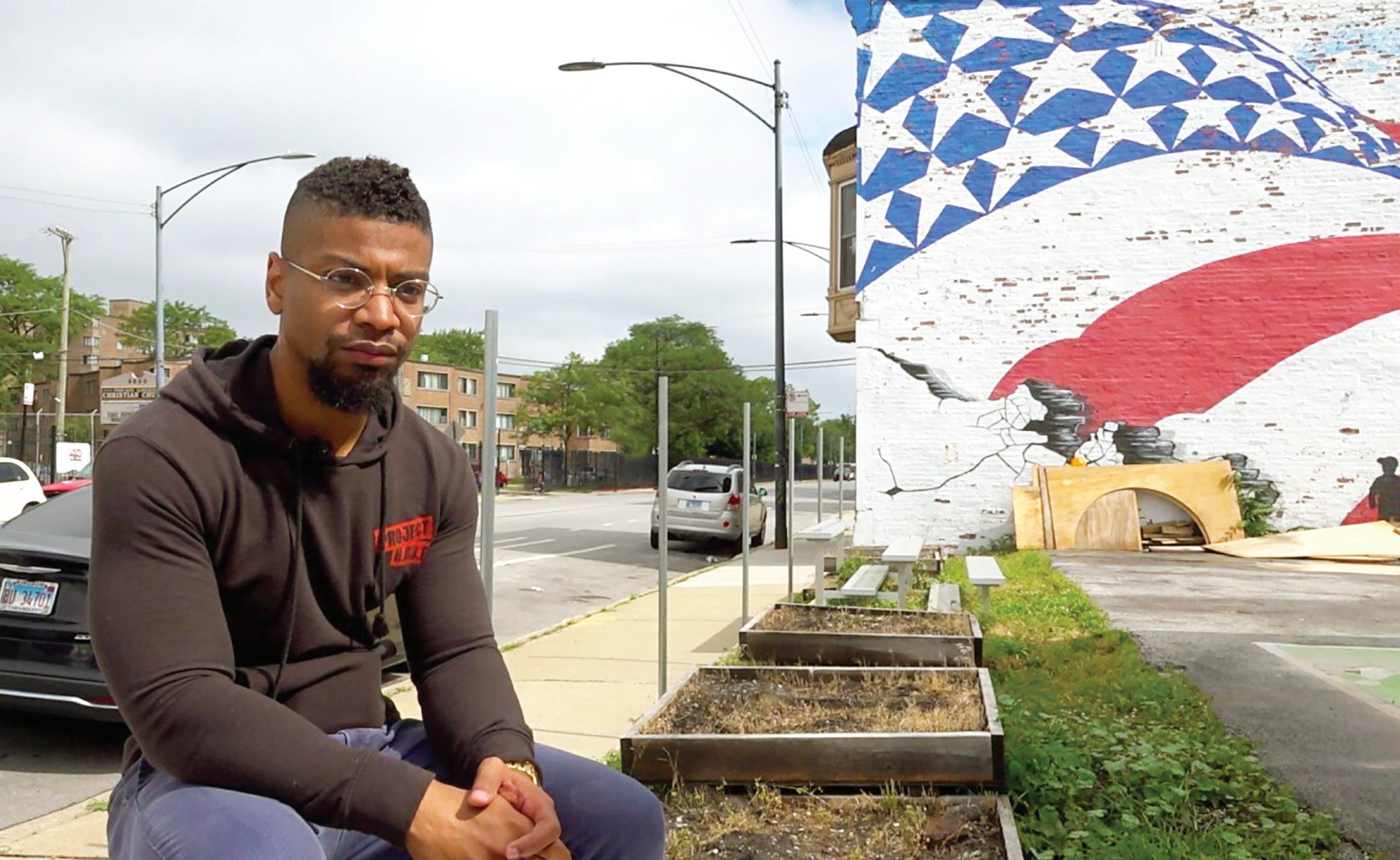
“I know everybody in that community,” Grooms said. “I knew three out of the five that were shot. It happened in the wee hours of the morning, and my phone was blowing up around 2:30 that morning.”
At least 10 people were shot dead and 62 injured across Chicago during the July fourth weekend. But the Chicago shootings, were lost in the shadow of the July Fourth mass shooting in Highland Park, a suburb 30 miles north.
Grooms doesn’t downplay the Highland Park tragedy, but encourages Americans and particularly fellow Southern Baptists to treat Chicago’s violence with as much disdain shown the violence in Highland Park.
“When they see the statistics on the internet or in the media,” Grooms said, “I don’t want them to sit back and say, ‘yeah, another one.’ I don’t want them to be completely desensitized or just see it as a statistic.
“I want them to imagine that their son or daughter that they have brought up and tried their best to steer in the right direction goes out and doesn’t come home. When you view it in that manner, you tend to help.”
young church member who died from gun violence that was gang-related.
“I had gotten to the place where (I said) this is normal, and I should never have been that way. But I got there,” he said. “But this one hit different because this one was extremely close to me. It was almost like the first time I lost somebody over again.
“There are nights where I can’t sleep. There are times my wife (Quinn) and I will sit down and talk because she’s concerned about losing people that way. There are times when I’m like, Lord, is what I’m doing even working?”
New Beginnings Senior Pastor Corey Brooks, who founded in 2011 the nonprofit community vitalization group “Project HOOD” (Helping Others Obtain Destiny), recruited Grooms to the church in 2018.
Brooks has raised $18 million toward a $35 million fundraising campaign to build a community center aimed at deterring crime and encouraging success.
Brooks brought attention to the city’s rising crime by spending 100 nights on a rooftop inviting people to visit and discuss ideas, solutions, and opportunities to curb gun violence. Later he returned to the roof.
“That’s how I’ve always looked at it with floods or tornadoes. So when these folks who survived a shooting, who are so upset, decide to share with me, it’s a blessing.”
While the rest of the state looked at the tragedy from a distance, these Illinois Baptists saw the horror of a mass shooting up close. Ministry in its wake had high and low moments.
“Seeing a young boy smiling as he wheeled his bike out the door still decorated for the Fourth of July, things like that were high moments for us,” Bev said. “But when you see the parents carrying chairs or coolers, and you see the anxiety on their faces, you know where that stuff had been—that’s a low moment.”
“Some people want their property back, others want nothing to do with it,” Wayne said. “One man wanted his hat: ‘I’m just looking for my hat.’ Why the hat? I think it’s closure. They need closure.”
The relative silence over the shootings in Chicago reflects, for Grooms, the lack of workers available to reap the plentiful harvest Jesus speaks of in Scripture.
“The harvest is always in areas where people don’t want to work,” Grooms said. “I see the marginalized of our society as harvest. I don’t see them as waste.... I see a gangbanger as a harvest. I see someone who is on the low end of the totem pole economically as a harvest.
“I believe that there are treasures that are trapped, as the Scripture says, in earthen vessels,” Grooms said. “And it is my job to do whatever I can to make sure that they realize that treasure in them. But in order for me to get to the treasure, because it’s in an earthen vessel, I got to get past their dirt.…I live by that principle.”
Grooms laments having normalized crime in the area himself until he had to bury a
“Violence is like cancer: You can see it spreading,” Brooks said. “When you don’t deal with the violence, when you don’t handle it as you should, it continues to escalate not only here but in Memphis, St. Louis, New Orleans, San Francisco.…You have to intervene in people’s lives before they start down a pathway toward destruction.”
Grooms encourages Southern Baptists not only to pray but also to conduct and support similar ministries to deter gun violence.
Every church has an opportunity to minister to underserved communities that are near them or within driving distance.
“It may not be as bad, but there is a form of it that’s happening in your area,” Grooms said. “I would say this to the church: Be the church. You cannot change what you fear. If you are afraid to touch them, if you are afraid to talk to them, if you are afraid to be around them, you can’t change them. You can’t be the change for them.
“Don’t fear them. Be the change.”
‘Be the change’– Eric Reed T.J. GROOMS – Diana Chandler, Baptist Press, photo from Fox News HIGHLAND PARK STRONG – As investigators reopened the parade route a week later, residents brought flowers to a makeshift memorial for the seven people who died on July Fourth.
Lifeway targets frontier states
Mandrell brings his Illinois roots to bear on new products
Illinois native and Lifeway head Ben Mandrell shared the organization’s desire to partner with churches around the globe, including those who have felt underserved. After noting the challenges of leading Lifeway during his first three years as president, Mandrell said he believes the organization’s vision is crystallizing. “We are expanding the boundaries beyond the Southeast portion of the U.S.,” he said. “We have a vision for serving churches everywhere.”
Mandrell showed messengers at the Anaheim SBC Annual meeting a map of the United States, with counties colored corresponding to the most populous religious group living there. Southern Baptists are primarily in the Southeast. In 2013, he and his wife, Lynley, saw this map, and it moved them—literally. “We resigned a large church in west Tennessee and moved our kids 1,000 miles west to Denver, Colorado to plant a church.”
After establishing the church, raising up leaders and moving into a new building, Mandrell said he felt called to Lifeway. “Though my family now lives in Middle Tennessee, our heart will always beat for helping church leaders who find themselves in frontier states and highly secular places,” he said.
As part of the effort to better serve churches beyond the South, Mandrell said Lifeway is working to both recruit employees

living in those areas and to develop resources designed specifically for congregations in other regions.
By 2027, Lifeway employees will likely be evenly distributed between those living in the Nashville area and those living outside Middle Tennessee. The organization is “drawing writers, editors, graphic designers and software developers from across the country and world,” Mandrell said. “They are staying in their local churches, which is what we want, so that our products begin to feel more versatile. We are moving from a Nashville mindset to a national mindset.”
To that end, Mandrell announced a new next generation curriculum line to be completed next fall, which will give churches an added option alongside Lifeway’s current curriculum lines: Bible Studies for Life, Explore the Bible, The Gospel Project, and YOU.
– excerpted from Baptist Press
Vacation Bible School sparks creativity
2023 theme revealed
The VBS for next year is based on a fictional game, “Twists and Turns.” The theme was announced just ahead of the SBC meeting in Anaheim. “Spin the spinner, beat the clock, skip ahead, level up, and play to win!” Lifeway advertised in the big reveal. The game theme is used to teach five key statements about Jesus, starting with his holiness and concluding that “Jesus came for everyone.” One-quarter of all baptisms in the SBC result from VBS.
VBS soundtrack tops charts
The “Spark Studios” VBS soundtrack reached the No. 1 spot on Apple Music’s Top 100 Children’s Music Albums chart in June. And the album reached No. 63 among all albums in recent weeks.

The album’s popularity proves that “VBS is returning in full force across the country” after a gap of two years due to the pandemic, said Lifeway’s VBS and kids ministry specialist Melita Thomas.

Music is an intentional part of the VBS strategy, Thomas said. “You’ll find the daily Bible verses embedded in the daily songs and the theme song often includes the theme verse in its entirety, which makes it easy for kids to memorize.”
SBC in the Midwest
Midwestern has record enrollment
Reflecting on God’s faithfulness to the seminary over the past decade, Midwestern Seminary President Jason Allen said the school has continued to experience record enrollment growth due to their “For the Church” vision and the support of the convention of churches.
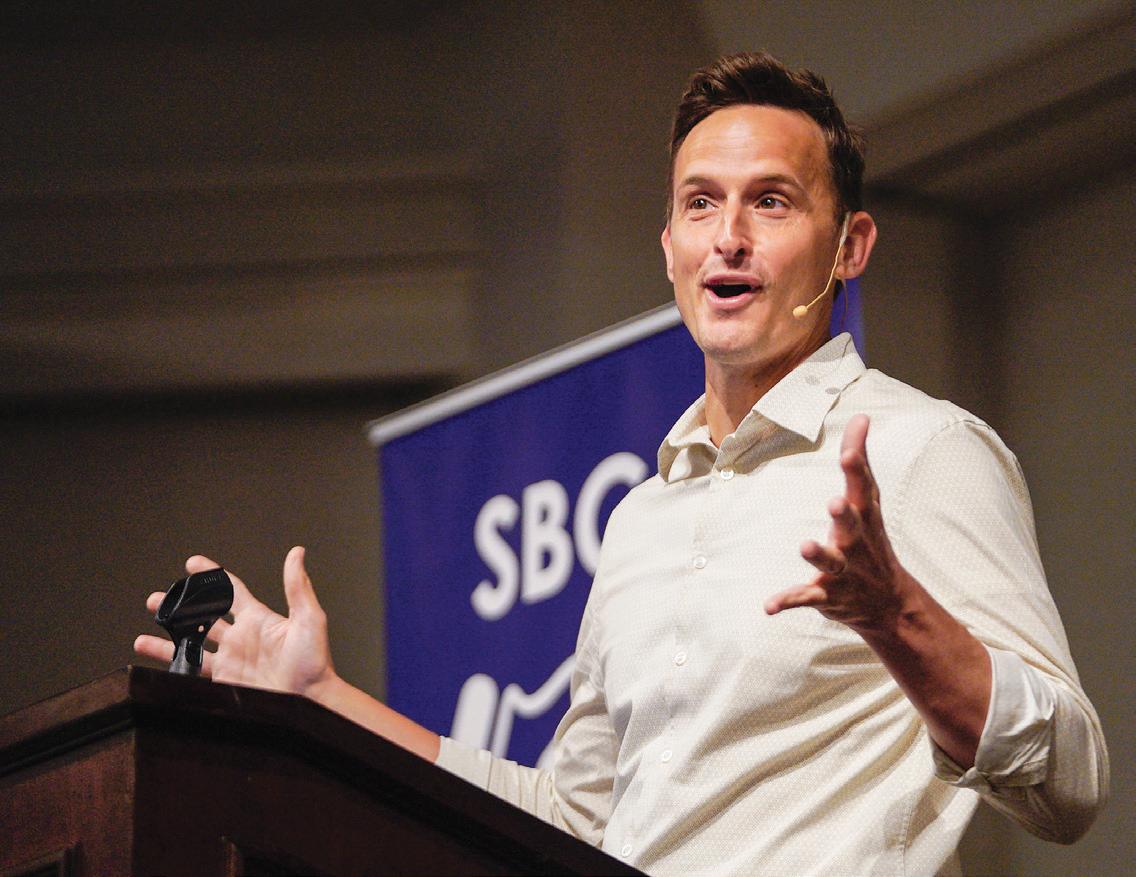
“I am delighted to share that as we close this academic year, our total enrollment will finish right around 5,000 students, a significant increase from the enrollment of approximately 1,000 I inherited when I became president,” Allen said in his report to messengers at the Southern Baptist Convention in Anaheim. “I believe our continued growth is a testament to the belief you all have in your seminary in Kansas City.”
He continued, “Our enrollment includes students from all 50 states and over 60 countries including Belarus, China, Colombia, Cuba, Georgia, Kazakhstan, Mongolia, Pakistan, North Korea, Taiwan, Russia, Turkey, and Ukraine.”
“Within all of the global work we are called to do, know that we do all this work on your behalf, and it all emanates from Kansas City,” Allen said.
Mohler marks 30 years at Southern

Al Mohler, who began as Southern Seminary president in 1993, said the message to Southern Baptist churches remains unchanged from those early days. Southern Seminary continues to set annual records in enrollment, graduates, and finances, Mohler said, a tribute to the perseverance in faithfulness of local congregations.
Mohler pointed out with sadness that several evangelical schools are struggling at the moment, but none of the six seminary presidents delivering reports to the messengers at this year’s annual meeting were talking about crisis or downgrade.
“It is because of the strength of the Southern Baptist Convention which means it is the strength of our churches that we are able to come to you and say we are at peak efficiency, and we are at peak enrollment,” he said.
“The Lord is blessing beyond anything we could imagine and at Southern Seminary we’re looking at over 6,000 students this year, sending out over 700 graduates. But I just want to tell you, it’s not about the greatness of the institution, it is about the faithfulness of Christ and his churches in all of that.” Mohler urged continued fidelity to the gospel. “I want to encourage you as churches of the SBC. It is abundantly clear that we must be, as a convention, and as the institutions of this Convention, following the same admonition that the apostle Paul gave Timothy and it’s now up to us, even as a convention and as the churches of this convention to continue in what we have learned and have firmly believed.”
– excerpted from Baptist Press
IBSA affiliation notice
Churches wishing to apply for affiliation with the Illinois Baptist State Association must submit an application for membership by September 20.
To request an affiliation packet, visit www.IBSA.org/membership. For more information, contact Barb Troeger at (217) 391-3107 or email BarbTroeger@IBSA.org.

Coach wins prayer suit
The U.S. Supreme Court ruled in favor of a high school football coach in Bremer, Washington who lost his job because he knelt to pray on the field after each game. Some parents claimed their sons felt pressured to join him. But in a 6-3 ruling, the Court said the local school board violated coach Joseph Kennedy’s First Amendment rights. The opinion said the board had “a mistaken view that it had a duty to ferret out and suppress religious observances even as it allows comparable secular speech.”

The Ninth Circuit Court of Appeals in San Francisco had twice ruled against Kennedy. The SBC’s Ethics and Religious Liberty Commission joined three amicus briefs in support of Kennedy during the proceedings.
“An individual employed by a school does not forfeit his or her constitutional right to free expression simply by entering ‘the schoolhouse gate’ or, as it were in this case, the field of play,” ERLC said after the victory. – info from Baptist Press
Christian students’ speech rights upheld

A judge issued a temporary block to a university policy that censored three Christian students who had expressed opposition to same-sex marriage on religious grounds.
Students Peter Perlot, Mark Miller, and Ryan Alexander sued the University of Idaho over a policy in which they were barred from talking with a student about same-sex marriage.
“Some may disagree with Plaintiffs’ religious beliefs,” the judge wrote.
“Such is each person’s prerogative and right. But none should disagree that Plaintiffs have a right to express their religious beliefs without fear of retribution. The Constitution makes that clear.”
The Alliance Defending Freedom, a law firm (and IBSA ministry partner), helped to represent the three plaintiffs. “Peter, Mark, and Ryan are guaranteed the freedom under the First Amendment to discuss their faith on campus, just like every other student and faculty member,” said ADF Legal Counsel Mathew Hoffmann.
– excerpted from Christian Post
American pride declines
Lee Greenwood sang he was “proud to be an American,” but the numbers who join him in that sentiment today are declining. Down 20 points from a decade ago, only 38% of adults surveyed said they were “extremely proud.” But it’s a matter of degrees: 27% were “very proud” and 22% were “moderately proud.” Republicans were more likely than Democrats to express extreme pride in their citizenship (58% to 28%), and men more so than women (72% to 60%).
– from Gallup Poll (June 1-20, 2022)
reporter’s notebook In the world? What of it.
The Southern Baptist Convention in Anaheim may have appeared to some to be as laid back as its California location, but in that book/cover dichotomy, you can’t judge the tenor of the meeting by what’s happening on the outside.

“Outside of the convention hall, Southern Baptists greeted old friends, ate at food trucks and listened to worship music from students at California Baptist University while sitting under palm trees,” Bob Smietana reported for Religion News Service. “Unlike the previous year’s meeting in Nashville, where street preachers with bullhorns criticized Southern Baptists for being too ‘liberal’ and spew(ed) angry rhetoric, the mood was festive.
“A group of street preachers showed up on Sunday ahead of the pastors’ conference but gave up after their bullhorns were drowned out by worship music,” Smietana wrote.
negotiate with people who hate Christ, hate God, hate the Bible?”
The counterpoint to his point came two days later during a convention business session. News broke a week earlier that Guidepost Solutions had expressed support for LGBTQ rights at the start of “Pride Month.” Calls came from several quarters to break ties with the company that conducted the independent investigation into the handling of abuse claims by the SBC Executive Committee. Their report was already complete, but some feared the report and its proposed reforms would be tainted.
The reforms passed overwhelmingly. But later, EC Chair Rolland Slade called on one of the EC’s interim attorneys to speak from the floor.
But the real measure of the tension in the convention wasn’t on the streets. It was in the elections, the floor debate, and even more so in some meetings prior to the annual meeting itself. Abuse reform and the roles of women in church leadership were prominent issues, but the theme running under it all was the relationship of Southern Baptists to the world. We are in it, but are we of it?
And as some seemed to ask, do we even have to be in it?
While the Pastors’ Conference was meeting at the Convention Center, about 1,000 people attended a meeting of the two-year-old Conservative Baptist Network (CBN) with headliner John MacArthur. “I think you’re my people.… I think the things that concern you are the things that concern me,” the pastor of the independent Grace Community Church in Sun Valley, California told those present.
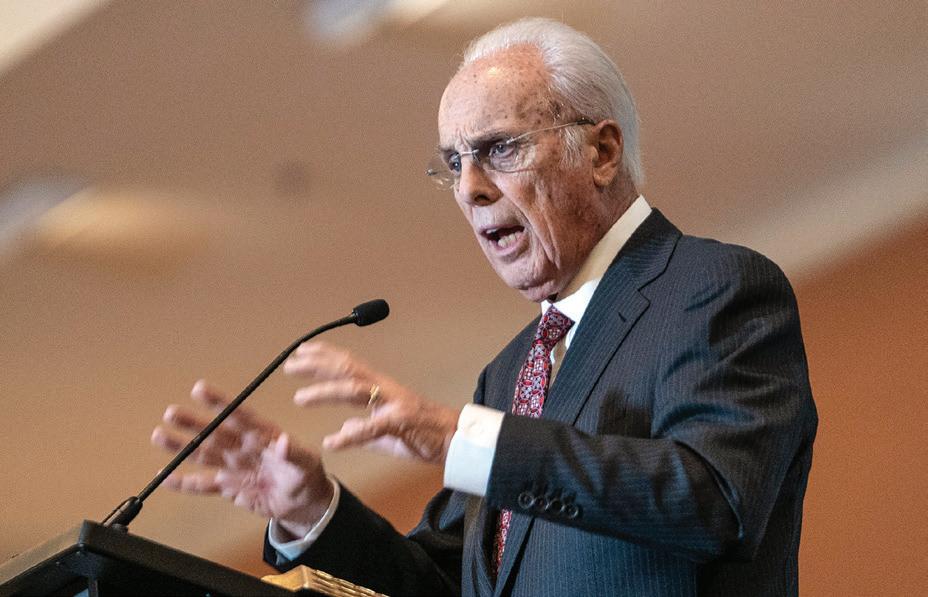
As reported by the Washington Post, MacArthur charged, “We have one day for Memorial Day then thirty for homosexual perversion. This is neopaganism…. It’s over. This country, the West, our country has fallen….They offer us nothing.”
The crowd applauded when MacArthur told how his church defied California orders to close at the onset of Covid. “I have no interest in taking orders from the political powers of the kingdom of darkness. I couldn’t care less what the federal government or state government says, I have Christ as the Lord of the Church. You can tell us to shut down our church and we’ll stay open,” he said.
CBN’s candidates for SBC President, First Vice President, and Pastors’ Conference President all lost their elections, but MacArthur scored with his exhortation. “Don’t compromise. How can you
“I wholeheartedly appreciate the pastors in this room,” Scarlett Nokes said, citing in particular pastors from her SBC church in Tennessee who were standing with her. “There’s no doubt these godly men and so many other men and women have made a profound impact on my life and my faith. But those of us working in corporate America are also making an impact,” she said.
Nokes said she and fellow attorney Gene Besen have suffered character attacks because of the stance their employer, the Bradley law firm, takes on LGBTQ issues. Similar to the revelation about Guidepost Solutions, Bradley’s position was reported in February.
The soft-spoken Nokes refuted calls to replace the law firm and defended her personal choice to work for them. “We are serving where we are. I am serving where I am. Our places are a mission field,” Nokes said.
The complicated legal issues surrounding abuse “are varied and complex, and they are coming with a vengeance…. They require a specific set of skills,” Nokes said. “God has given me certain opportunities, skills and abilities to be of service to his people during this season.
“I ask myself and every one of you: How does the gospel advance if we insulate ourselves from the world entirely?” she said. “If we’re to be the light of the world referenced in Matthew 5, we have to be in the world, not surrounded by like-minded Christians and Southern Baptists all the time.”
Nokes received a standing ovation—from more than half the room.
“I am not praying that you take them out of the world but that you protect them from the evil one…. As you sent me into the world, I also have sent them into the world” (John 17:15, 18).
Eric Reed is editor of Illinois Baptist media.
The issue in Southern Baptist life may be less about ‘drift’ and more about ‘place.’
IN FOCUS
Launching leaders
Eager students and long-time teachers prioritize discipleship at IBSA’s Super Summer
BY MEREDITH FLYNNo you want help?” Becky Byars says as she steps toward the nervous seventh grader. The student has just been called on to pray out loud in front of her purple school peers, the youngest group at IBSA’s Super Summer discipleship week.
Byars, a leader from First Baptist Church in McLeansboro, supplies the first line of a prayer and the teen takes over from there, boosted by the assist. Across the HannibalLaGrange University campus, 175 Super Summer students experience this mix of challenge and encouragement, independence and guidance.
The week isn’t billed as a traditional camp. Instead, the focus is on discipleship, leadership, and growing deeper as a follower of Christ. Students are grouped by age into color-coded schools, each with a different focus for the week—salvation, identity,
community, apologetics, kingdom living, foundational beliefs, and outreach.
Pipeline “D
“We’re pressing hard to get them step into leadership and ministry, whatever it might be,” said Lonnie Trembly, dean of the blue school for incoming freshmen. Trembly retired this summer after 14 years as student pastor at First Baptist Church in Columbia. But he isn’t ruling out a return to Super Summer, where he has served every year since 1997.
“I think all the leadership that comes here has been coming here for years, as much as they can make it, because of the results that we see,” he said. Trembly’s voice breaks when he talks about how many students he’s known over the years whose lives have changed because of this week.
“Super Summer put them in the right place.”
Super Summer is not camp. This annual weeklong event for teens includes some fun, but don’t call it camp. It’s a spiritual growth pipeline that turns students into disciples, and disciples into leaders.

Training ground
Trembly doesn’t shy away from challenging students. On mission trips, students are expected to lead devotions and are ready to share their faith. At Super Summer, he starts school sessions by asking a few students to share their personal testimonies.

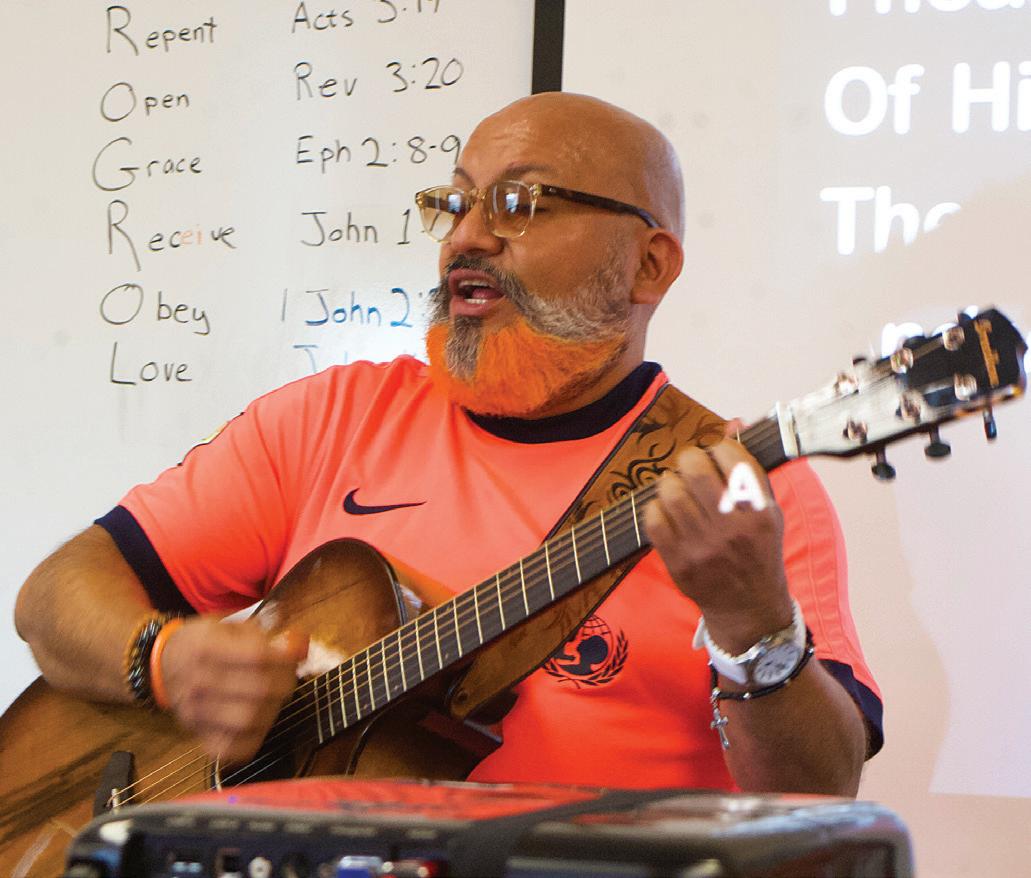
“I don’t believe in teenagers,” he said. “I believe in adults-in-training.” Expectations are high during this discipleship week, with several leaders over the years echoing a similar refrain: students aren’t the future of the church. They’re the church right now.
“We ask them to unplug from the world and, as a Christian, go deep,” Trembly said. “Put aside everything that’s possible to put aside. Do everything you can to hold onto Christ, for the sake of your own soul.” Super Summer is designed for students who are already growing in their faith, but for some, Trembly said, it’s the first step. “We see a lot of kids that come to salvation because they’re good church kids, they’ve got all the answers, but the Holy Spirit of God has never lit them up.”
In purple school, Trembly’s son, Matt, is leading the youngest Super Summer participants in learning the basics of the Christian faith. The progression from school to school is designed to help students build onto a firm foundation, said Matt, who has been part of Super Summer as many years as his dad.

“Super Summer is about discipleship. It’s not your typical summer camp where


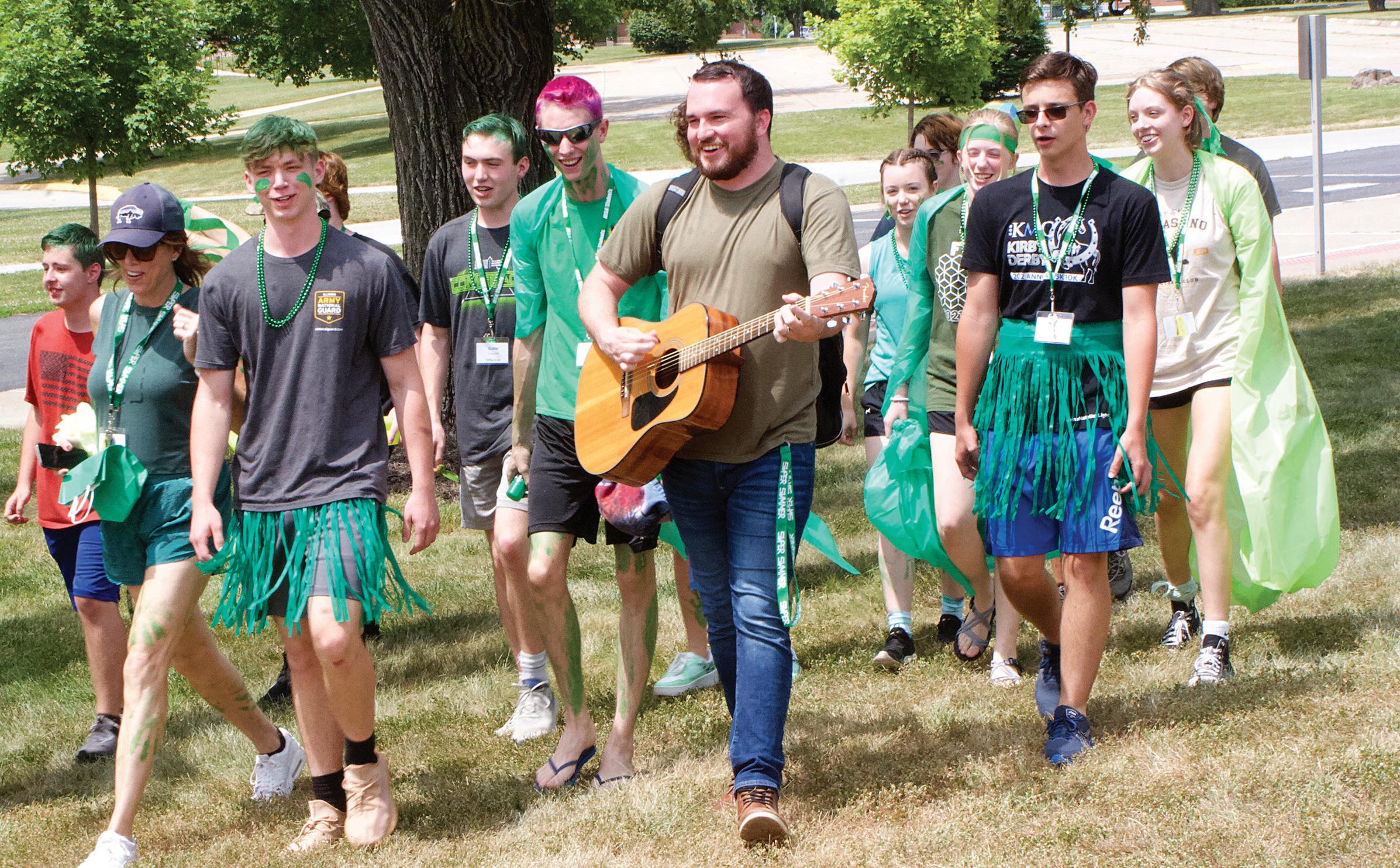
you go canoeing and swim in the lake and have worship services at night so you can check off the church box.” In addition to twice-daily school sessions, students choose “intensives” on topics including reading the Bible, biblical manhood and womanhood, and intro to guitar.
“It’s an intensive discipleship week, and we don’t just spend time talking at students,” said the younger Trembly, who takes time off from his IT job to serve at Super Summer. “We’re involving them and challenging them.”
Down in the blue school room, students take notes while Lonnie Trembly teaches, looking up occasionally to answer the questions he asks. He gives students responsibility and expects them to be respectful, Trembly said.
“Generally, I find, they step up to the plate.”
Life-altering questions
Alexis Fromme stands in a circle of blue school students, delivering a pep talk before the upcoming all-school recreation tournament. In a few minutes, the high school freshmen she’s helped lead this week will slip and slide through a chaotic series of relay events. Right now, they listen as Super Summer veteran Fromme encourages them to do their best and be vocal with their encouragement of other teams. (It earns you extra points for the final tally.)
“I have attended Super Summer every single year since I could!” said Fromme,
an engineer and student ministry leader from First Baptist in Bethalto. There wasn’t a purple school when she started but she worked her way through the others—red, blue, orange, yellow, and green—until ending up in the grey school led by Phil Nelson, pastor of Lakeland Baptist Church in Carbondale.
That final year was pivotal, Fromme said. As Nelson reminded them this was their last year as Super Summer students, she realized she didn’t want to leave for college and fall away from her faith. Buoyed by accountability from her local church and Super Summer friends, she started the school year instead with a new commitment to read the Bible. She started writing out Scripture passages, a method suggested by one of her grey school leaders.
“God really used Phil and the other grey school leaders to motivate me to do better in my walk with Christ,” Fromme said. “It’s a true joy to be able to still serve with people who were leaders when I was a student and with those who were students with me at Super Summer.”
For some like Fromme, Super Summer is a step toward maturity in their relationship with Christ. For others, it’s the beginning.
Austin Luebbers has been attending church regularly since some friends invited him six months ago. He traveled to Hannibal for his first Super Summer with the group from FBC Columbia. Luebbers was a student in grey school, led again by Phil Nelson. He was tired during the first school session after a day of travel. But things changed when Nelson told students the main question Paul asked the Colossians: Is Jesus enough?
“That really opened up my eyes that he was enough,” Luebbers said. Through the week, the love of God in light of Luebbers’s own imperfections came more into focus, he said. And on Thursday, Luebbers approached Trembly after the group from FBC Columbia met to close out the day. They prayed together, and Luebbers decided to follow Jesus.
The young man uses the imagery of eyes being opened often when describing his week at Super Summer. Life back at home has been pretty normal, he said, except he’s looking at things with a new point of view and a new sense of accountability. Luebbers and two of his friends are commit-
ted to meet together for Bible study once a week.
“Students accept Christ at this camp,” Fromme said. “They rededicate their lives to the Lord. They realize that now is the time to become serious in their faith, and nothing is better than walking alongside them as the Holy Spirit works in their lives.”
‘God shows up’
Lindsay Wineinger wasn’t a Super Summer student in high school, but she’s long been involved in its leadership. “When you see God moving, you go,” said next year’s Super Summer director and current president of Illinois WMU.
“It’s beautiful to see kids coming in right out of sixth grade, and being with the organization long enough where I’ve seen some of my seventh and eighth graders go through all of the different school levels and graduate out, and then come back and be leaders for those schools.
“It’s a beautiful picture of what true discipleship is as well.”
As dedicated as Super Summer students are— to their schools and to the intense discipleship process found here—the commitment of its leaders is arguably even stronger. Their desire for the next generation of Christians to grow as disciples is clear. And they’re seeing real results.
“It’s not just a place for students,” said Lonnie Trembly. “I think all the leadership that comes here has been coming here for years, as much as they can make it, because of the results that we see.”
As director, Wineinger hopes to visit sixth graders at IBSA’s summer camps and share with them the opportunities coming their way to participate in Super Summer. This year’s Super Summer theme, “Influencer,” reflects that way of thinking: one generation passing down a legacy of faith to the next.
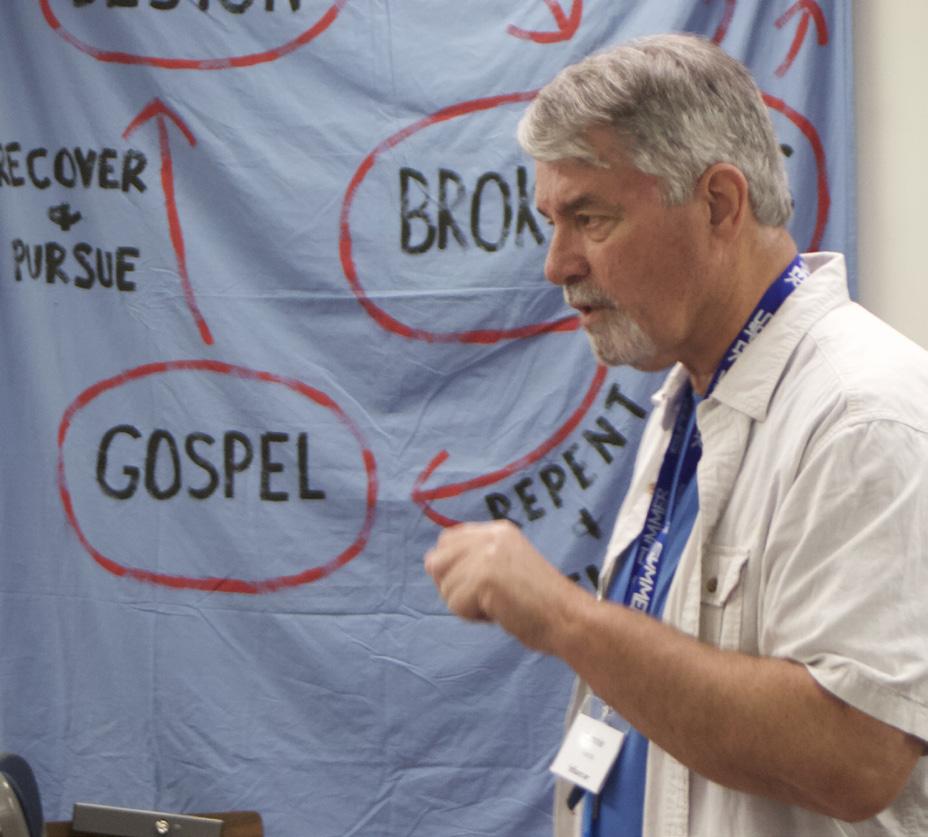
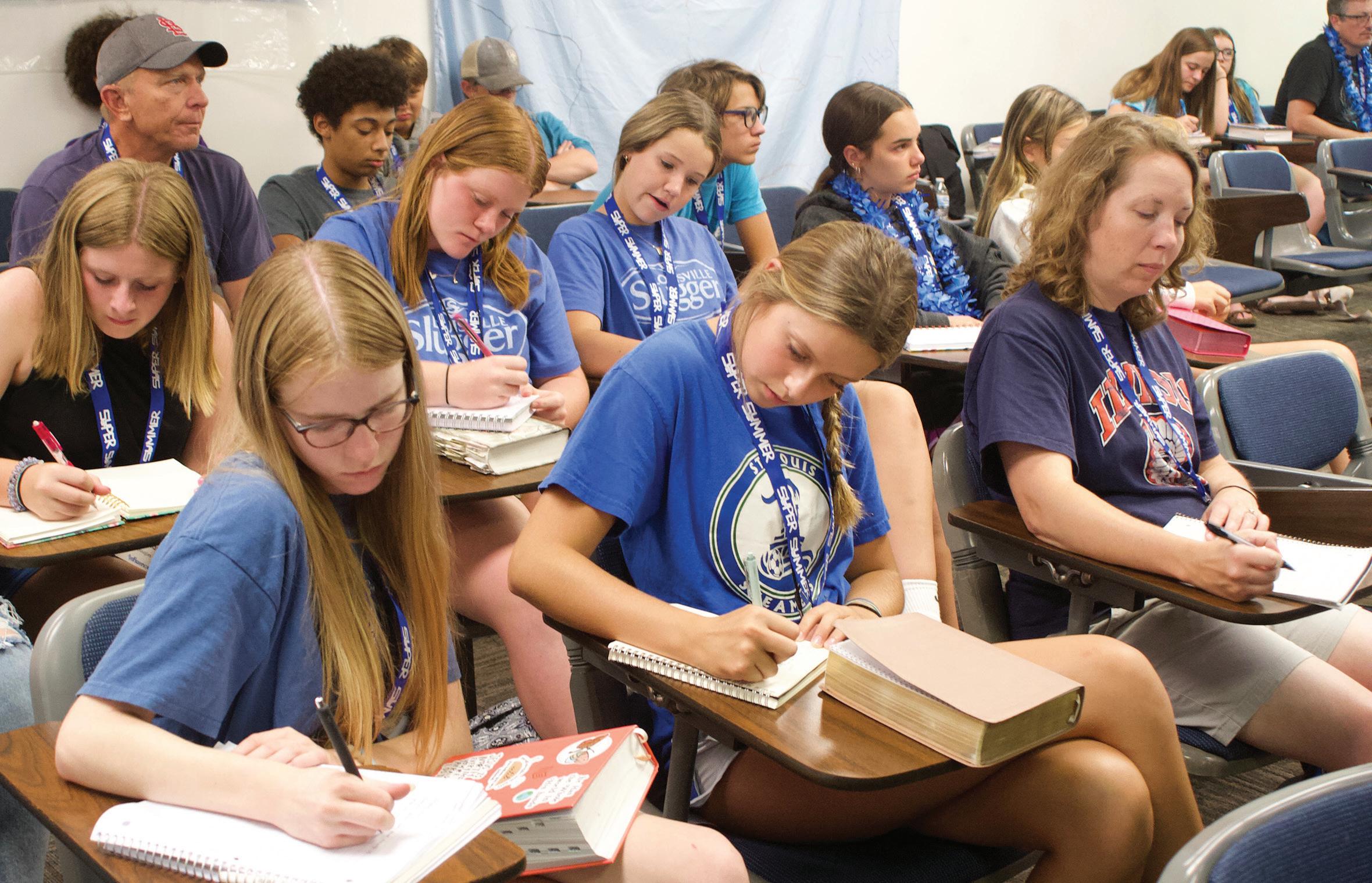


“It’s a beautiful depiction that no matter what age you are, you are an influencer of the next group,” she said. For students and leaders at Super Summer, the legacy is one of God at work. He goes above and beyond every year, she said, from students who aren’t expecting to have their lives changed, to long-time leaders who say this was the best year yet.
“God shows up in big ways, and I think a lot of us come back because we just get so excited for
“No matter what age you are, you are an influencer of the next group.”
– Lindsay WineingerLIFE LESSONS – Lonnie Trembly has served at Super Summer since 1997. Here he teaches the 3 Circles method of faith sharing.
157,690
reasons to support
THE cooperative program • 2ND quarter report • jan. 1 - JUNE 30, 2022
This report includes contributions received by the Illinois Baptist State Association through the second quarter of 2022. For questions about this report, contact the IBSA Church Cooperation Team at (217) 391-3106, email JeffDeasy@IBSA.org, or write to P.O. Box 19247, Springfield, IL 62794-9247.
1. Cooperative Program works.
In nearly 100 years, Southern Baptists have given $20 billion to missions through CP.

2. Multiplication is powerful.
With 48,000 churches each sending a small percentage of their offerings, Southern Baptists give about $190 billion every year.
3. Missionaries need steady funding.
CP eliminates the need for fundraising trips and time away from the mission field. SBC missionaries can count on our support.
Top 100 Illinois churches in Cooperative Program support through the second quarter of 2022
First, Nashville
Bluffs, Bluffs 79.65
Cutler First, Cutler 79.54
Peru First, Peru 78.64
Du Quoin First, Du Quoin 78.39
Bethel, Bourbonnais 78.34
Cave in Rock First, Cave in Rock 78.13
Fairview Heights First, Fairview Heights 78.00
Cristo Es Rey, Bolingbrook 77.84
Twin Oaks, Sleepy Hollow 77.11
Central City, Centralia 76.66
Calvary, Monticello 76.06
Calvary, Pittsfield 75.05
Columbia First, Columbia 74.88
Erven Avenue, Streator 74.31
Royalton First, Royalton 74.24
Tabernacle, Decatur 74.00
Wisetown, Greenville 73.69
Willow Springs First, Willow Springs 73.58
Redeemer, Panama 73.11
S I Country, Makanda 70.97
Springbrook Community, Plainfield 70.65
Union Grove, Eldorado 69.26
Grace Fellowship Davis, Stillman Valley 69.16
The Lord’s Church, Naperville 68.18
Emmanuel, Sandwich 68.18
Mt Olive, Dongola 67.98
Bethlehem, Shipman 67.95
Bethel, Vandalia 67.10
Metro Community, Edwardsville 66.69
Peace Community, Chicago 66.67
Flat Rock First Missionary, Flat Rock 66.39
Washington First, Washington 65.19
Meadowridge, Zion 64.80
Indian Camp, Stonefort 64.66
Swansea, Swansea 64.44
Pelley Road Christian, Rockford 64.39
Grace Fellowship, Murphysboro 64.31
Carterville First, Carterville 63.89
Ditney Ridge, Norris City 63.75
Casey First, Casey 63.53
Ten Mile, Mc Leansboro 62.38
Grace Community Fellowship, Vandalia 62.32
Calvary, Elgin 61.69 Salem First, Salem 61.10
Cornerstone, Marion 61.09
Tinley Park First, Tinley Park 61.01
Golf Road, Des Plaines 60.57
Highland Avenue, Robinson 59.61
O’Fallon First, O Fallon 59.46
Sandy Creek, Tamms 59.27
Clarksville, Marshall 59.05
4. Cooperative Program is proven.
Replacing piecemeal giving to special causes, this unified system of funding missions founded in 1925 has a history of success.
5. Churches need leaders. CP funds theological education in six SBC seminaries. And IBSA trains pastors and church leaders in effective ministry processes.
6. The next generation is vital.
Through CP, Southern Baptists engage in ministry on college campuses. And Illinois Baptists support student ministry development and IBSA camps.
7. Lives are changed.
Our international missionaries baptized 107,000 people in 2021. And SBC churches baptized 154,701.
8. Cooperative Program is comprehensive.
With Acts 1:8 as a strategy model, CP helps every church reach every mission field intentionally, starting at home and going global.
9. Focused cooperation unites.
With our shared purpose to share Christ with the world, CP brings SBC churches together for the cause of missions and evangelism.

10. People need Jesus.
As IMB President Paul Chitwood reported at the 2022 SBC Annual Meeting, the number of people who die every day without knowing Jesus Christ as Savior is Could we need any greater reason than that? Support
157,690.

GROWING
Learning curve recommendaTions
The Beginning: First Steps for New Disciples LifeWay
This resource challenges me to read my Bible so I am better able to answer questions in the daily workbook, yet the amount of work is easily approachable. I enjoy the weekly small group because it allows different thoughts to be expressed by others working toward the same goal of growing in the knowledge of God, our King.
Engaging Generation Z: Raising the Bar in Youth Ministry

Book • Tim McKnight
Fun, high-energy events are great in youth ministry, however, our goal is to equip an army of disciples and launch them into adulthood to make a name for Jesus. The events that draw crowds can also be a distraction. McKnight gives theological and practical advice to equip and encourage families as the primary disciple maker, unleashing disciples after God’s heart.
table talk

Hard-learned lessons
Is being a pastor’s wife a blessing or a curse?
Hi! I’m Melody Westbrook and I am a recovering Pastor’s Wife. My husband and I recently resigned after 35 years of pastoring two churches. We moved from Oklahoma to Illinois in 1991 to plant a church in Edwardsville. As we departed, my identity as pastor’s wife quickly faded. I was warned about the loss of identity and the effect it would have on me. But truthfully, I was relieved. I had secretly resigned that position years prior because I was tired of the pedestal I sat upon, therefore working tirelessly to crawl down.
Why?
Well, I am confident a large part was due to my own brokenness and fear of failure that lurked deep within. I no longer wanted to live within that bubble, fighting to escape the scrutiny of others. But, if I were to be gut wrenchingly honest, I wanted to run from the scrutiny I placed on myself to be everything for everyone.
Years ago, I walked into my counselor’s office depleted and torn. I will never forget what she said: “You are an empty shell!” Being a pastor’s wife can strip you of who you are. You are tossed around like a lost sock in a dryer. You live your life to please others while you exist in the shadow of your husband.
In this existence, you survive the scrutiny of others judging your every move, not to mention what
this does to your children. You smile lovingly as you listen to others criticize how your husband shepherds. You become the vessel for others to pour in their complaints as though you are the complaint box sitting in the foyer. They complain to you hoping that you will have a come-to-Jesus conversation with your husband at the dinner table. If they can’t get to him, they will go through you.
The list of the curses is endless, but what about the blessings? Are there any?
My answer is absolutely!
What other position warrants the opportunity to sit in conversation after conversation, hearing the hurts and triumphs of the souls of women? What other life space is allowed to be witness of life change in real time? As a pastor’s wife, you are given a front row seat to the most beautiful story ever told: “Christ in me, the
The Daily Grace Co. Website
This is a hub for some pretty amazing Scripture-based Bible studies, books, podcasts and more. Their company’s tag is “Equipping disciples in the Word,” and that’s exactly what they have done in my life.
– Lindsay Wineinger Illinois WMU President
hope of glory” (Colossians 1:27).
As a pastor’s wife, you become a catalyst for change—not in your church structure or political system, but change in the precious lives that you touch. So never minimize the role you play.
Embrace it, love it, and live it!
Girls, the master is happy with you today! He is happy with your faithfulness. He is happy with your patience. He is happy with your exhaustion for the hope of his glory. He is happy for your rest, and he is happy that he created you to be exactly who he desires you to be!
March on, sister in Christ. March on!
Melody Westbrook blogs on the ministry life. She serves as mentor to women. She led breakout sessions at the 2022 IBSA Priority Women’s Conference. After 31 years as pastor of Metro Community Church in Edwardsville, her husband, Paul, joined the staff of IBSA as a leader in church planting.

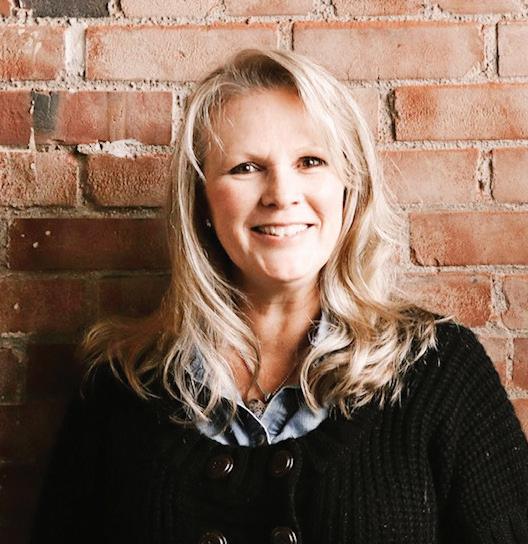
“His master replied, ‘Well done, good and faithful servant! You have been faithful with a few things; I will put you in charge of many things. Come and share your master’s happiness!”
– Matthew 25:21
Majoring on the minors
This unique gospel outreach is a winner for new Alton congregation
Alton | In addition to baseball, hot dogs, and apple pie, you might add to the list of America’s favorites this one: evangelistic outreach. Requiem Church has forged a relationship with the Alton River Dragons, a local team that is part of the Prospect League. That’s a summer collegiate level league with 16 teams in Illinois and the Midwest region. The Dragons are in their second season.
“I reached out to the General Manager this summer and asked if they wanted a chaplain,” pastor Vince Bissey said. “He said yes, and we’ve been figuring out together what that looks like, since they’ve never had one before and I’ve never been one before.”
The players come to Alton for the summer and live with host families. Requiem Church held a community outreach event in July for the team, coaches, and host families. “Our church loved the opportunity to build relationships, serve this team, and establish presence in a positive way within the community,” Bissey said.
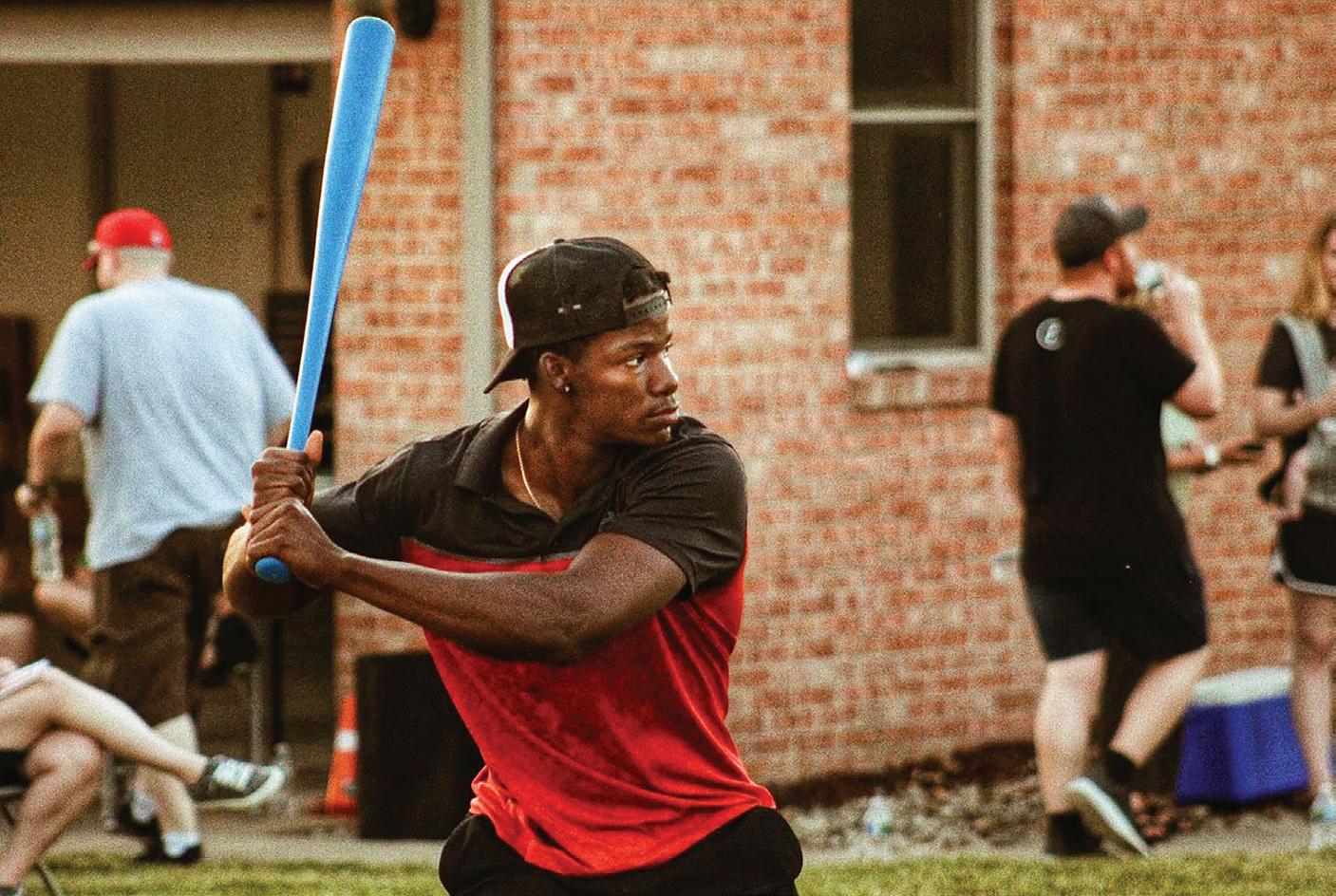

Bissey served as pastor for discipleship and development at August Gate Church in St. Louis from 2017 to 2021. At that time, he was sent to Alton to plant Requiem Church. The church launched in April 2022, and they have six core families.
The planter described a season of his life when he thought he had his life “together,” but Bissey learned he was trying to earn God’s favor through a well-ordered existence. In the basement of his seminary apartment, he called out to God—literally and loudly. “Why can’t you just love me?!”
Bissey soon found God did love him. And this “you can’t earn it” message has become central to his ministry.
“For the first time in a long time, the fear and guilt I had been living in started to give way to freedom and joy,” he said in a video introducing Requiem Church. “Instead of working for Jesus, because of the gospel I was able to come and rest in Jesus and what he had done for me.
“From that point on…the burden that God has given me has been to invite anyone who will listen to come and join me in pursuing that rest…that only Jesus can give us,” Bissey said. Requiem, he pointed out, means rest.
Bissey attempted to plant a church in Alton in 2012, but it didn’t take off. What did grow was his love for a community that he describes as both blue collar and creative, where people value “raw honesty.” Bissey (pictured right in downtown Alton) especially wants to reach young men with the gospel.
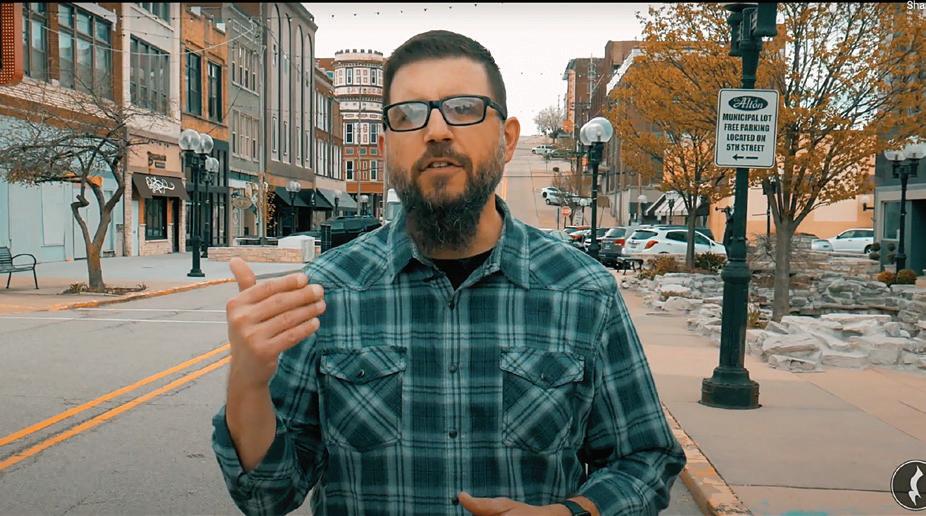
So he has taken that message to an area of 50,000 people that has a small percentage of believers, to the church’s Wednesday night services, and to new relationships through the Dragons.
One outreach event led to another, Bissey said.
The General Manager asked if Requiem would like to sponsor a game.” The sponsorship
IT’S A HIT! – The Alton River Dragons bested the Normal Cornbelters 13-2 in the July 17 game which was sponsored by Requiem Church. The new church plant reached out to coaches, players, and local families who host them during the two-month summer season. In addition to Bobblehead night at the ballpark (above), Requiem held a cookout and wiffleball game for the team (below). IBSA served as a partner.
meant exposure on screen at the ballfield to let people know the church is a local partner. “This is some really great exposure, especially because the night they gave us was bobblehead night!”
More people than usual were expected for the giveaway which featured the team’s mascot, a dragon named Dinger. And for Bissey and the church, that was homerun.


Lanny Faulkner is transition pastor at Summit Fellowship in Decatur. He brings 22 years of pastoral experience and spent 18 years as DOM/AMS for Central Baptist Association, until his resignation from that position in June. Faulkner holds degrees from Tennessee Temple University and Covington Seminary, and a Ph.D in Theological Studies from Louisiana Baptist University. He and his wife, Lin, served together until her death in 2015.
Jim Walkington retired after 21 years at Wilmington Baptist Church. He also served 13 years with the Illinois Department of Revenue and was a farmer prior to that.
First called to preach as a junior college student in Mississippi, Walkington served Illinois churches bivocationaly including Milton, Meredosia, and White Hall. Walkington and his wife, Patricia, have four sons.

with the lord
Helen Ruth Dillow, 91, wife of Don Dillow, retired IBSA director of Church Minister Relations (19851991), died May 3. Dillow actively supported her husband of more than 71 years in ministry in Texas and Illinois.

A graduate of Southern Illinois University in Carbondale, she was a librarian at Lincoln Land Community College before her retirement. A celebration of life was held May 21 at FBC McKinney, Texas.
Marjorie Ellsworth, 89, died June 22 at The Baptist Home in Ironton, Mo. A member of First Baptist Church in Fairview Heights with her husband Bill, they served in youth, music, and pastoral ministry. The couple also served as missionaries to the Sioux Nation in Pine Ridge, SD.
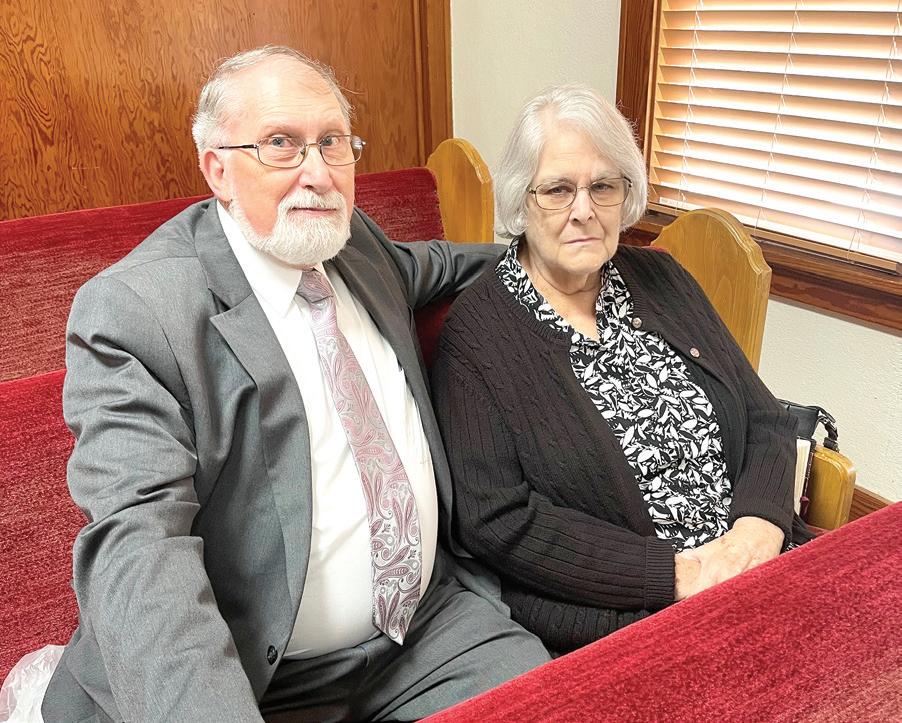
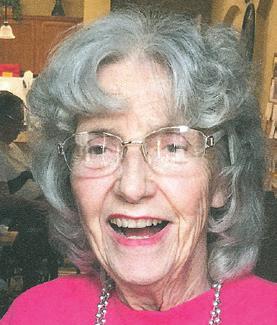

Ellsworth taught piano and had her own radio and television show. She accompanied many WMU conventions, revivals, crusades, recordings, and SBC events.
Ellsworth is survived by her brother, two daughters and their husbands, six grandchildren, and six great grandchildren. A service will be held at FBC Fairview Heights August 6. Memorials may be made to The Baptist Homes of Arcadia Valley Benevolent Fund, WMU Foundation, or FBC Fairview Heights.

Helen M. Greening, 86, retired IBSA administrative assistant from 1977 to 2001, died July 5 in Augusta, Ga. She served with the Illinois Baptist newspaper for over 23 years. At the time of her retirement, Greening said, “I’ve always enjoyed coming to work. You always hear about people who say they don’t like their jobs, but I’ve always loved mine.”
Greening was preceded in death by her husband, Vernon. She is survived by two sons, five grandchildren, and a sister. Memorial donations can be made to the Annie Armstrong Mission Fund of Curtis Baptist Church, Augusta, Ga.
Vivian B. Mosley, 94, widow of former IBSA Executive Director Earnest E. Mosely (1980-87), died April 15. Mosley supported her husband, who preceded her in death 2009, in ministry roles in Arkansas, Texas, Louisiana, Hawaii, Tennessee, Illinois, and North Carolina.
In addition to teaching preschool and kindergarten, she was a private piano teacher from 1941-2011. She is survived by three daughters, 10 grandchildren, and four great-grandchildren. A celebration of her life was held May 1 in South Carolina. Memorial gifts may be made to a church, school, or organization that supports music education.
The whole story BRIGHTER DAY
“S
o, Samson died too?”
The question hung in the air as we read a chapter in our new Bible storybook. “Well, yes,” I said, glad for the author’s intro that explained even heroes aren’t perfect. Flawed, foolish Samson died alongside his enemies. Earlier in the collection of stories told by Kevin DeYoung, the children of Israel made their own idol of gold to replace the one true God. Toward the middle, King David sinned grievously. Near the end, people desperately in need of a savior crucified the man who came to save them.
DeYoung doesn’t pull any punches or leave out the difficult stories. God’s people were and are far from perfect. Sharing their messiness is one of the trickier parts of reading Bible stories with my children. But that may be because I’ve been more focused on explaining their sin than extolling God’s power and willingness to save.
Tracker
Trends from nearby and around the world
Church: What’s in a name?
said William Shakespeare, but would a Baptist? When it comes to specific denomination on the sign out front, the name makes a difference. Denominational names are a turn-off for nearly half of American adults.
Percentage saying “this church is not for me” when they see the denomination on the name:
EVENTS
Training Nights
What: Ministry skills training including a main session and two breakouts.
Where: Various associational locations in August, September, and October

When: August 9, Emmanuel, Carlinville August 16, Tabernacle, Decatur August 23, Wayne City
Info: IBSA.org/equip for additional dates and locations
Contact: TammyButler@IBSA.org
September
Ignite Evangelism Conference
What: Sunday evening worship service (6-8 p.m.) and Monday breakout sessions (8 a.m. to noon)
Where: Various associational locations
When: 9/11-12, Marion FBC; 9/18-19, Gospel Life, Carol Steam; 9/25-26, Tabernacle, Decatur;
Info: IBSA.org/resourcecenter/evangelism
Contact: LisaHarbaugh@IBSA.org
MEREDITH FLYNN
I recently attended a conference that featured seven Old Testament salvation stories. The teachers used these biblical examples of rescue to illustrate how God has always been in the saving business, even before the spiritual concept of salvation was physically realized in the person of Jesus Christ.
Once I started thinking about God’s history of saving people, I couldn’t unsee it through Scripture. And it’s a helpful thread to pull when talking about the Bible with my daughters or reconsidering familiar stories for myself.
God rescued people who cried out to him and people who didn’t know they needed a savior; people who seem deserving and those who didn’t. And throughout a lifetime, don’t we all play each of those parts?
I have as many Samson moments as Ruth ones, some days more. God’s power to save is unchanged no matter which version of a person shows up—Moses, willing or defiant; Paul, murderous or jailed for the sake of the gospel.
DeYoung’s storybook is part of a recent movement to tell the whole story of Scripture, pointing to Christ throughout. (In fact, the collection is called “The Biggest Story Bible Storybook.”) At a time when Barna found 73% of American parents are concerned about their children’s spiritual development, it strikes me that telling the whole story, good and bad, with a focus on God’s rescue, is a step in the right direction toward a fully formed faith, for them and for me.
Meredith Day Flynn is a wife and mother of two living in Springfield. She writes on the intersection of faith, family, and current culture.
Who likes your church?
Young people have strong impressions of denominations, most of them negative. The percentage of 18-34 year olds with unfavorable impressions of these churches are:
• Catholic 39%
• So. Baptist 39%
• Lutheran 35%
• Methodist 33%
• Presbyterian 33%
In contrast, 23% of all U.S. adults reported unfavorable opinions of Baptist churches, while 18% said they were “not familiar” and 31% had favorable views.
Culture: The rush is over
87% of Protestant pastors say they have never been asked to perform a same-sex wedding, since the U.S. Supreme Court made it legal in 2015.
So, who has been asked to officiate a gay wedding?
20% of mainline pastors
7% of evangelical pastors
4% of Baptist pastors (of all denominations)
Very big bake sale
An Oregon baker sued in 2013 for refusing to bake a wedding cake for a lesbian couple will open a new shop in Montana. “I had said I was never going to open a bakery again, but God has seemed to change my heart with this,” said Melissa Klein said she discriminated against the couple, but a 2022 ruling set aside the $135,000 penalty she had been ordered to pay them.
Klein is trying to raise $50,000 online for a down payment on a restaurant building. She’s selling cookies.

neTworking
Send NetworkiNg items to IllinoisBaptist@IBSA.org
Charity Baptist Church in Carlinville seeks full-time pastor. Set in a rural community, Charity has a thriving and growing church family. Please send resumé to charitybcpastorsearch@gmail. com or 21964 Charity Church Road, Carlinville, IL.
Crossroads Community Church in Brighton seeks pastor. If you are prayerfully led by God to learn more about Crossroads, the community of Brighton, and this opportunity, email resumé to the Pastor Search Committee, vbates@ brightoncrossroads.org.
Freedom Baptist Church in Noble seeks bivocational pastor. Salary commensurate with employment hours. Send resumé to Tony Prosser, 2665 E. Calhoun Ln, Olney, IL 62450. Contact tkprosser88@gmail.com.
Rochester FBC seeks full-time senior
For more information and to submit resumé, go to www.rochesterfirstbaptist.org. The final date to apply is Aug. 15.
Zion Hill Baptist Church in Centralia bivocational pastor. Send resume to zionhillcentralia@gmail.com or to Candace Thomas, 2303 West Line Road, Centralia, IL 62801.
A rose by any other name would smell as sweet,
Illinois Baptist

Pastoring to gender fluidity

DOJ probes SBC abuse

Springfield | Some Illinois Baptist leaders expressed surprise but are hoping for a godly outcome in a federal investigation of the Southern Baptist Convention’s handling of sexual abuse claims.
“It caught me by surprise,” said Adron Robinson, an Illinois representative on the SBC Executive Committee (EC), while also urging prayer for justice. IBSA Executive Director Nate Adams said further exploration by the U.S. Department of Justice (DOJ) seemed to be a natural next step.
But observers outside the SBC and representatives of abuse survivors question whether the extensive report on abuse claims produced by Guidepost Solutions at the direction of the SBC’s Sexual Abuse Task Force (SATF) uncovered only the “tip of the iceberg.”




The DOJ probe was revealed in a statement by the EC on Aug. 12.
The EC confirmed it had received a subpoena from the Justice Department and was complying with the request for documents. The statement was signed by the heads of the EC, the Ethics and Religious Liberty Commission (ERLC), six Southern Baptist seminaries, two mission boards, Lifeway Christian Resources, and the Woman’s Missionary Union, which is an auxiliary—eleven entities in all. The leaders all pledged cooperation in the investigation, but apparently none have been contacted yet.
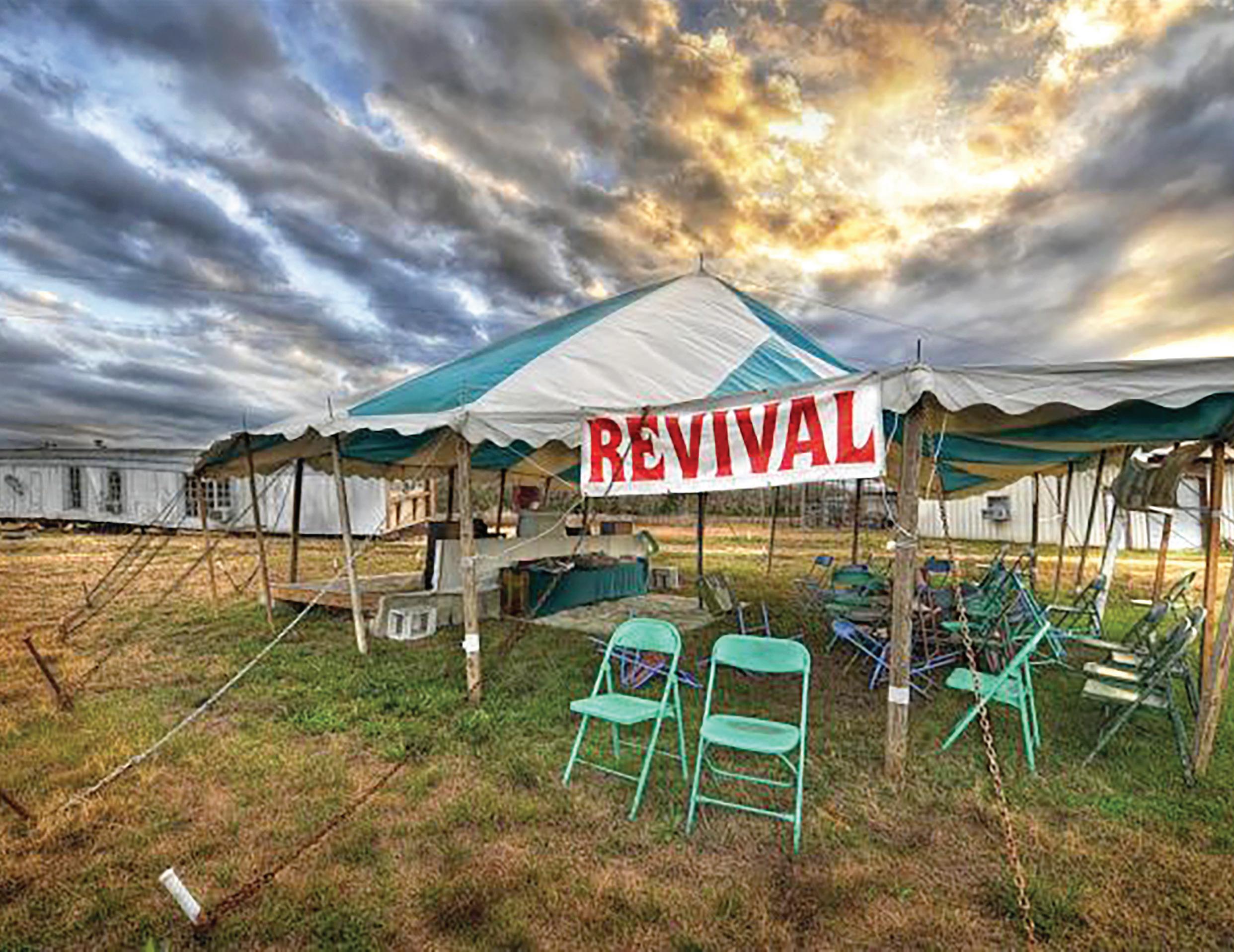
The Department of Justice would not confirm the SBC statement. “While we are aware that the SBC has made certain confirmations about this matter, the U.S. Attorney’s Office does not confirm or deny the existence of an investigation,” David Boling, a spokesperson for the U.S. Attorney’s Office for the Middle District
While
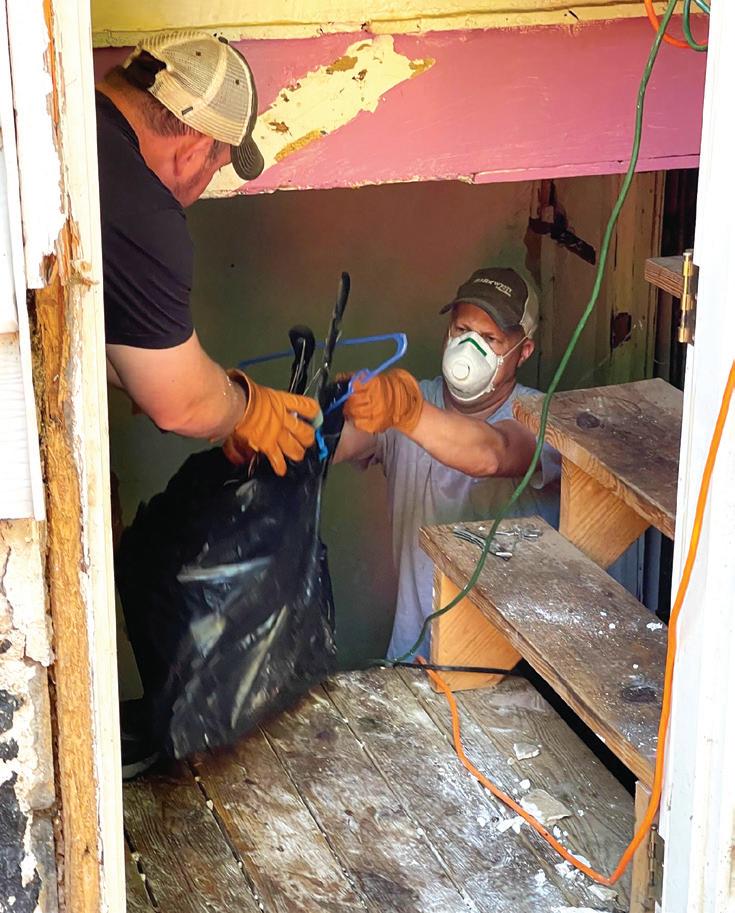
The Illinois Baptist staff
Editor - Eric Reed
Graphic Designer - Kris Kell
Contributing Editor - Lisa Misner
Copy Editor - Leah Honnen
Team Leader - Ben Jones
The general telephone number for IBSA is (217) 786-2600. For questions about subscriptions, articles, or upcoming events, contact the Illinois Baptist at (217) 391-3127 or IllinoisBaptist@IBSA.org
The Illinois Baptist is seeking news from IBSA churches. E-mail us at IllinoisBaptist@IBSA.org to tell us about special events and new ministry staff.

POSTMASTER: The Illinois Baptist is owned and published every month by the Illinois Baptist State Association, 3085 Stevenson Drive, Springfield, Illinois 62703-4440. Subscriptions are free to Illinois Baptists. Subscribe online at IBSA.org.
The BIG Baptist family album
Our Illinois mission field
Michael Campo is planting pastor for Living Word Bible Church in Lemont near Chicago. The Campos began sharing Christ with family and friends, resulting in three baptisms in four months. Michael says he is most excited about the unity of purpose in their 22 regular worship attenders.

Pray the news: Ukraine
The Butter Cow at the 2022 Illinois State Fair munched on a sunflower, a reminder of the people of Ukraine. Pray for those still in the war-torn country, refugees in neighboring countries, and SBC missionaries ministering to them.

(See related story on page 11.)
Cooperative Program at work
Longtime medical missionaries Doug and Cheryl Derbyshire work at the Bangkla Baptist Clinic in Thailand. Doug (above, left with a patient) says medical care is “a remarkable bridge” to the gospel. The Derbyshires hold mobile clinics across the country, opening doors in places where there are no Christians.
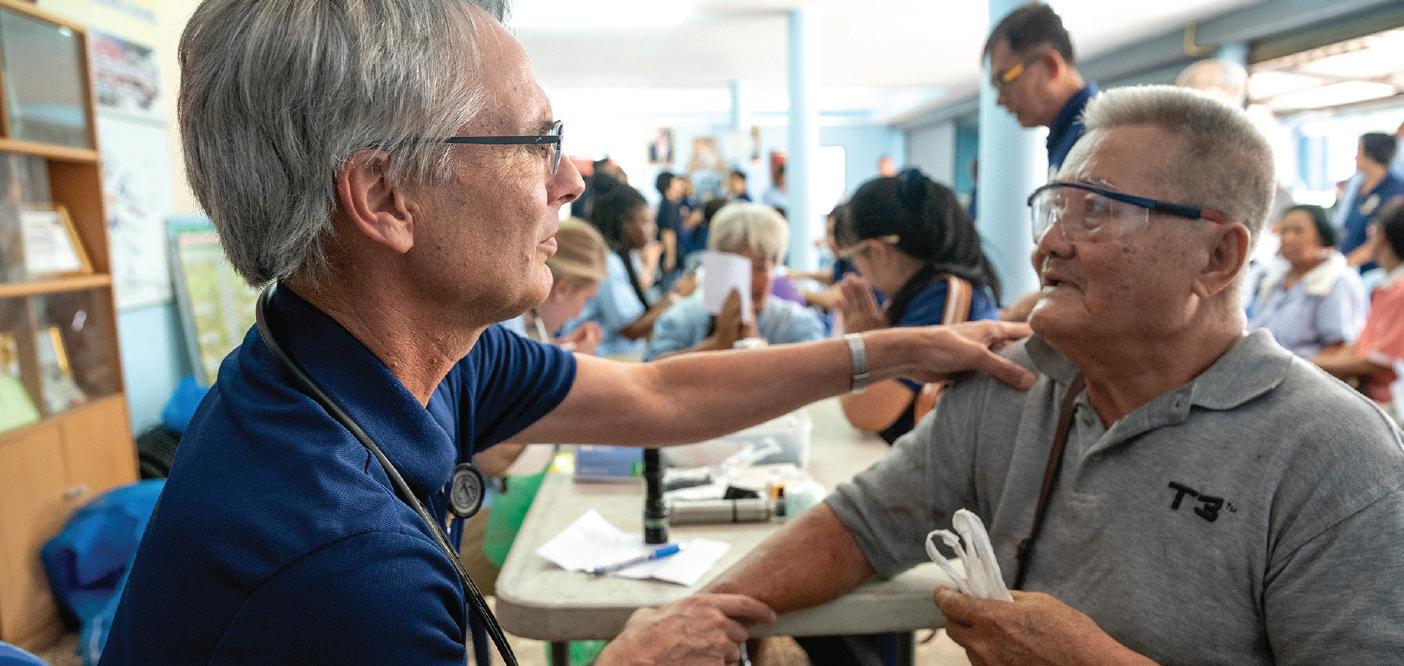
Giving by IBSA churches as of 07/15/22 $3,432,859
Budget Goal: $3,934,623
Received to date in 2021: $3,646,799
2022Goal: $6.2 Million
NATE ADAMSEach church a missionary
For Southern Baptists, doing international missions often means sending and then partnering with a missionary in a place where there are few or no known Christians. Many times, they are solitary witnesses among thousands of people who have never heard the gospel, and who probably don’t have a Bible in their own language.

North American missions is primarily about church planting, and the evangelism and community ministries that invite seekers and new believers into that new church. Church planting missionaries focus on communities where there isn’t a church, or on groups of people who aren’t being reached because of language, demographic, or culture. Yet it can still require years of faith and hard work before a lasting church is established.
Missions within a state like Illinois can have elements of both international missions and North American missions. Especially in larger cities, but increasingly throughout the state, there are pockets of unreached people groups from all over the world. And last year Illinois church planters started 13 new churches here, with a total of about 60 new churches in their early years of development. Yet there are still 10 counties with no SBC church, 13 with only one, and there are now more Muslims in Illinois than Southern Baptists.
One unique thing about state missions, however, is who the primary missionaries are. Here in Illinois, our IBSA staff recognizes that it is not us but our IBSA churches who must be the primary missionaries. Our most strategic role is to invest our lives in the health, growth, and missionary calling of each church, so that it can more effectively turn itself inside out into the lostness of its community.
With almost 13 million people, Illinois has a population larger than 131 of the world’s 209 nations. Yet there are only about 20 traveling ministry staff at IBSA, and about 35 overall. It is not our handful of staff but our 900-plus churches that can have the greatest impact on the vast lostness of our state mission field!
Who’s on the frontlines here in Illinois?
That’s why “Each Church a Missionary” is the theme of this year’s Mission Illinois Offering. Most churches receive this offering during September, and anyone can give directly through the IBSA website at IBSA. org. At missionillinois.org there are video stories of churches being a missionary in small towns, medium-sized cities, and Chicagoland, and of churches being started, restarted, and revitalized.
Certainly each church is a missionary, but I don’t want to understate the roles that our IBSA network staff play in assisting and delivering value to those missionary churches. In addition to helping plant 13 churches and providing ongoing support to 60 newly developing churches, last year our IBSA staff helped train more than 600 pastors and 5,000 leaders. The staff your church supports through the MIO are now working with over 50 churches on intentional revitalization processes, and over 100 churches in “Next Step” consulting. IBSA camps have already hosted more than 3,000 participants this year, and thus far more than 80 children and students have come to faith in Christ.
The Mission Illinois Offering is especially important this year because ongoing Cooperative Program giving has currently returned to mid-pandemic levels, probably due to inflationary pressures on giving to churches and perhaps other concerns. As we now enter these final months of the year, we are hopeful that many churches will be able to provide a generous offering that focuses on our shared mission field here in Illinois. CP is shared with all the missions and ministries of the national SBC, but 100% of the MIO supports the missionary work of churches right here in Illinois.
Nate Adams is executive director of the Illinois Baptist State Association. Respond at IllinoisBaptist@IBSA.org.

Students return to HLGU
Finances improve after stringent season
Hannibal, Mo. | Students moved into their dorm rooms at summer’s end and classes resumed Aug. 22 at Hannibal-LaGrange University after a season when the viability of a fall semester was in question.
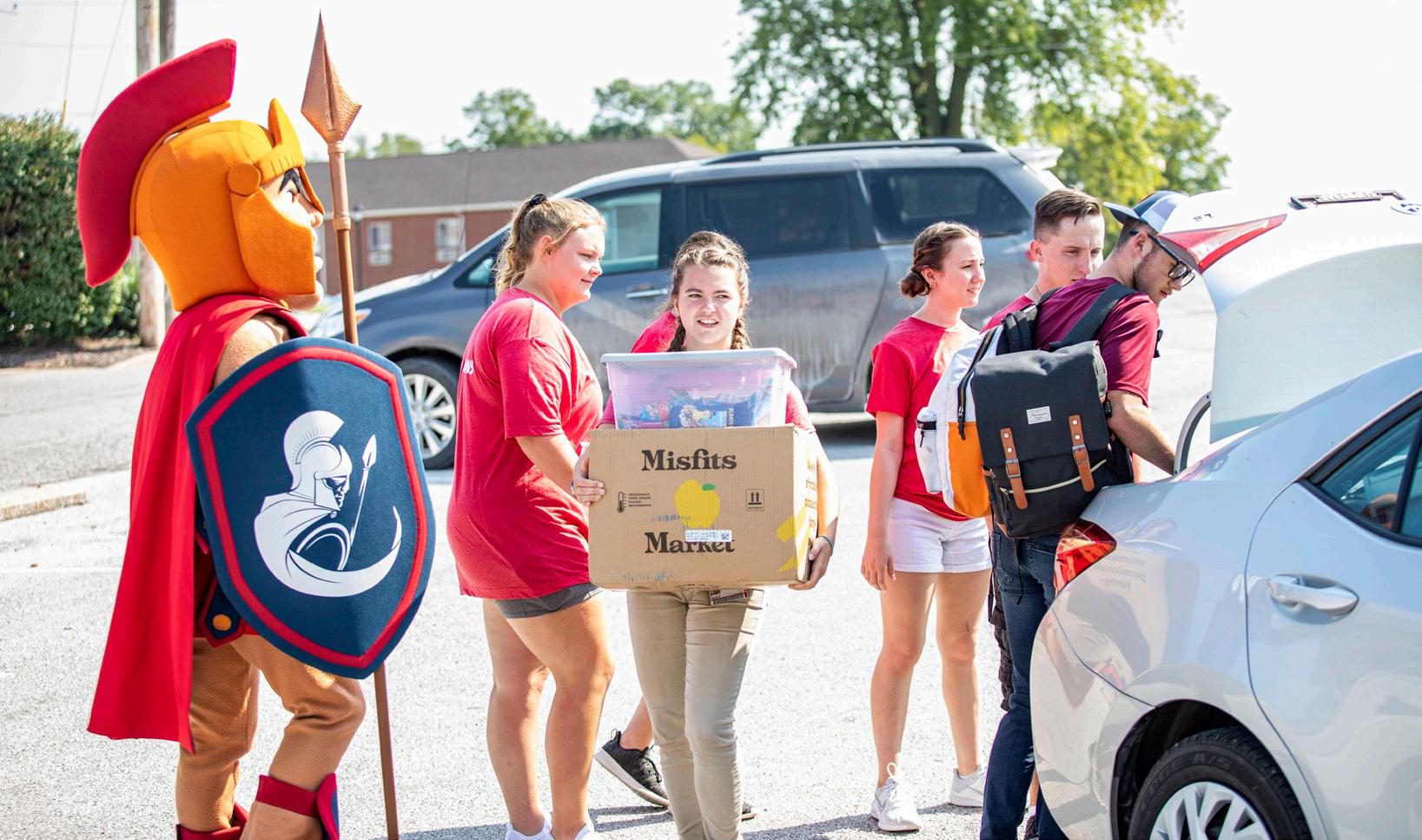
The school was in crisis mode in March, with closure predicted before the end of the spring semester unless immediate cuts were made and funds raised. The school needed to raise or save $2.2 million.
The 94-year-old school was “facing a financial Goliath,” transitional president Rodney Harrison said in a statement Aug. 1. “The president of ten years had resigned two months earlier, and the full reality of the University’s fragile financial situation was still coming to light.”
The executive team cut staff and benefits, trimmed some of HLGU’s 30 majors, appealed to donors, and called on volunteers from local churches to help on campus with lawn care and similar upkeep.
Faculty contracts were cancelled in the exigency plan, with about 15% of faculty dismissed or reduced to part-time status. Of 12 intercollegiate varsity sports, the Trojans’ golf and wrestling programs were eliminated. The school raised $1.5 million. By the end of July, Harrison declared the crisis averted.
“The pay and benefit cuts that had been in place since March would be lifted for all returning employees,” Harrison said. “With a business model in place based on scalability, and a balanced budget based on enrollment realities, HLGU may well become a
model for small liberal arts universities.”



At the start of the new academic year, Inside Higher Ed reported a dozen faculty would not return. Enrollment, which dipped to 780 in 2021, had begun to inch upward, and the student retention rate bumped up from 50% to 60% last year.
In July HLGU began advertising for a few replacement positions.
At the same time, the presidential search team was digging into their pile of resumes.
“We covet your prayers as we begin this search process,” trustee chair Mark Anderson said. “Our greatest desire is to find the person the Lord has to lead HLGU in the years to come. God has been faithful to bring us to this point and we believe he will continue to be faithful in this search process.
“I want to express my deepest gratitude for your commitment to the University,” Anderson wrote to supporters. “These have been difficult days, but we believe with confidence that God is at work at HLGU.”
HLGU was founded in 1928 from the merger of two colleges named for the Mississippi River towns where they were located. The school had a peak enrollment of about 1,200 in 2012. Anthony Allen, who resigned in January, was the school’s 17th president, serving ten years. Harrison is serving as transitional president while simultaneously holding his position as head of Baptist Homes & Healthcare Ministries in Missouri.
IBSA churches focus on state missions
Enter the northwest doors of Pennsylvania Avenue Baptist Church in Urbana on a Sunday morning and you will encounter East Asia. River of Life is a Chinese congregation started in 2018 that meets in PABC’s building. Their mission is to share the gospel with Chinese students and immigrants who call Champaign-Urbana home.
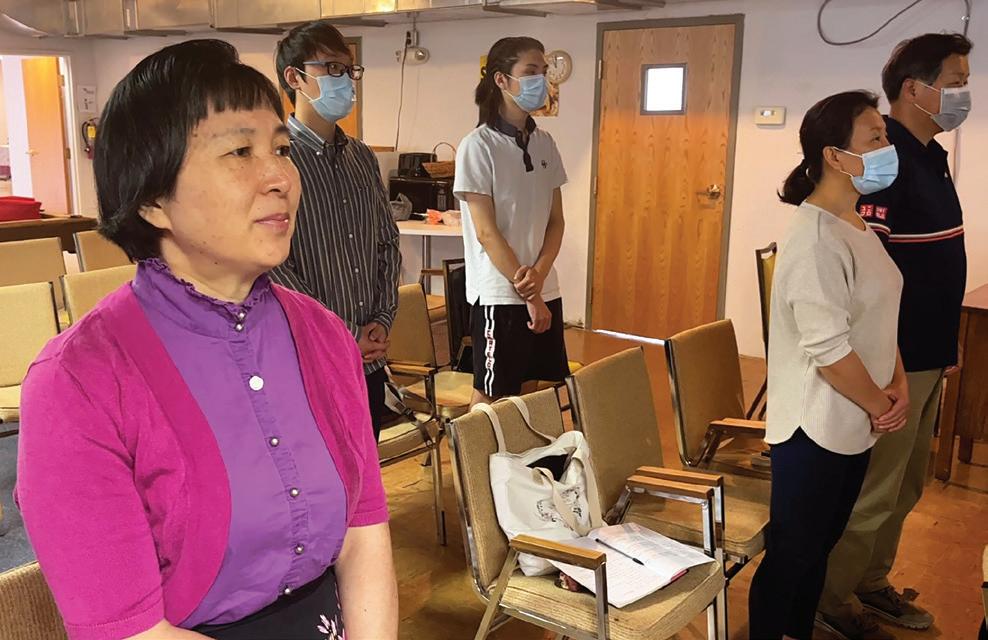
The church exists because of the partnership of Illinois Baptists. And their story is one of four featured in the Mission Illinois Offering and Week of Prayer, observed in many IBSA churches Sept. 11-18.

The University of Illinois is home to over 10,000 students from China. While Christianity saw a period of rapid growth in China, it is still rare to be a Chinese Christian. Most students have little knowledge of Jesus when they arrive on campus at U of I.

Thomas Li understands their experience. He was a self-described “strong atheist” when he arrived at Indiana State University in 1997 for Ph.D. studies. But God had other plans. “God was working in my heart, so that gave me the opportunity, but he humbled my heart, humbled me, so I was able to know him,” Li said.
“God put a burden on my heart to do the most valuable thing, that was to save the soul.” That led Li to seminary, then ultimately, to Champaign and its enormous population of Chinese students.
PABC has a long history of outreach to Chinese students, and through help and funding from IBSA and the North American Mission Board, River of Life Church was born. Pastor Li and his family have established roots here. They, along with a small core of committed leaders, are ready to share Christ with the new wave of students who arrive on campus each fall.
Learn more about their ministry at MissionIllinois. org. And encourage your church to pray and support state missions in the month of September.
Reform implementation begins
Illinois associational leaders learn about stopping sexual abuse
Springfield | The nine members of the successor to the SBC’s Sexual Abuse Task Force were named by new convention president Bart Barber of Texas after one month on the job. At the same time the list was made public, the South Carolina pastor who will lead implementation of abuse prevention reforms was advising local association leaders in Illinois about the critical importance of moving ahead.
Marshall Blalock co-chaired the SBC Sexual Abuse Task Force (SATF) that presented its groundbreaking report on abuse in the convention’s churches. Five reforms including a task force to lead implementation were accepted by messengers to the Southern Baptist Convention Annual Meeting in Anaheim in June. Blalock accepted Barber’s invitation to chair the new Abuse Response Implementation Task Force (ARITF) in July.
“The purpose of this task force is to assist the churches of the Southern Baptist Convention in our efforts to shut the doors of our churches to those who would act as sexual predators,” Barber said, “and to wrap our arms around survivors and those who love them.”
The ARITF will develop an abuse reporting and offender tracking system. The task force will also have a policing role. They will consult with the SBC Credentials Committee to accept complaints of churches’ non-cooperation due to sexual abuse. Together with the SBC Executive Committee and Credentials Committee, they will select an independent firm to investigate such complaints. The
Continued from page 1
of Tennessee, said in a statement quoted by the Tennessean newspaper. “Also, grand jury matters are secret and we do not comment on whether or not a case may be before the grand jury,” Boling added.
In other words, no one can say for certain how deep the investigation will go or how long it will last. A DOJ investigation of the Catholic Church in Pennsylvania begun in 2018 produced one arrest in 2020 and is still ongoing.
The U.S. Attorney’s Office for Southern New York is also involved in the SBC investigation. Guidepost Solutions, which documented abuse claims in its 288-page report released in May, is based in New York.
That report may serve as a resource for the federal investigation, said Boz Tchividjian, an attorney for abuse survivors, but “they just touched the tip of the iceberg and then they stopped.” He told the Tennessean, “It’s so systemic and so prevalent and I’m hoping that this process with the DOJ will maybe give a greater voice to many of the survivors.”
Tchividjian is founder of GRACE, a ministry addressing abuse, a former prosecutor in Florida, and grandson of Billy Graham.
“I hope people measure their expectations,” he said. “I think it’s a good thing that they (the SBC) are being subjected to the civil authorities... But we just don’t know.”
Hope and prayer in Illinois
EC staff met with trustees and state convention leaders in separate online sessions to explain the
ARITF will report back to the 2023 annual meeting on their selection.
Blalock was the featured speaker at the Associational Mission Strategists roundtable hosted by IBSA Aug. 1-2. Training is vital, he advised.
“Very few folks are trained in how to talk to a sexually abused person,” he said to the leaders. “Having trauma-trained counselors who can help you is important.”
One local association leader present at the meeting was Kevin Carrothers of Salem South Baptist Association. In June he completed three years on the executive leadership team of the Southern Baptist Conference of Associational Leaders (SBCAL) and one year as president.
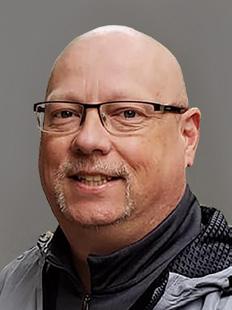
“Church life in general tends to be a slow process,” Carrothers acknowledged. “Churches need to take everything and evaluate it. We ask, ‘Do we have the financial resources; if not, how are we going to address that?’”
But the local association can be a vital partner helping both pastors and the state convention with implementation. “For example, how are we going to get the sexual abuse assessment (currently in development) to the local level?” Carrothers said.
Blalock briefly discussed the new national SBC
statement and the EC’s compliance with the DOJ subpoena, but little else was made public. Of the eleven SBC entities and the auxiliary, all told our reporting partners at The Baptist Paper they have not received any subpoenas at this time.
“It’s not surprising to me that the Department of Justice is performing this investigation, given the transparent disclosure of so much information through the SBC’s own self-study earlier this year,” IBSA’s Adams said. “Anyone to whom sexual abuse is reported carries a responsibility to the victim and to justice and prevention. This responsibility to protect and care for the vulnerable comes not just from the government but from God’s word.”
EC trustee Robinson from Country Club Hills offered a hopeful response.
The first-ever federal investigation of the SBC may have surprised Robinson, “but after wrestling with it, my pastoral response is just to trust God.” He pointed to the fiery trials forecast in 1 Peter 4:12. “I trust this is just another way for God to reveal his glory, and as a believer, I’m definitely not afraid of someone finding out the truth.”
In contrast to Tchividjian’s view, Robinson said Guidepost did a very thorough investigation and “dug up everything they could.” He does not expect new revelations. While urging patience, Robinson expressed hope that the investigation will not be prolonged.

“Pray for wisdom for all our entity heads and leaders” who may be involved with a probe, the Illinois pastor said, “and pray for justice to be done. God is a God of justice and righteousness.”
Meanwhile, Robinson, who is chairing the EC presidential search team, said he has received no negative response from any candidates who have
Ministry Check database that will be created to track offenders. The ARITF will report back to the Convention on the feasibility, effectiveness, and costs of the website, which will be established and maintained by an independent contractor chosen by the task force.
Once the database is in place, ideally “someone won’t get convicted in Georgia and move to Illinois without people knowing.” However, participation by churches will be voluntary. Blalock is “hoping churches will care enough about their sister churches” to participate.
Blalock again pointed to the importance of screening checks, which admittedly still meet with some resistance in local churches, nearly two decades after they were advocated. In addition to background checks, Blalock said before a person can volunteer at his church, he or she must be known by the church for at least six months. Even then, volunteers are required to provide references and sit for interviews. For the safety of your children and grandchildren he said, “You need to go as far back as you can.”
Blalock cited the statistic that one-fourth of women and one-sixth of men in SBC congregations are survivors of sexual abuse. “Ministry to broken men and women is never a distraction,” he said. “If we began to be known as a church involved in ministry to the abused, we would be blessed. There’s an opportunity to bring the gospel.”
expressed interest in leading the denomination’s central operations hub. Actions by previous EC leaders including former President and CEO Ronnie Floyd and Attorney August Boto were the subject of much of Guidepost’s report.
The search team received resumés through Aug. 26 to replace Floyd, who resigned in October as the Guidepost investigation was contracted.
On the homefront
The federal investigation does not extend to state conventions.
In Illinois, IBSA continues examining its abuse reporting policies and ministry to abuse survivors. An Illinois task force was established by Adams prior to the release of recommendations by the SATF in June.
“I know our network is becoming even more vigilant and comprehensive in its efforts to equip churches in this area, and to protect both vulnerable people and underprepared churches from sexual predators,” Adams said. “We are also learning more about what it means to respond to victims with heightened sensitivity and meaningful help.”
In five recommendations adopted by messengers at the 2022 SBC Annual Meeting in Anaheim, the SATF urged development of trauma-informed counselors for victims and churches. IBSA has identified several such counselors in the state in its abuse ministry plan which is in development.
“There is still much to do,” Adams said, “but I believe churches and church networks are awakening to the magnitude of the need, especially in today’s culture, and are committed to doing whatever it takes to ensure the safety of all.”
ERLC presidential search progresses
Nashville, Tenn. | The September trustees meeting of the SBC’s Ethics and Religious Liberty Commission may be a little longer than usual, as the board prepares to hear from the search team that will recommend the next president.
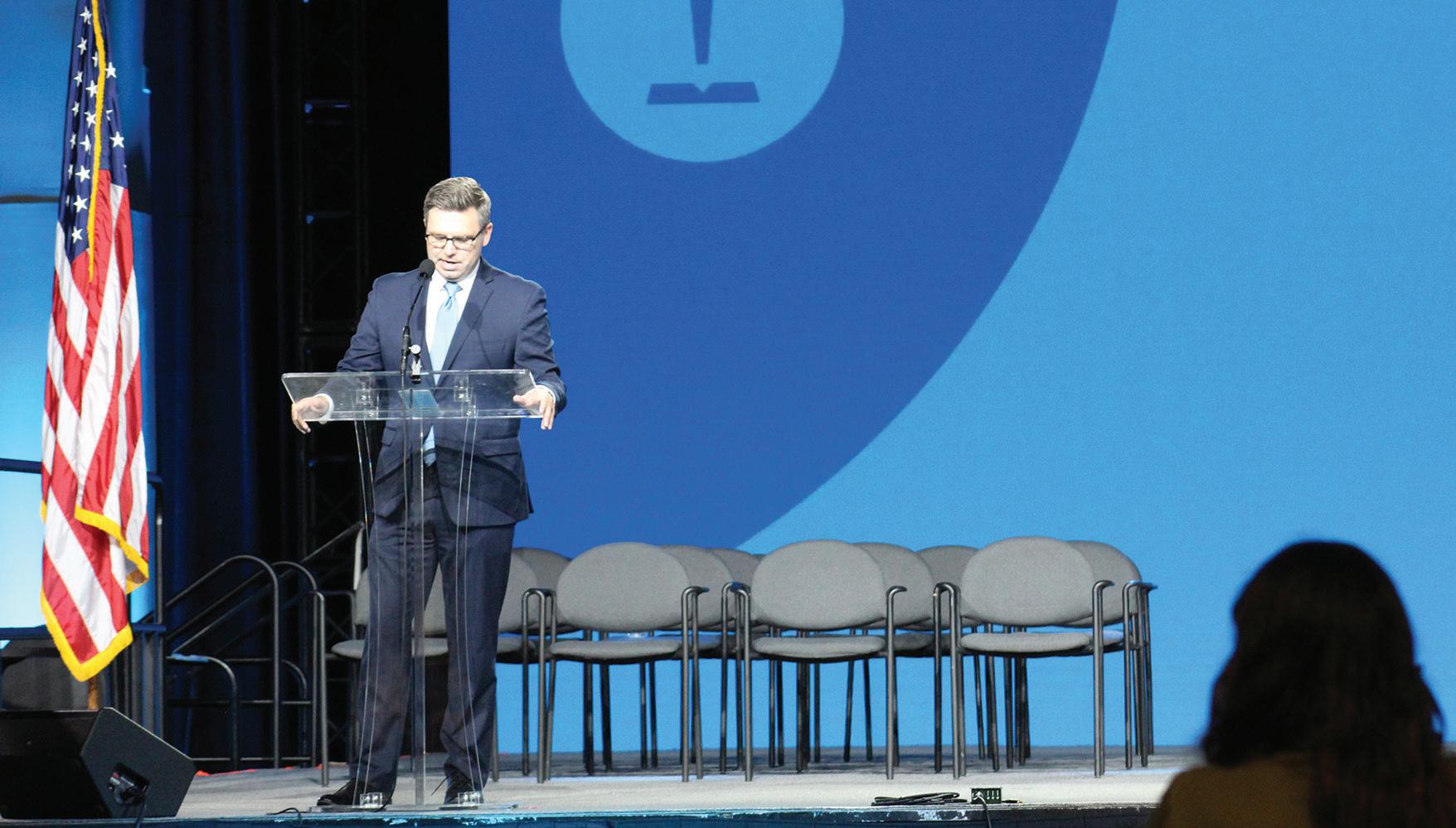
The group is working through the process with an active candidate, its chairman reported in late July, according to chair Todd Howard of Pine Bluff, Ark. The selection process had narrowed down to three candidates in February. Factors such as the desire for a strong consensus among search team members brought the focus to the current candidate.
The group decided to hold off on discussions this spring in anticipation of the Guidepost Solutions report released in May and the Sexual Abuse Task Force report, which was delivered in June at the 2022 SBC Annual Meeting in Anaheim, Calif. Whenever the search team reaches a strong consensus, they will present that candidate to the ERLC’s board for a vote.
In recent years the ERLC has met with sustained criticism and calls for it to be defunded, including at the 2022 Annual Meeting in June, though Southern Baptists have voted by substantial margins several times to continue supporting the entity. A task force commissioned by the Executive Committee to study the ERLC’s impact on Cooperative Program giving was released in February 2021. Discussion at that month’s EC meeting resulted in no vote taken on the report.
Baptist Press asked Howard if the criticism had affected the search team’s progress.
“It’s definitely had an impact and made it a little more difficult because some who would otherwise aspire to this position understand the tenuous nature of the Commission itself,” he said. “There is probably a bit of hesitancy if they have a more secure job and see we’re voting on [the ERLC’s] viability every June.
“It’s made our job more challenging, for sure. Anyone with common sense can see that.”
If doors close regarding the current candidate, Howard said, the group will consider re-opening the portal for new names
to be considered.
ERLC staffer Brent Leatherwood is serving as Acting President. He spoke on behalf of the ERLC at the SBC Annual Meeting for the second consecutive time, following the resignation of Russell Moore in 2021. Leatherwood deflected comments by messengers and proposed amendments which would have strengthened an all-ornone stance on abortion that would have prevented an incremental approach such as “heartbeat” bills to reduce availability in states where abortion is still legal, including Illinois.
Leatherwood also spoke in opposition to legal punishment for women who have abortions. “You’re not going to get me to say we should put mothers behind bars,” Leatherwood said off script in response to the view that women who have abortions should be treated as murderers.
In Leatherwood’s year, the ERLC has focused on pro-life issues and placement of sonogram machines in crisis pregnancy centers through its Psalm 139 Project, and less on national politics and issues such as immigration that distanced Moore from a substantial number of leading pastors. ERLC has maintained its work on the Caring Well Initiative to prevent and minister after sexual abuse. Unclear at this time is the future of a multimillion-dollar proposal related to abuse prevention that could have involved Guidepost Solutions. The SBC’s relationship with that investigating group was ended after their 288-page report was delivered, and after objections to Guidepost Solutions’ public support of gay Pride Month.
Sources tell the Illinois Baptist that the Sept. 11-14 meeting schedule means trustees may have more to handle than they usually do, although no indication has been made that the search team will be ready to present a candidate.
Howard asked that Southern Baptists continue to pray for the seven-member search team as they continue the process. “This is something God’s got to do,” he said. “He does the heavy lifting; we’re just trying to follow his will.”
Christianity Today Moore named magazine editor
Lifeway staffer also takes new role
Carol Stream | Two appointments at publisher Christianity Today (CT) may signal an important shift in what has been a leading evangelical voice. And while one name is well known, the second, lesser known, may bring Southern Baptist sensibilities to daily operations.
Russell Moore was named editor-in-chief starting Sept 1. The former head of the SBC’s Ethics and Religious Liberty Commission became Public Theologian at CT last May when he resigned after unresolved friction with SBC leaders over sexual abuse and his unpopular political stances. Now, as editorin-chief, Moore will provide editorial direction for the flagship publication founded by Billy Graham in 1956.

“Moore has demonstrated, time and again, the courage to express his convictions and the integrity to live by them,” said CT President and CEO Timothy Dalrymple. “Sometimes this has meant contending for essential biblical and theological truths in the public square. Sometimes it has meant declaring truths to the church that challenge and convict us.”
Dalrymple assumed his post in 2019. He holds degrees from Stanford, Princeton, and Harvard. He succeeded Harold Smith, a 30-year CT employee who was CEO for a decade, and Harold Myra who was the guiding force for the evangelical publisher for almost three decades.
Dalrymple also announced the hiring of Joy Allmond as editorial chief-of-staff. Allmond comes from five years at the SBC’s Lifeway Christian Resources, where she was responsible for alignment of Lifeway publishing content with its corporate strategies, and developing plans for President Ben Mandrell to connect with church leaders.
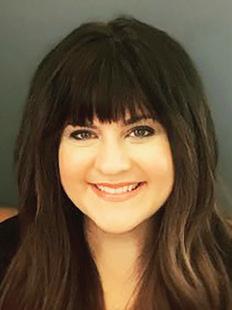
When he resigned from the ERLC, Moore left his SBC church membership for a non-denominational church role in Nashville, but Allmond’s recent history as a Southern Baptist is noteworthy. Christianity Today International, based in metro Chicago, had a history of Southern Baptists in its ranks. With retirements in top management in recent years, however, and controversial comments about the Trump administration under the leadership of its previous editor, some conservative observers had expressed concern about mission drift at CT.
IBSA affiliation notice
Churches wishing to apply for affiliation with the Illinois Baptist State Association must submit an application for membership by September 20. To request an affiliation packet, visit www.IBSA.org/membership. For more information, contact Barb Troeger at (217) 391-3107 or email BarbTroeger@IBSA.org.

Digging out in Metro East after ‘1,000-year flood’
Shiloh | A wide green line on a map of East St. Louis encircles most of the town. It’s the flood zone hit by the same storm system that flooded St. Louis on the other side of the Mississippi River and inundated seven counties in Kentucky in late July. The record floods in Kentucky killed 38 people, and Missouri flash floods broke a 100-year-old record. While news of those stories filled screens and pages, the damage in East St. Louis was largely unreported.
Except to Illinois Baptist Disaster Relief.
Missouri and Kentucky Baptists began digging out in their states, and Illinois teams headed to Metro East to set up an Incident Command Center, handle childcare for residents engaged in filing for assistance, begin assessing damage to homes, and scheduling work teams.
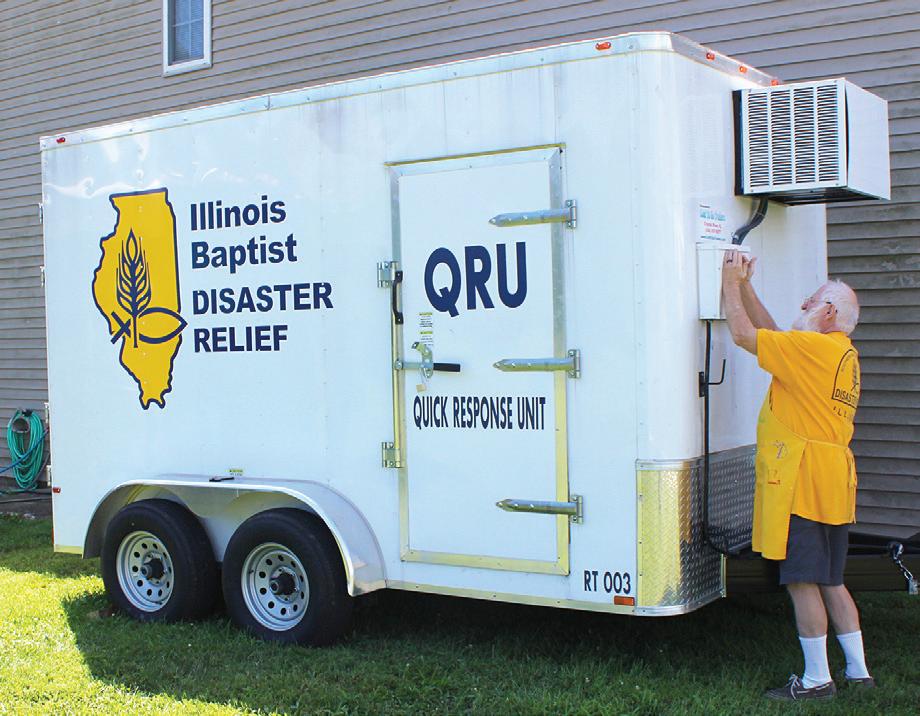
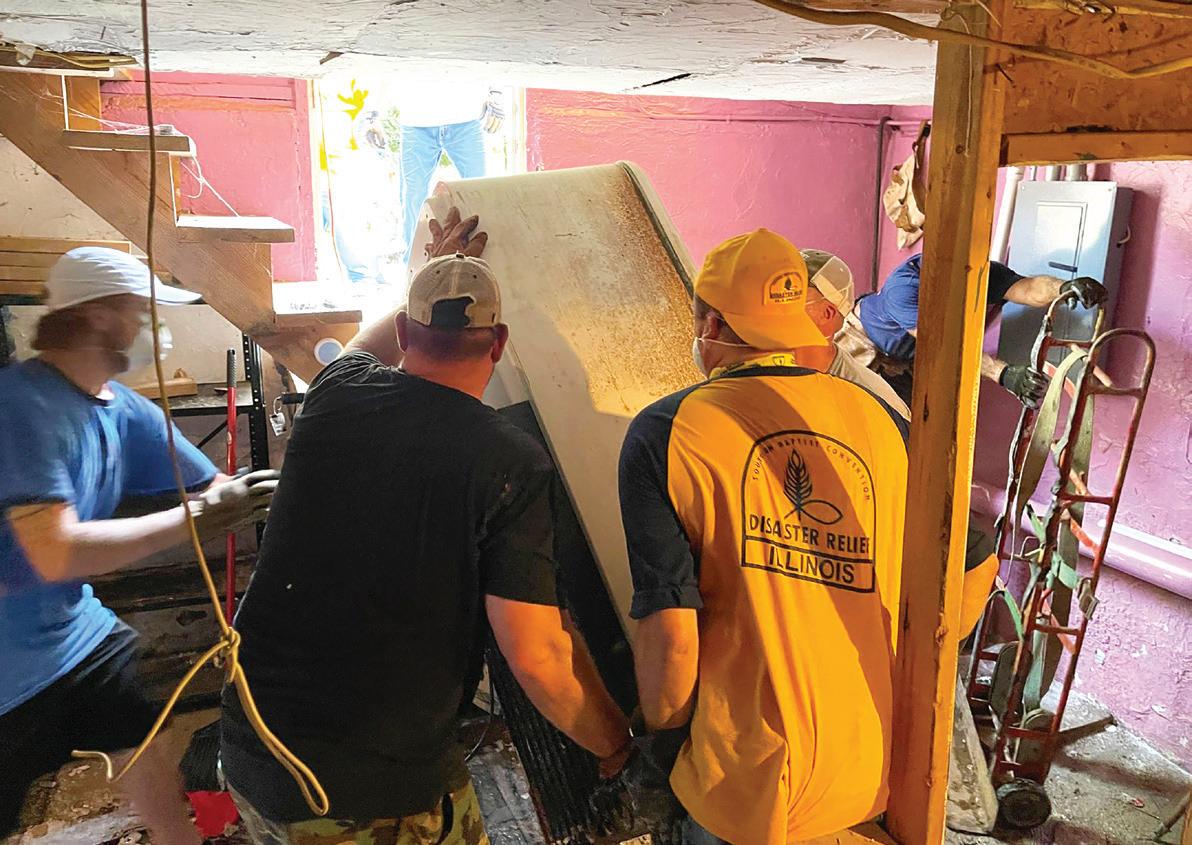
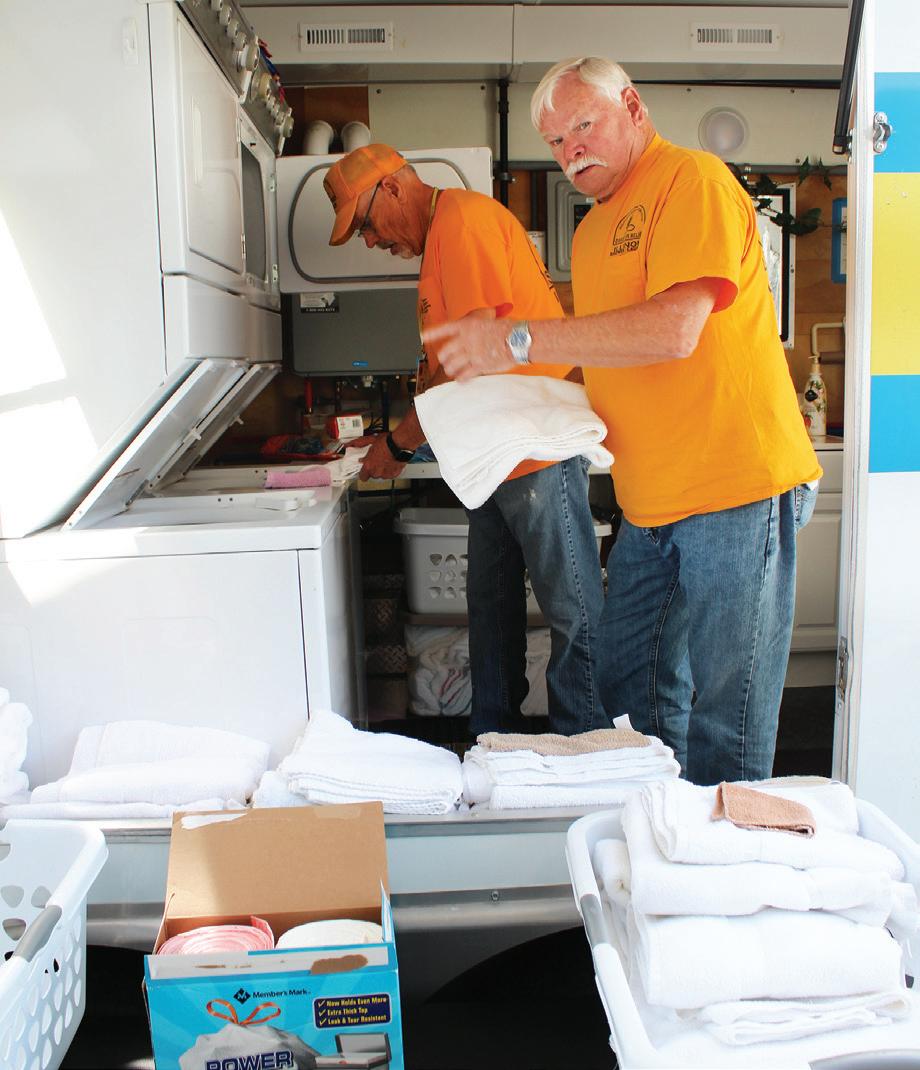

Within a week, 190 requests for assistance had been filed with IBDR.
“We hope to be finished by the end of August,” IBDR assistant state director Harold Booze said midway through the project.
Incident Command was established at Spring Valley Baptist Church in nearby Shiloh, with the shower and laundry unit from Macoupin Association and the kitchen unit from Williamson Association. Also on site was a new freezer trailer, part of a Quick Response team. Booze reported work teams coming from Michigan and Colorado, and partners from American Baptist, Lutheran, and United Methodist Disaster Relief teams were expected to assist.
Among their first projects was clearing the flooded basement of a woman known in the community for feeding homeless people.
“She was having a hard time letting go of things,” Booze said. “It’s understandable, if you’ve lived in a house since 1965.
“My first experience at flood recovery was very emotional for me,” he said. “You’re removing trees and cutting limbs, but then you’re inside someone’s home, often helping them sort and haul out
their belongings. Then you’re tearing out walls, down to the studs. It’s emotional for the homeowner, but it was also for me,” Booze said, recalling his early DR experiences.
Booze is one of three assistant state directors, along with Dennis Felix and John Lindeman. Butch Porter recently retired as state DR director.

On this callout, more than 1,200 contacts were reported as assessors went house-by-house responding to requests for help. “People have no idea how many lives are touched,” Booze said. Chaplains assigned to the work crews meet with flood victims, giving them time to vent and cry and to ask spiritual questions.
“The teams pray for the homeowners when they finish at a site and give them a Bible signed by the whole team,” Booze said. He found people in East St. Louis especially receptive to prayer. “Here, residents are asking to pray for us!” he said with some amazement.
The kitchen to feed multiple work teams was set up at Spring Valley Church. “I can’t underestimate the importance of having a sister church open their doors and host DR,” the director said.
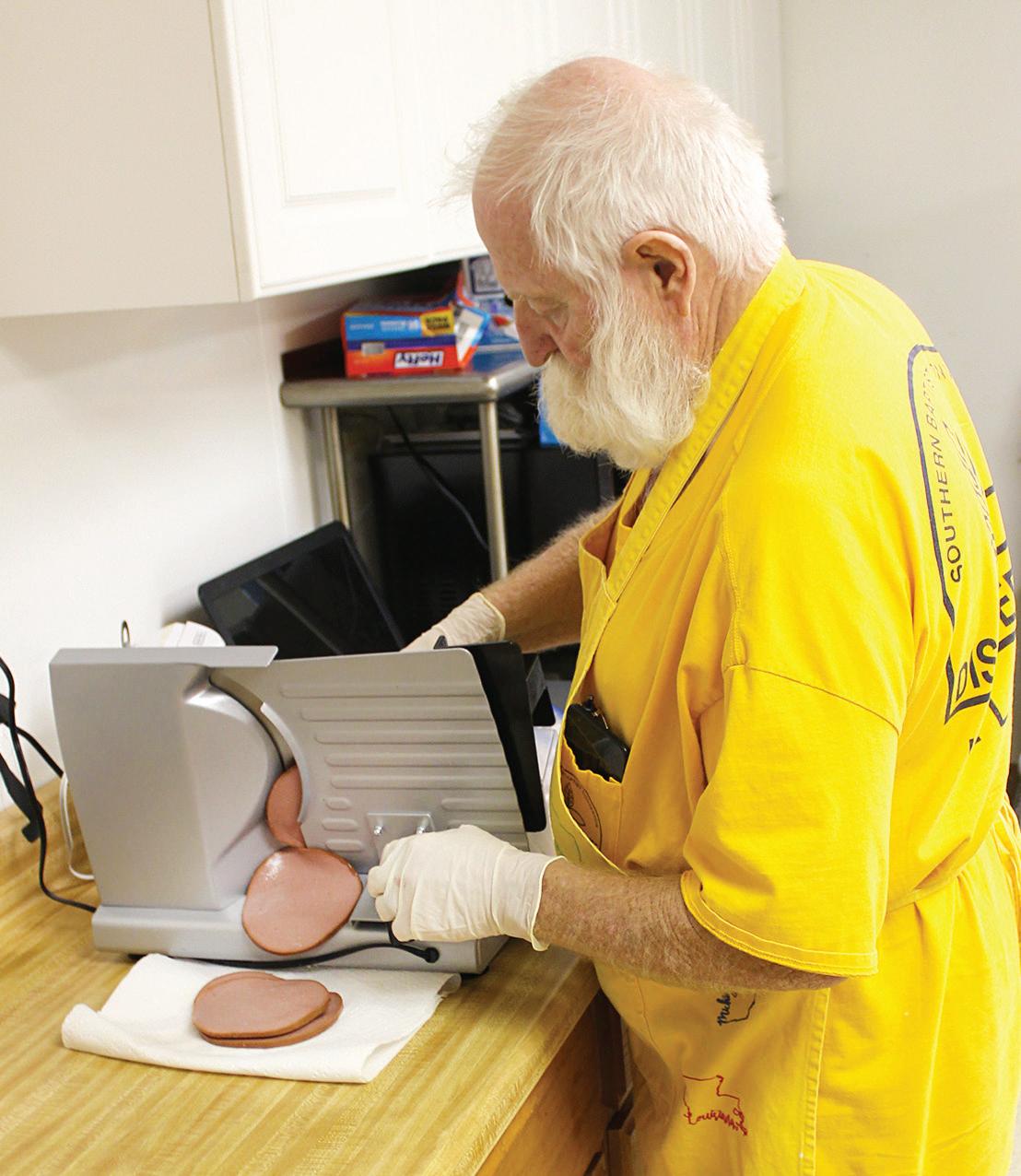
“It may be inconvenient for them—having DR take over the facilities and crews sleeping in classrooms. But it’s a blessing when they do.”
The team fed work crews hot breakfast at the church, packed sandwiches for lunch on the work sites, and served a hot meal for dinner. A new Quick Response feeding unit is on order. The 12-foot trailer will be capable of serving 400 meals at a time using three volunteers. The unit will be housed at Dorrisville Baptist Church in Harrisburg.
IN FOCUS
(Re) Building faith
In an age of deconstruction, what can we learn from old ways of awakening and renewal?
Q & A WITH IBSA’S SCOTT HARRISAtent erected for a couple of weeks each year out on the edge of town became the center for personal spiritual renewal and evangelistic zeal for a century or more. Traveling evangelists would ignite dry-wood believers and leave fiery faithful in their places to continue their work in the local church for another season.
But in post-war America, the tents were packed away and revivals moved inside, until they disappeared almost completely. Without a phalanx of itinerant evangelists, invigorating the faithful for personal evangelism falls to the local pastor.
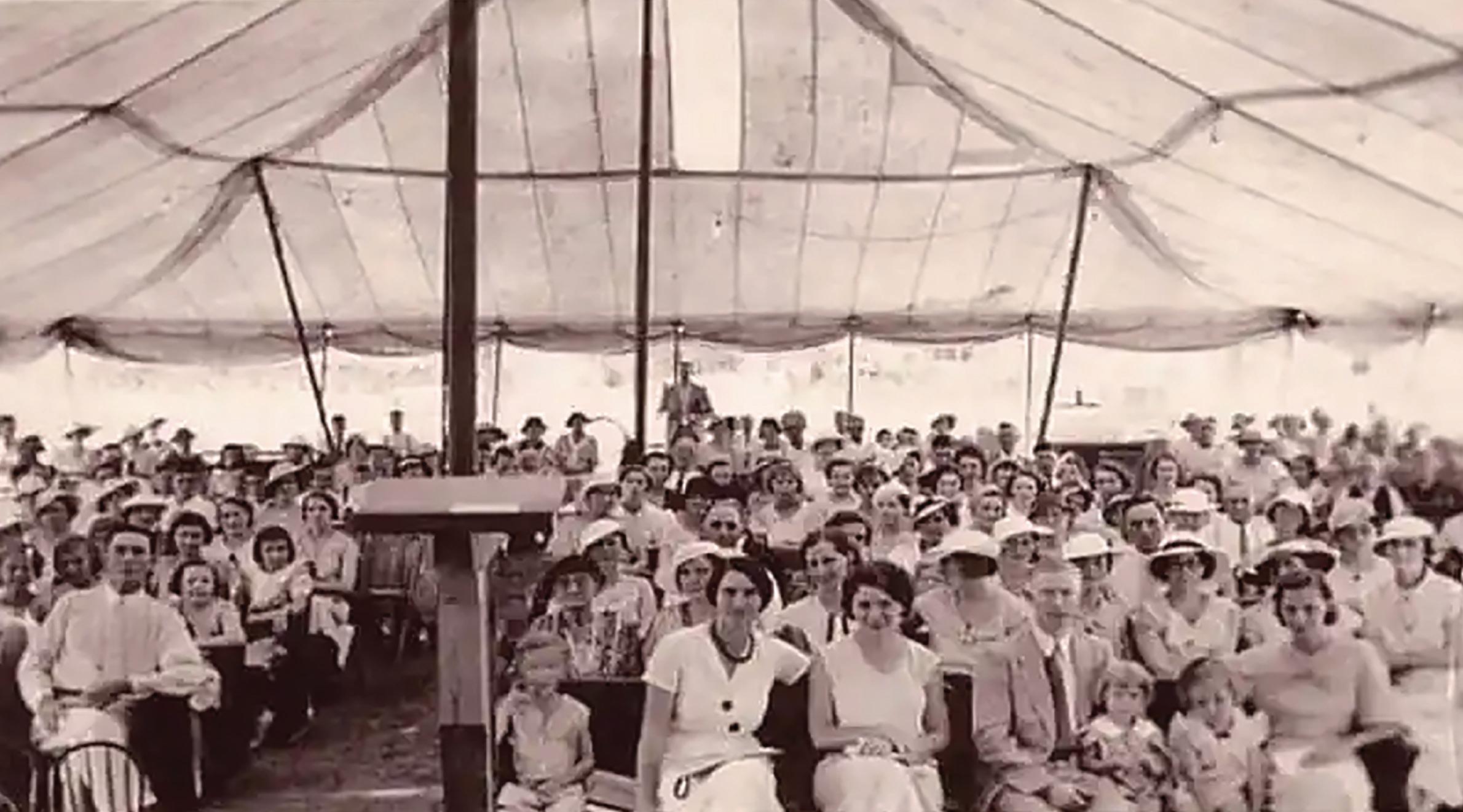
On top of this, there’s the declining culture in which we live and work today, and what some theologians are calling a period of deconstruction. Some people are systematically taking apart their faith and deciding what to keep. This is especially true among younger people, in urban areas, and among mainline adherents.
This phenomenon was first named in 1965. In its most complicated form, deconstruction questions every belief, including those unrelated to faith, saying that all beliefs are secondhand and must be deconstructed before they can be owned. It arose from the 60s seedbed of distrust in business, government, media, and, yes, religion.
More recently, the absence from church caused by Covid closures not only broke good habits, it caused some people to seriously doubt their faith. Among 1,000 pastors surveyed by Lifeway Research, 3-in-4 have heard of deconstruction; in the Midwest the number is 9-in-10; but only 1-in-4 say they have seen it in their own churches.
This is the environment in which we live and move and share our faith.
The American culture that accelerated its dismissal of Christian belief around 2000 is now taking the faith foundation apart brick by
Tent revival
From the brush arbor to tent meetings to Midwestern tabernacles, the spring and fall revivals were staples of church life, drawing believers to deeper commitment and lost people to salvation. Today they’ve almost disappeared. Is there a modern-day equivalent?
brick. Coming to the place of personal ownership of one’s beliefs is a good thing. It’s common for teens and young adults to go through a period of distinguishing between their parents’ faith and their own. But the phenomenon that asks “Is anything worth believing?” looks different when it’s engaged by people in their 30s. Or 60s.
So is the outcome. As Millennial writer Joe Terrell says, deconstruction without reconstruction is a tragedy.
Now arises a new debate over the role of the altar call and the timing of baptism. How public is one, how immediate the other? These may be framed as contemporary expressions of the discussion on “revival vs. revivalism” that says inward renewal is good but emotional commitments may not be lasting—or good for the church long-term.
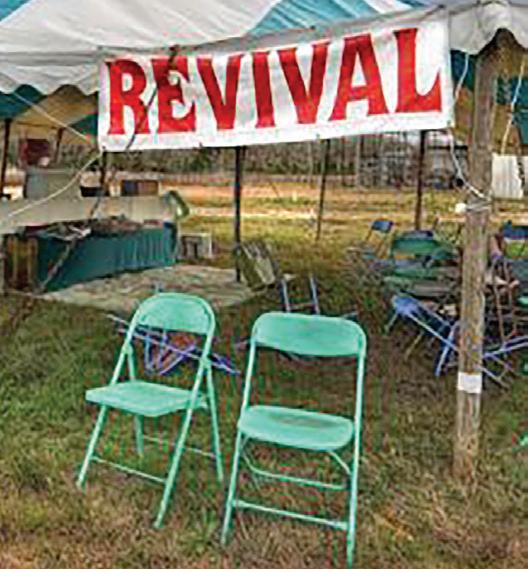
And there is this pertinent question: Will the church be sufficiently revived in our time to awaken our decaying culture to the life-giving claims and call of Christ?
IBSA Evangelism Director Scott Harris is leading Ignite: the Illinois Baptist Evangelism Conference with two-day sessions in three locations this month. Editor Eric Reed asked Harris what the old practices and new developments mean for evangelism through the local church.
Illinois Baptist: The Ignite Conference has expanded this year. What is your goal?
Scott Harris: At the heart of our Ignite Conferences is the desire to see God start a Holy Spiritdirected gospel movement that sweeps across our state.
One focus is equipping young people to share their faith with a training called “The Four.” It’s a simple gospel presentation based on four statements: God created you. God loves you. We’re separated from him because of our sin. Jesus came to solve our sin problem. What do you want to do with this information?
The Four is from CRU, the ministry of Campus Crusade for Christ. IBSA has partnered with them and they’ve allowed us access to their training materials. This is a six-week course. Really it does a great job of training students in spiritual preparation for sharing the gospel.
If we’re gonna turn the trajectory in our state, we have to start reaching the younger generation. When you look at the great revivals, God always worked through the younger folks.
IB: Your second focus in the conferences is prayer. Why prayer rather than technique?
Harris: Yes. We’re not gonna see a great movement of God until our people really start to pray for God’s power, for God’s anointing, but also for divine opportunities to share their faith.

If we’re not praying for people who are lost, we’re probably never gonna share with them. In the process of praying, God changes us. God gives us a passion for that person and breaks our heart over that lostness.
We want to encourage our pastors to make time in their worship services to call the church to prayer for lost people in their sphere of influence. We’re starting to see that happen in some pockets across our country, where churches have made that kind of prayer an ongoing weekly part of their service. Those churches are starting to see signs of revival.
IB: What does this look like in a worship service?
Harris: One thing pastors can easily do on a Sunday morning is in a three-to-five minute prayer time—leading people to pray.
A Texas pastor told at a conference how he was moved by the example of Robby Gallaty. He was under such conviction that some mornings he would lay prostrate on the platform. He could no longer just kneel. He was giving 20 minutes to prayer for lostness.
And one pastor said, “Well, man, I bet that’ll kill a service. You know, you’ll lose people.” But just the opposite.
At the church my son attends in North Georgia, the pastor began praying for lost people in the service. I was there one Sunday and got to witness this. The pastor said, “If you’re able, would you make your seat an altar?”
Probably 800 people simultaneously got up out of their seats, turned around to kneel, and started
praying. You could just feel the place filling up with the Spirit of God. And they are baptizing people every Sunday, many more than before.
IB: How important is it for pastors to see this?
Harris: Oh, I think it’s very important. We need to hear the stories of guys who struggled with the decision to go in that direction, but also hearing what God did—because God still honors the prayers of his people.
I’m convinced that the lack of evangelism, of seeing the growth of the gospel in America today, is a direct correlation to the lack of prayer in the church.
IB: How do you move beyond ‘organ recital’ prayer, listing everybody’s ailments?
Harris: We train our people how to pray— because it’s a spiritual battle.
You are interceding, which means you’re stepping into the place of that lost person to pray for things they don’t realize. They don’t realize that they’re dead, they’re blind, they can’t hear truth. The enemy has made them so drunk with their sin that they can’t grasp grace. They can’t grasp their need for salvation.
And so when we’re praying against strongholds, we’re asking God to give them eyes to see the truth, ears to hear the truth.
IB: Is there a revival in history that speaks to you particularly about the role of prayer?
Harris: They all do. There’s the businessmen’s prayer revival in New York in the 1850s. One man had a desire to pray that God put on his heart. He asked folks at his workplace, “Hey, would you guys start meeting for prayer?”
I think six people showed up for the first one, but soon there were cities in the northeast where churches were full from noon to one every day.
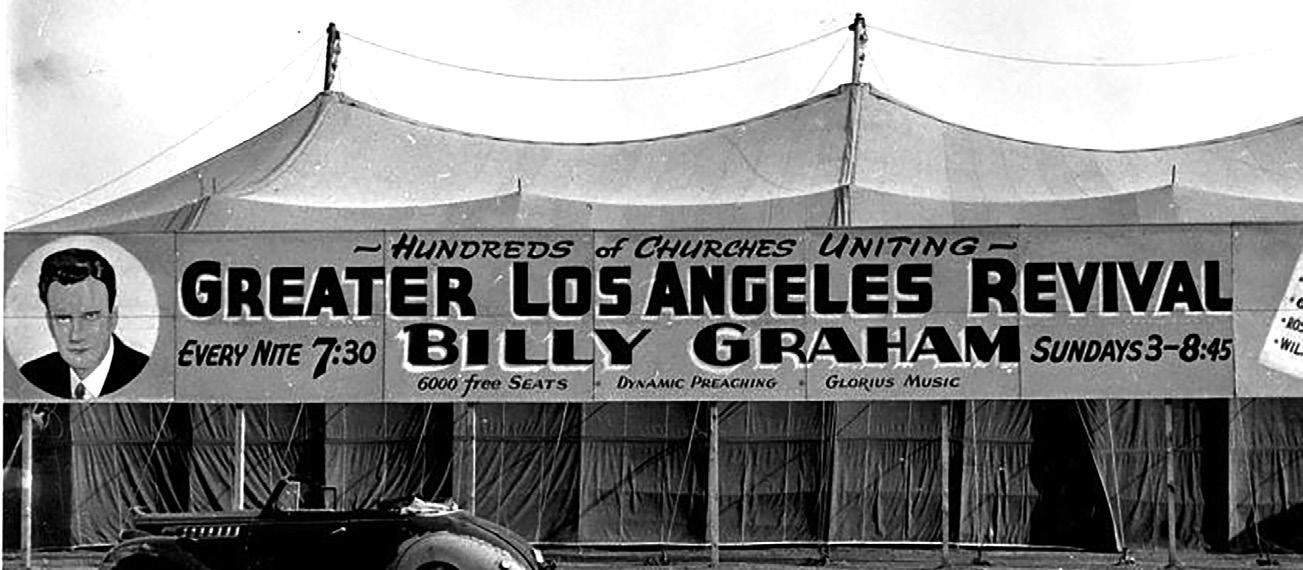
“I’m convinced that the lack of evangelism, of seeing the growth of the gospel in America today, is a direct correlation to the lack of prayer in the church.”
– Scott Harris
IB: Why haven’t we seen this in our lifetimes?
Harris: The 1900s came and went, and it was the first generation in America with no Great Awakening. We saw the crusades led by Billy Graham and the Jesus People movement in the 1970s. Even today, Greg Laurie is holding crusades and we hear about salvations, but it’s not a national movement. And we haven’t seen the effects across the nation.
Before the First Great Awakening in the 1700s, drunkenness was rampant. There was a perversity in the nation. Women wouldn’t be out on the street at nights for fear of what would happen to them. But when that Great Awakening came, great change swept America. Same thing was true with the Second Great Awakening in the 1800s.
I think most Christian historians would say we didn’t have a Third Great Awakening that radically changed the direction of our country in the 1900s, which is why we are where we are in 2022. And if there isn’t another awakening, where will America be?
IB: You’re drawing a distinction between revival in the church and awakening in the nation.
Harris: Yes. An awakening is a national spiritual movement such as in the book of Jonah, where everyone from the king down was in sackcloth and ashes and broken and repentant. That’s the kind of thing we’re talking about. Awakening is a supernatural work of God. Jesus said that the wind blows where it will, so does the Spirit. But what we also see in those awakenings is that it’s across churches, across denominations, across the nation. We see this quickening movement of God that begins as people in the church weep over their sin.

Jesus himself taught us we’re the salt, we’re the preservative of the culture. If the culture’s rotten, we don’t get to point over there and say, “Look how rotten the culture is.” We have to look at us and how un-salty we are.
IB: Robby Gallaty is talking about immediate response to the gospel and immediate call to baptism at a time when so many of our churches are going away from altar calls.

Harris: When Robby shares how God really transformed him, it was first an encounter. In the early days of the pandemic, he was in prayer every morning on his deck. And God said, “Well, you know, here’s what I said in my word (about baptism), and here’s what’s preventing me from doing it.”
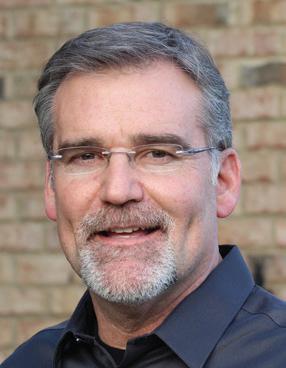
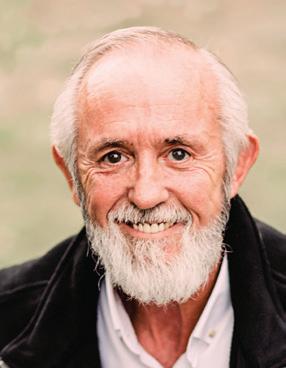
Robby was so broken that he said, “Okay, God, I’m gonna honor you.”
He sent out an email to his deacons, his leaders, his staff, and said, “I want the tanks filled. I want towels. I want t-shirts. I think I’ve heard from God; we’re gonna do this.” And that Sunday they did it. He called people to repentance and to be baptized immediately. And they baptized in every service.
That was the floodgate that started that whole movement. What we’re seeing in my opinion is the impact of one pastor being broken that we’re not being obedient to the biblical text— gospel sharing and calling for immediate decisions.
IB: You’ve described ‘pockets’ where the Spirit is at work. Are you seeing this in Illinois?

Harris: We’re seeing pockets of it. I could tell you about churches in Wayne City and Centralia where pastors are seeing baptisms again. I’m working with churches across Illinois that are focusing on evangelism and the role of prayer.


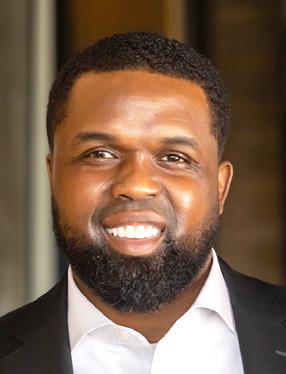

At Alpha Baptist Church in Bolingbrook, Pastor Bruce Kirk is trying to reach men, because he said in their cultural context the men are missing. He’s asked the church to give names of lost people. And they go up with markers and write down names. They’re praying as a church. Every Sunday he brings the men on stage. He prays over them, he’s leading them to pray for their friends.
Those are just a few examples. I believe we can see so much more as the Spirit moves supernaturally to revive the church and awaken lost people in Illinois.
Illinois Baptist Evangelism Conference
A regional two-day event to help encourage, inspire, and instruct you to effectively share your faith. Help your church reach lost friends, family members, and people in your community for Christ.
Marion Sept. 11-12
Featured speakers
Wheaton Sept. 18-19
Decatur Sept. 25-26
Each attendee will receive free resources!


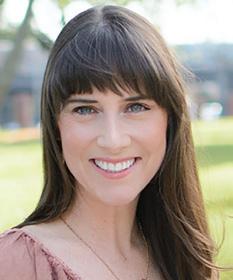


MISSION
Prayer chain

Missions commitment links Ukrainian refugees with this Illinois church

 BY ERIC REED
BY ERIC REED
O’Fallon | Donn and Joni Schaefer had organized mission trips to Russia ten times since 2008. They taught English in Siberia as a way to open discussions about the gospel. But when the invasion of Ukraine shut down trips into Russia for Americans, the Schaefers looked for other avenues to use their unique skills.
The Illinois couple turned their focus a little west, to Ukranian refugees flooding into Poland.
“English is always a draw wherever you go,” Joni said, “because it’s the language of commerce and of travel.” And for a mission team of nine from First Baptist Church of O’Fallon, it was the language of love—three classes per day.
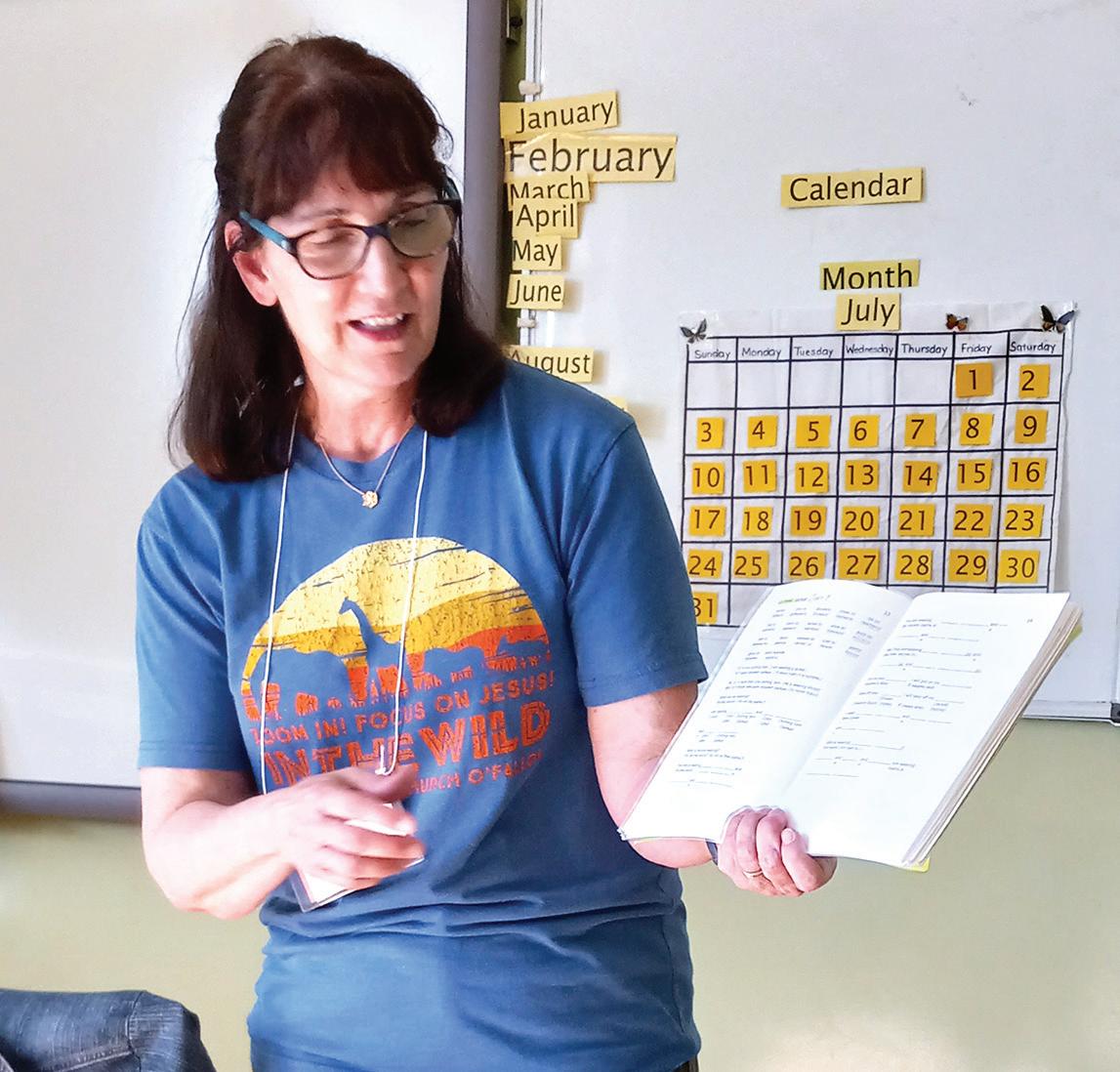
“Things never turn out on a mission trip
said. In this case, the schedule was busier than ever, with classes for Ukrainian refugees in the morning, Polish adults in the evening after work, and a Bible club much like Vacation Bible School for children in the afternoon. “We used to take six months to prepare the team; this time we had eight weeks.”
The Schaefers scouted out the trip a month before their July 15-26 expedition. “Leading mission trips to Siberia gave us an edge,” Donn said, “because we knew how to teach English to people who speak Russian.” The Belleville residents had a proven curriculum that Donn thought would adapt well to other Slavic languages, but the effect of the war was another matter.

“In our little world in Illinois, the war had affected us because it shut off ever seeing the Russian people again,” Joni said. “We had to go through a grieving process.”
This experience helped prepare the couple to embrace refugees. Donn contacted Mark McCor mick, a counselor from Illinois’ Baptist Children’s Home and Family Services, to offer guidance for their new field. “I wanted to make sure we knew how to deal with women and children who were experiencing trauma,” Donn said.
“He said the men should hug the boys, which may sound a little strange,” Joni said, “because their fathers are still back in Ukraine—”
“Or, dead,” Donn interjected.
“So the kids just hang onto you.”
International connections
Back home in Illinois, members of FBC O’Fallon prayed for the team day by day. Using a novel method they used once before, the team created and distributed paper chains with prayer requests, one per day, featuring the team members and their photographs. Each day, one prayer link was removed and that person prayed over.

“We mixed up the links, so everyone was prayed for every day,” Joni said.
The last link included instructions to text the team as they returned home. “We knew the church was praying for us,” Joni said. “We’ve asked people to pray for us before, and they say, ‘OK, we will, but we don’t know what to pray for.’ This way the church has specific prayer requests.”
Commitment to missions, and to mission trips, is characteristic of this congregation. And so is a commitment to Poland. “My first international mission trip was to Poland just before I came to FBC O’Fallon,” Pastor Doug Munton said. “In fact, it was there that God confirmed for me that I was to come to FBCO. That trip was life changing for me as I saw God’s work in the world in a larger way than ever before.”
Munton has served the church 27 years and engaged in multiple mission trips. “It also caused me to desire to see FBCO become deeply involved in missions around the world,” he said. “We have had long term partnerships in Uganda, Cuba and another country.”
READY, SET, TEACH – After ten trips to Russia before the war, Donn and Joni Schaefer (left) organized their first mission to Poland. With them were (continuing l-r) Marilyn Dawson, Patrick Austin, Karen Dunn, David Chumley, Sterling Dare, Zach England, and Melissa Witt-Smith
The connection to Poland extends beyond Munton and this recent mission team.

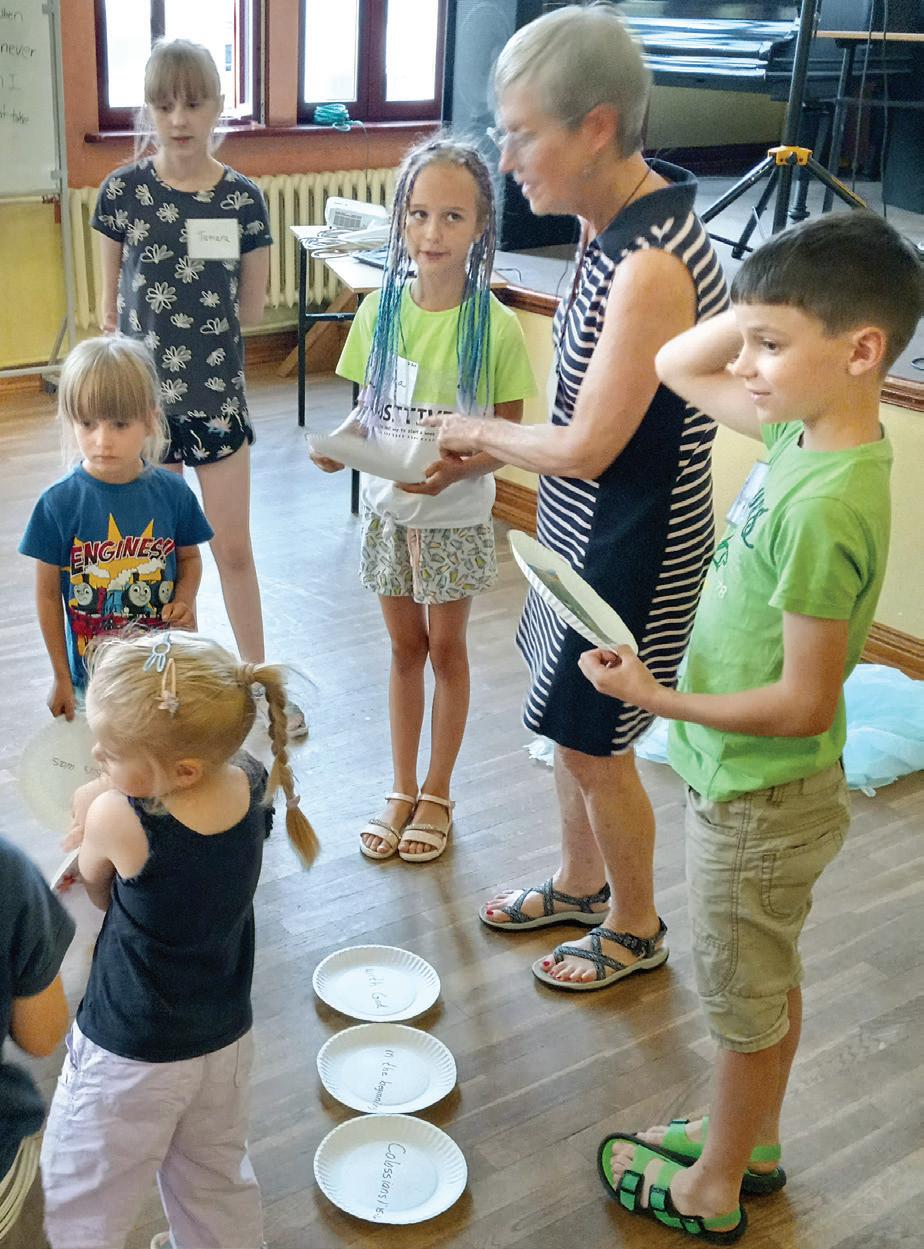

“The IMB missionaries that we worked with in this recent trip to Poland, Chuck and Vikki Franks, have family in our church. They have been to FBCO many times over the years. When it became impossible for us to go back to a particular country, we got connected with the Franks and God opened doors for us to go,” Munton said. “Willingness met need and opportunity.”
The missionaries in Ilawa had wanted to employ English classes as witnessing opportunities for 13 years, Donn said. They reported after the team returned home that they will start a family English class in January. Of their work over a week in central Poland, Donn said, “It looks very chaotic, but it’s amazing to see what happens.”
The three-a-day classes culminated in “Party Day.” In this situation, with both Poles and refugees from Ukraine in their sessions, the team brought them all together. That produced an unusual gospel presentation. Donn shared his testimony in English, which an IMB missionary translated into Polish, and a bi-lingual person from Ukraine translated into their language.
“There is something powerful and life changing about a mission trip,” Munton said. That applies to the people hearing the gospel, the team members, and the church at home.
In addition to the mission team’s work, Joni
credited Send Relief for life-sustaining work among refugees. “Send Relief has been doing amazing things for Ukraine,” she said. The joint venture of the International Mission Board and the North American Mission Board has become a rapid response agent in times of crisis, even abroad.
“One missionary we worked with received an email asking what they needed” soon after the flight of refugees into Poland began, Joni said. He thought it might take months and “a bunch of red tape.” But a 72-word request produced funds in six hours to help refugees immediately with food and housing, and support ongoing work to convert an office complex into living quarters.
“Southern Baptists need to know this,” she said. “The missionaries just can’t say enough good things about Send Relief.”
And for Pastor Munton, “I would love for every IBSA pastor and church to consider a personal connection to international missions. Maybe churches could consider sending their pastor or a team on a trip as well as supporting our career missionaries through prayer and finances.”
That includes Cooperative Program and the Lottie Moon Christmas Offering for International Missions. “It can change how they see evangelism and discipleship both globally and locally,” Munton said.

As it has for the Schaefers and their mission teams who are characteristically humble about their work. As Donn said, “We’re just normal people who go on mission trips.”
PERSONAL CARE – The church prepared special “pampering” kits for Ukrainian women, including all types of personal items. The IMB missionaries in Ilawa passed some along to a Ukrainian pastor. He is starting a church nearby and was holding a special camp for children. “We were glad to share them with him as he hasn’t had a lot of outside help,” the missionary said.

Learning curve recommendaTions
I love Jesus but Hate Christmas
Todd Elliott
This book and his FILO podcast are geared specifically towards church production leadership and spirituality. It tackles the hard questions head on and has changed how I view production and leading others to glorify God. The book is complete with discussion questions at the end of each chapter making it great for personal growth or engaging your team.
– Alex Crain Production Director, Cornerstone, MarionChoose Joy Because Happiness Isn’t Enough
Kay Warren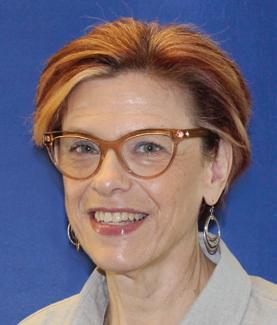

I have read this book twice and it is on my list to read again. Kay defines joy as “the settled assurance that God is in control of all the details of my life, the quiet confidence that ultimately everything is going to be all right...” Kay shares some of her own tough circumstances, but she shows we can choose joy because of the hope we have in Christ. “Our thinking changes first, our actions come next, and our feelings follow.” So many times, we try and do this backwards and rely on our feelings first. This book truly changed my outlook on life.
– Barb Troeger Pastor’s wife, FBC Riverton, IBSA Executive Administrative AssistantCorrection: In our previous issue, Chris Merritt recommended Engaging Generation Z: Raising the Bar in Youth Ministry by Tim McKnight. Chris is Pastor of Business Administration for Tabernacle Baptist Church in Decatur. We accidentally included the wrong photo with his review. Here’s what he really looks like. Thanks for your grace, Chris.
GROWING
table talk
When someone comes out
Pastoring people with sexual identity questions
I’ve had the conversation many times. Sometimes it’s with the person who says, “I think I’m gay.” Sometimes it’s with their friend or their parents. In our culture today, discussions about sexual identity are commonplace. It’s not only in large metropolitan areas. It’s here, it’s more public, and it’s growing among teens and young adults.
For pastors I say the first thing to do is be ready for the conversation. Second, create an environment at your church where it’s OK for people to ask hard questions—for themselves or for someone they love.
For me, the conversation often starts with, “It’s a good thing that this discussion has begun. I understand how unnerving this is for you. But do not hope it will just go away. Do not allow your fear to silence the conversation.”
Parents especially need hope and guidance. They are especially prone to running from the conversation, so I try to bring peace first, then help them become more comfortable talking about their child’s sexuality.
Next, we get clear on the terms being used. I ask, “What do you mean when you say you’ve come to know you (or they) are gay?”
It’s imperative early in the discussion to separate same-sex attraction from homosexual action. Attraction is not sin, but acting on that attraction is. By
saying this, I acknowledge their feelings. I let them know from a pastoral perspective that they are being heard. I am not dismissing their experience, but I am not condoning homosexual activity. Clarification of terms is important because it’s the identity issue that clouds the discussion. When a person says, “I am gay,” they are making a statement of identity. “I was born with same-sex attraction” is profoundly different from “I have no choice but to be true to (act on) my homosexual identity.” Many jump from the first statement to the second, not realizing they’ve skipped several steps. Mistaken identity thrusts them toward becoming a part of the LGBTQ identity and a cultural movement.
More and more, our pastoral staff deals with sexual identity issues. That’s because of the proliferation of the sexuality movement, and because we have made it safe to talk about the hard stuff of life. Guests know it even before they enter the building.
There are two signs beside our front doors. You’ll see the text if you visit our website. In short, one says everyone is welcome here no matter how they describe themselves. The list is funny (soccer moms and NASCAR dads, latte-sippers and nose-pickers) but also very serious (single or married, gay or straight). The other sign says
whatever our spiritual condition on arrival, God loves us too much to leave us that way.
It’s a challenge for pastors to make everyone welcome, but to meet them with biblical truth. A consultant who was working with us on a project commented on the signs. “A lot of churches say it, but you really mean it,” he told me. Then he described a man he saw in our men’s room who was wearing heels and what looked like a woman’s dress.
“Oh, that’s George*,” I said. “He’s one of our regular attenders. We continue to love him and keep having conversations about the clothes he wears. His reasons for wearing a dress keep changing. He usually gets upset when we ask to meet with him. But he listens, adjusts, and keeps coming back. We keep walking with him even though it is often two steps forward and one step back.”
Pastoring through today’s sexuality issues gets complicated fast; it gets sticky. And you can expect it be an ongoing work. If we put up a sign, we have to mean it. We do not affirm sin. We help people follow Jesus, and that includes helping people discover what is broken or distorted.
Our ministry team will pastor a person experiencing same-sex attraction as we would someone who is struggling with anxiety or pornography or any other struggle. I preach on all types of issues we face, and sexuality comes up several times each year. I tell our people, “We will walk with you through anything and for as long as it takes, as long as you genuinely desire to follow Jesus.”
Resources I recommend Holy Sexuality and the Gospel by Christopher Yuan (Multnomah, 2018)
Is God Anti-Gay? by Sam Allberry (Good Book Co., 2013)
“I’m not so sure you ‘grew up in church.’”
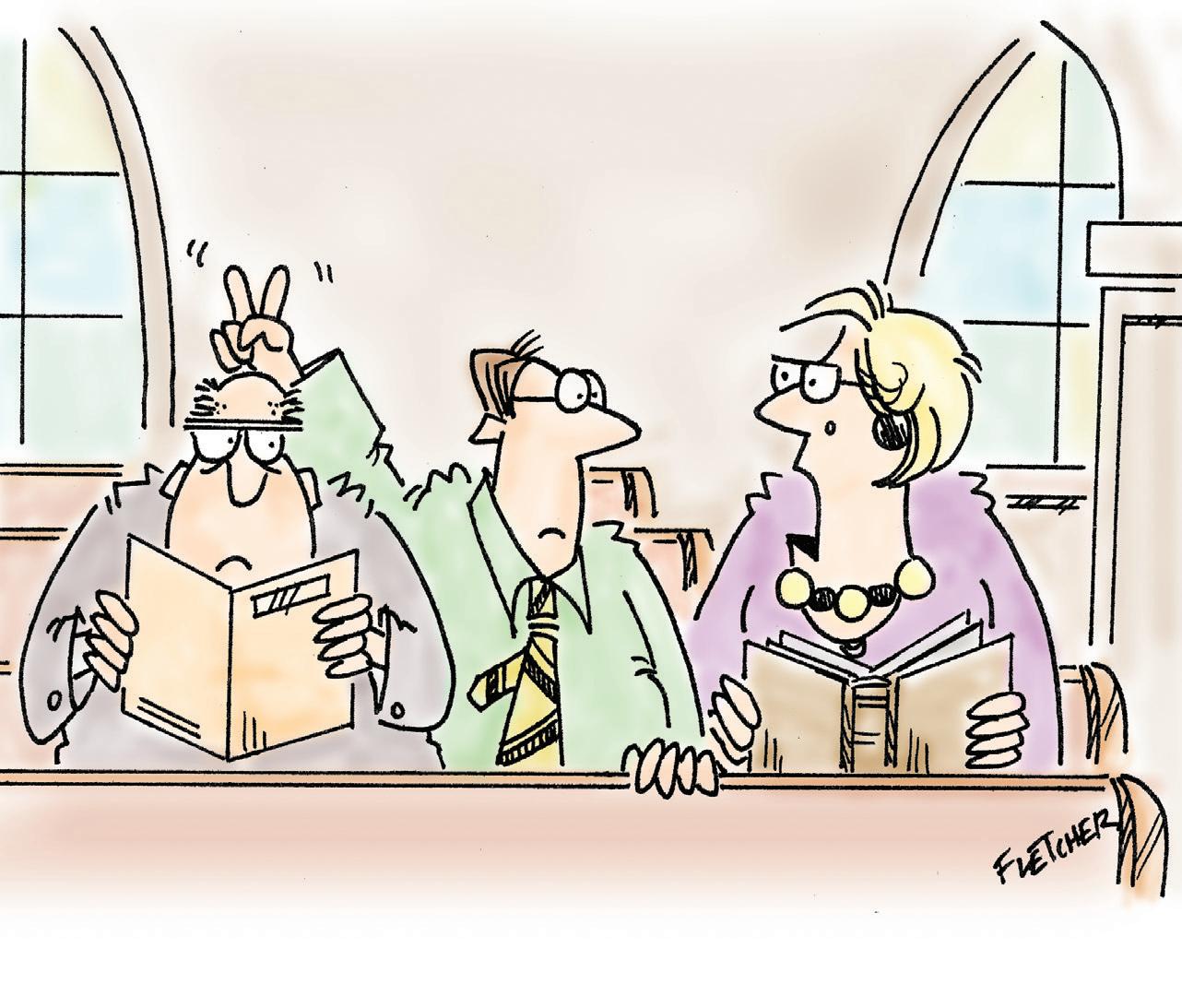
Michael Nave is lead pastor of Cornerstone Church in Marion. He is the elected vice president of IBSA.
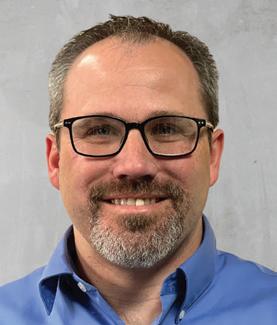
MI: Parents defund library
Voters in a Michigan town turned down taxes to fund the library over objection to explicit LGBTQ content on its shelves. The Patmos library in Jamestown will lose 84% of its budget and may be forced to close. A parents group led opposition to a Pride Month display of gay novels which were accessible to children. The library moved a few books behind the counter, but refused to remove them completely. The director cited First Amendment rights.
MN: Ruling favors pastor
A pharmacist who is also a pastor did not violate a woman’s rights when he refused to fill a prescription for “emergency contraception” because of his religious beliefs. A Minnesota jury sided with George Badeaux of McGregor, but they awarded the woman $25,000 for emotional harm. She had to drive three hours round trip to another drug store to have the prescription filled. The pastor’s attorney said it is unlikely he will be required to pay the penalty because he did not intend to discriminate against the woman.
IN: Help for mothers, babies
Indiana’s governor signed a bill almost completely outlawing abortion Aug. 5, then on the same day signed another bill to help pregnant women and families with young children. The “Hoosier Family First” act sets aside $45 million to ease financial burdens which are often cited as a reason for terminating pregnancies.
“While there is still more to do, better access and awareness of all our programs will be critical to improving our infant and maternal mortality rates,” Gov. Eric Holcomb said. The legislation comes six weeks after the U.S. Supreme Court overturned Roe v. Wade and returned abortion regulation to the states’ discretion.
KS: Pro-life vote fails
Voters turned aside the “Value Them Both” legislation which would have protected unborn babies and their mothers. By about 60%, Kansas voters in the Aug. 2 election did not approve legislation that would have amended the state constitution so that it “does not require government funding of abortion and does not create a right to abortion.” Pro-life supporters who were “hugely disappointed” said opponents turned out in mass, while their side stayed home.
– Excerpted from Christian Post
reporter’s notebook
The waiting game
The clock slows as the Justice Department investigates the SBC
One of Mr. Rogers’s songs comes to mind: “Something to do While We’re Waiting.”
The announcement that the Department of Justice is investigating the Southern Baptist Convention came with no reference to a timetable. It was the SBC Executive Committee that said DOJ had subpoenaed records pertaining to their handling of sexual abuse allegations. DOJ itself would not confirm the report. The few comments from people experienced in such probes said, in effect, we’ll know something when we know something. And not until.
DOJ doesn’t announce its schedule. Speculation is futile. So what shall we do in the meantime?
We will wonder why the federal investigation came at almost the same time as the FBI’s search and seizure mission at former President Donald Trump’s Mar-A-Lago resort in Palm Beach. Some pundits have commented on the coincidence between an Aug. 5 raid at Mar-ALago and an SBC probe announced Aug. 12. We can hope that’s not how the Justice Department operates.
We will wonder whether a federal probe will lead to similar investigations by state attorneys general. One lawyer for abuse survivors quoted in our earlier coverage said federal findings could feed state investigations. In May SNAP (Survivors Network of those Abused by Priests) called on state attorneys general to open investigations of Southern Baptist entities. And a Missouri publication (not connected to the Missouri Baptist Convention) followed suit. So far, there are no reports of state-led investigations.
And we may wonder about the specific nature of the investigation—namely the names. Who is on DOJ’s list? We don’t know. The people mostly involved with the handling of abuse claims and failure to make public a list of offenders that was secretly held are gone from the EC. There’s mostly a new crew operating the SBC’s central business hub in Nashville.
“Follow the money” is a technique sometimes applied in such investigations. While there may be speculation on social media, there has been no indication of a financial cover-up at the denominational level. The only payments we know of were authorized very publicly by messengers for the Guidepost Solutions investigation that the SBC Sexual Abuse Task Force itself contracted. The government investigations of televangelists in the 1980s that involved hush money were for very different actions and in very different organizations.
neTworking
Send NetworkiNg items to IllinoisBaptist@IBSA.org
Crossroads Community Church in Brighton seeks pastor. If you are prayerfully led by God to learn more about Crossroads, Brighton, and this opportunity, email resumé to vbates@brightoncrossroads.org.
Plainville Baptist Church seeks bivocational pastor Send inquiries to Allen Flynn, allen.1968@yahoo.com or call (217) 242-9182.
We will pray for the current SBC leadership. It should be said that Interim EC President and CEO Willie McLaurin stepped in at a very difficult time. With the elected officers and team currently in place, the EC leaders have bravely taken responsibly to right the ship. We can only imagine the pressure they face daily. They need our prayer. So do all SBC entities, mission boards, seminaries, auxiliary, their heads, and the boards of trustees who bear spiritual and legal responsibility for their actions.
We can pray for future leaders. Search teams are at work for the top leadership positions of both the Executive Committee and the Ethics and Religious Liberty Commission. As with any pastor search, this is a spiritual battle. With these selections, the future of our global mission is at stake.
We can pray for restored confidence in the pews. Funding for missions depends on faithful giving by Baptists every Sunday at offering time. After a post-Covid rebound, the Cooperative Program has taken a dip midyear. Whether that was connected to any of the convention politics or previous abuse-handling investigation would be pure speculation. It could be connected to inflation. Whatever the case, our churches can still give in the confidence that SBC offerings fund the spread of the gospel worldwide. Our missionaries still need our support from here at home.
When people ask us specifics about the federal investigation, “no comment” is an insufficient response; it sounds dodgy. “I don’t know” is probably more accurate. The best answer may come from the biographies of W.A. Criswell: “We’ll wait and see what the Lord does.”
And we can pray for a clean bill of health. As former IBSA president and current EC trustee Adron Robinson said, God is a God of righteousness. This investigation may be another way for God to display his righteousness, and for his people to demonstrate their commitment to truth and justice, Christlike ministry to survivors, and careful protection of children and vulnerable adults.
As Pastor Robinson said, we’re not afraid of the truth.
So, what shall we do in the meantime?
“Wait for the Lord; be strong, and let your heart take courage; wait for the Lord!” (Ps. 27:14)
And give DOJ the documents they ask for.
Eric Reed is editor of Illinois Baptist media.
Freedom Baptist Church in Noble seeks bivocational pastor. Salary commensurate with employment hours. Send resumé to Tony Prosser, 2665 E. Calhoun Ln, Olney, IL 62450 or tkprosser88@gmail.com.
New Life Baptist Church of Waverly seeks bivocational pastor. Submit resumé to 341 East Elm, Waverly, IL 62692. Contact Gloria Henning for more information at (217) 414-5849.
Steeleville Baptist Church seeks full-time senior pastor. Learn more at steelevillebaptist.com. Send inquiries 1315 West Shawneetown Trail, Steeleville IL 62288, or steelevillebaptistsearch@gmail.com.
people
David Higgs is the new associate pastor of worship at Lincoln Ave. Baptist Church in Jacksonville. Higgs was the worship pastor at Dorrisville Baptist Church in Harrisburg for the past 15 years. He also served churches in his home state of Mississippi, Texas, and Alabama over 20 years in ministry. Higgs graduated from Delta State University and studied at Southwestern Baptist Theological Seminary. He is married to Connie and they have two adult children.
Kirk Kay became Lead Pastor at Immanuel Baptist, Benton in August. He previously served churches in Texas, Mississippi, and Kentucky. He was a Chaplain in the U. S. Army seven years. Kay holds a B.S. from Mary Hardin-Baylor, an M.Div. from Mid-America, and a D. Min. from Talbot Seminary at Biola. He is married to Brandi and they three children.


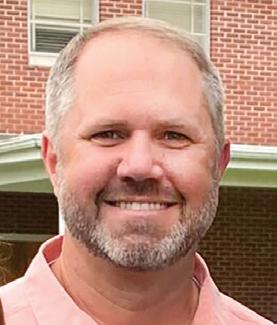
Theodore Siu began as Assistant Pastor at Immanuel Baptist, Chicago July 1. A graduate of Moody Bible Institute, Siu earned his Master of Divinity from Trinity International University as well as a Certificate of Preaching from the Chicago Course on Preaching. Prior to his current position, Theo served at Immanuel as a Pastoral Apprentice and then was ordained as a lay elder in March 2020.

Charles Wilson is the new pastor of FBC Golconda. Originally from West Frankfort, he suffered a medical situation that required brain surgery to repair the injury and save his life twelve years ago. Wilson is ready to take on ministry after that journey, he said. A graduate of Liberty University, Wilson is married to Deborah and a proud parent and grandparent.
SHARE YOUR NEWS. Send us info on the comings and goings, ordinations and promotions at your church. Illinoisbaptist@IBSA.org
with the lord
A Celebration of Life service was held Aug. 10 for former newspaper editor Michael Leathers. He died of a heart attack Aug. 3 at age 61.
Leathers served as editor Illinois Baptist 1999-2002, and was more recently a media and public relations consultant for Memorial Health Systems. He was a native of Mt. Vernon and a graduate of Judson College. Leathers is survived by his wife, Tammy, one son, his mother, and three siblings.

Virginia Mae Harris, 86, died July 13 at her home in Carrollton. She was preceded in death by her husband, Ervin, in 2012. She was a faithful pastor’s wife in their ministry to churches in Illinois, Missouri, and Tennessee across 54 years. She served as a bookkeeper in metro St. Louis for 30 years. At the time of her death, she was a member of Lincoln Ave. Baptist Church in Jacksonville and was active in the ladies’ sewing ministry. Harris is survived by three children, six grandchildren, and six great-grandchildren.

PRE-ORDER VOTER GUIDES!
Voter Guides will be available in late September. You can pre-order them in bulk now so you’ll be the first to get them.
These non-partisan voter guides meet IRS guidelines for churches to distribute. They reveal where candidates stand on a number of issues that are of importance to voters. Order them in any amount to distribute in your church, neighbors and friends.



CONTACT US: v.kathy@illinoisfamily.org or call 708-781-9328 illinoisfamily.org

Churches face legal issues all the time, so they need to be prepared. And when an issue arises, churches need trusted counsel.
With over 24 years of service, at all court levels, Alliance Defending Freedom (ADF) has seen the cultural and legal trends clearly shift against the Church.

We can help your church prepare itself for these changes.
Enter code IBSA20 to receive a reduced annual membership of $200, which is 20% off the regular price.
Equip Training Events
When: 9/13 Mt. Vernon; 9/17 Springfield; 9/20 Plainfield; 9/27 Sterling; 10/4 Clear Creek Assoc.; 10/11 Williamson Assoc.; 10/11 Morton Info: IBSA.org/equiponline
September 9-10
RA Congress for boys
Where: Tabernacle, Decatur
Contact: (217) 877-5653
October 9
Youth Encounter
Where: Tabernacle, Decatur and Cornerstone, Marion
When: 3-9 p.m.
Cost: $35 ea. plus $11 T-shirt Info: IBSA.org/youth-encounter/
October 21-22
Disaster Relief Chaplain Training
Where: Lake Sallateeska Baptist Camp Info: IBSA.org/dr
October 29

Illinois Kids Ministry Conference
Where: IBSA building, Springfield Info: TammyButler@IBSA.org
Nov. 1-2 • IBSA Pastors Conference
Nov. 2-3 • IBSA Annual Meeting
Where: Metro Community Church, Edwardsville Info: IBSAAnnualMeeting.org
November 4-5
AWSOM Conference for teen girls
Where: Tabernacle, Decatur Info: IBSA.org/awsom-conference/
November 7-9
IBSA 2022 Streator Experience (Men’s Winter Bible Study)
Where: Streator Baptist Camp
Cost: $100 per person (includes 2 nights lodging, 6 meals, snacks)
Contact: Ric Worshill at chaplain@shomreem.org or Don Evans at pastordon63@gmail.com Info: Facebook.com/StreatorExperience
My weepy witness BRIGHTER DAY
Iwas horrified at the tears filling my eyes. It was the last day of Vacation Bible School at Chatham Baptist Church and I had stopped on our way out to thank my daughter’s teacher. But what I’d intended as a breezy thank-you turned awkward as I was hit with the full weight of my appreciation for this week and these kind volunteers.
This is not my first rodeo, I thought as I mentally chased back the tears threatening to spill over. I’ve been a part of VBS in one way or another for 30 years. Get it together. I briefly won the battle, but then the tears came back.

Miss Bonnie graciously pretended not to notice, accepted my thanks, and then gave Lucy a big hug before we left. Because her mother is obviously going through some things, I thought as we walked to the car.
Indeed, this wasn’t my first experience with VBS. But it was the first time I’d dropped my children off at 9:00 and picked them up at noon, still singing the songs they’d learned that day. It was the first time our daughters spent a week of mornings dedicated to patient, caring instruction in God’s word; the first time I’d noticed how those mornings can build on one another, resulting into some important conversations at home about God, grace, sin, and salvation.
Trends from nearby and around the world
People: Mental health awareness
Some cite COVID, others say we’re all just more aware these days, but the percentage of pastors who know church members with mental health issues is on the rise.
More than half of pastors (54%) say at least one person in a church they served suffered depression, bipolar disorder, or schizophrenia.
Pastors report:
1-5 people
18% 6-20+ people
Unsure
12%
None
36% 34%
26%
of pastors say they personally have struggled with some type of mental illness.
– Lifeway Research
17%
say their condition was diagnosed.
– Lifeway survey of 1,000 Protestant pastors from 2021, reported August 2022
“The church...has ignored it, pretended it doesn’t exist, or worse, acted as though all mental illness was a result of sin. Our obsession with outward perfection has led us down a dark, dangerous path of contempt toward anything that doesn’t measure up to our false definition of what a ‘good Christian’ should look like.”
MEREDITH FLYNN
With some time for reflection, I’ve realized what I was going through that week was experiencing ministry on the flip side. Most of us have years of experience volunteering at VBS, leading Bible studies, and serving as camp counselors. What we may do less often and less easily is availing ourselves to the ministry of the local church, trusting fellow Christians to serve faithfully and obediently, and leaning into Scripture’s call to live in loving community with each other.
It’s been a few weeks, but I am still a full-fledged VBS evangelist. You should definitely sign up next year, I’ve told practical strangers at the library or the grocery store. I’ve made a mental note to mark the date on our 2023 calendar. And I’m still thinking about how I can engage in ministry from the participant side, for opportunities to listen instead of lead.
I’d also like to be less weepy when I witness churches loving their communities well, but I’m not making any promises.
Meredith Day Flynn is a wife and mother of two living in Springfield. She writes on the intersection of faith, family, and current culture.
–Jessica Thompson, How to Help Your Anxious Teen (2019)
Ministry: How the church can help?
6-in-10 pastors preach on mental health issues at least once a year.
68% keep a list of expert referrals
40% have a family support plan
26% provide encouragement training
26% host Celebrate Recovery
23% seminars on depression/anxiety
20% host community groups
18% have a counselor on staff
– John BunyanIf we have not quiet in our minds, outward comfort will do no more for us than a golden slipper on a gouty foot.
